

A Step-by-Step Guide: How to Start an Online Travel Agency (OTA)
Building a new online travel agency (OTA) can be an exciting and rewarding business venture. While starting an OTA can be an attractive opportunity, it also involves significant challenges and competition.
To succeed in this industry, it’s essential to conduct thorough market research, develop a strong business plan, and focus on providing exceptional customer experiences and unique value propositions. In this article, you will find all the information you need to start an online travel agency.
Boost your travel business with the right technology
You will learn:, state of travel industry in 2024, key travel trends and technologies, customer experience with ai and ar, automation and efficiency in travel business, strategic technology investments, what is an online travel agency (ota), business benefits of starting an online travel agency, key steps to start your online travel agency, difference between an online travel agency, a channel manager and a property management system, what is a travel search engine, a travel booking engine and a metasearch engine, the role of a global distribution network (gds).
- Key statistics on online travel agencies
- Fees and commissions between an online travel agency, a channel manager and a hotel
Latest innovations in the online travel agency industry
How to personalize the booking experience for travelers when running an ota, building a travel application or extending your development team.
🚀 We're here to assist you in accelerating and scaling your business. Send us your inquiry, and we'll schedule a free estimation call .
An online travel agency (OTA) is an online platform that allows users to search, compare, and book travel services such as flights, hotels, car rentals, cruises, and vacation packages. OTAs act as intermediaries between travelers and travel suppliers, such as airlines, hotel chains, and car rental companies.
OTAs offer customers the convenience of planning and booking their trips online, often providing competitive pricing and a wide range of options to choose from. Some well-known examples of OTAs include Booking.com , Expedia, and Agoda.
These platforms typically make money by charging commissions on each booking made through their websites or apps. OTAs have become increasingly popular in the travel industry, as they simplify the booking process for consumers and help travel suppliers reach a broader audience.
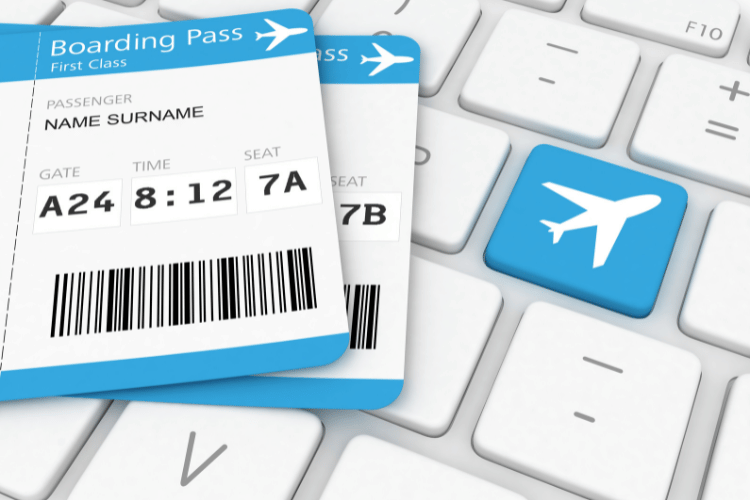
The market of online travel agencies offers several advantages and opportunities:
Growing market
The travel industry has been expanding rapidly in recent years, driven by increasing disposable incomes, globalization, and technological advancements. A new OTA can tap into this growth and cater to the evolving needs of modern travelers.
Niche opportunities
While there are already several large OTAs in the market, there is still ample room for new players focusing on niche markets or offering unique products and services. By targeting specific customer segments or travel experiences, a new OTA can differentiate itself from the competition and build a loyal customer base.
Convenience for customers
OTAs provide a one-stop-shop for travelers, allowing them to search, compare, and book various travel services in a single platform. By starting an OTA, you can offer customers the convenience of planning and booking their trips online, potentially attracting a significant share of the market.
Global audience
Operating an OTA allows you to reach a worldwide audience, expanding your potential customer base and increasing your opportunities for growth.
Flexibility and scalability
An OTA is a largely digital business, making it easier to adapt and scale as the market evolves. You can quickly add new products, services, or partnerships, and expand into new markets or customer segments as needed.

Low overheads
Compared to traditional brick-and-mortar travel agencies, an OTA often has lower overheads, as it doesn’t require physical office space or a large staff. This can result in higher profit margins and increased financial flexibility.
Leverage technology
By starting an OTA, you can take advantage of the latest technology advancements in the travel industry, such as artificial intelligence , machine learning, and big data analytics, to enhance your product offerings, optimize your marketing efforts, and improve customer experience.
Collaboration opportunities
Starting an OTA offers the opportunity to forge strategic partnerships with various travel suppliers, such as airlines, hotels, and tour operators. These collaborations can lead to exclusive deals, improved inventory access, and competitive pricing.
Starting an online travel agency (OTA) can be a rewarding business venture, but it requires careful planning, research, and execution. Here’s a practical guide to help you establish your own OTA:
1. Market research
Conduct thorough market research to understand the current travel trends , competition, and customer preferences in the travel industry. Identify your target audience, their needs, and the niche you want travel company to focus on (e.g., luxury travel, budget travel, adventure travel, etc.).
2. Create a business plan
Develop a comprehensive business plan outlining your goals, target market, competitive analysis, marketing strategy, operational plan, and financial projections. This document will serve as a roadmap for your business and help you secure funding if needed.
3. Legal requirements
Register your travel business, obtain the necessary licenses and permits, and comply with any specific regulations in your region. This may include registering as a travel agent or agency, obtaining insurance, and adhering to consumer protection laws.

4. Establish relationships with suppliers
Build relationships with travel suppliers and businesses such as airlines, hotels, car rental companies, tour operators, and other service providers. You may need to negotiate contracts, commission rates, and access to inventory.
5. Choose a technology platform
Select a suitable technology platform to power your OTA. This may involve purchasing or developing various travel agency software such as a booking engine , custom search engine , hotel inventory management system, travel management solution , integrating with Global Distribution Systems (GDS) or other supplier APIs, and setting up a user-friendly website and mobile app.
6. Design and develop your website and mobile app
Create a visually appealing, easy-to-navigate website and mobile app that showcases your travel agency business plan, products and services. Ensure the platform is mobile-friendly, responsive, and optimized for search engines (SEO).
7. Payment processing
Set up a secure payment processing system to handle online transactions. This may involve partnering with a payment gateway or merchant account provider, and ensuring compliance with Payment Card Industry Data Security Standards (PCI DSS).
8. Marketing and promotion
Develop a comprehensive marketing strategy to promote your OTA and attract customers. This may include search engine marketing (SEM), search engine optimization (SEO), social media marketing, email marketing, content marketing, and public relations efforts.
9. Customer support
Provide excellent customer support to assist travelers with their booking needs, handle inquiries, and resolve any issues. This may involve setting up a dedicated support team, offering multi-channel support (e.g., email, phone, live chat), and providing self-help resources.
10. Monitor and analyze performance
Regularly track and analyze your OTA’s performance using analytics tools and key performance indicators (KPIs). Use this data to identify trends, optimize your marketing efforts, and improve your product offerings.
11. Continuous improvement
Continuously update your travel products, improve your travel website, and mobile app, and refine your marketing strategies based on customer feedback and industry trends.
By following these steps and remaining adaptable to the ever-changing online travel industry here, you can successfully establish and grow your online travel agency.

These travel industry related terms can be confusing. so when discussing how to set up your own OTA, it’s worth looking closely at these terms to understand the differences.
An online travel agency (OTA), channel manager, and property management system (PMS) are distinct components within the online travel business and hospitality industry, each serving a specific purpose:
Online Travel Agency (OTA)
An OTA is a web-based platform that allows customers to search, compare, and book various travel services such as flights, hotels, car rentals, and vacation packages. OTAs act as intermediaries between travelers and travel suppliers, providing a convenient way for consumers to plan and book their trips. Examples of popular OTAs include Expedia, Booking.com , and Agoda.
Channel Manager
A hotel channel manager is a software solution that enables hotels and accommodation providers to manage their room inventory, rates, and availability across multiple distribution channels (including OTAs, metasearch engines , and direct booking platforms) from a single, centralized interface. The primary function of a channel manager is to simplify and streamline the process of updating room information across various channels, reducing the risk of overbooking or double-booking, and ensuring accurate, real-time data synchronization.
Property Management System (PMS)
A PMS is a software application designed to help hoteliers manage the day-to-day operations of their properties. It typically includes functionalities such as reservation management, yield management , guest check-in and check-out, billing and invoicing, housekeeping management, and reporting. A PMS can also integrate with other systems, such as channel managers and point-of-sale (POS) systems, to enable seamless communication between various aspects of hotel operations.
To sum up, an OTA is a platform for travelers to search and book travel services, a channel manager is a tool for managing room inventory and rates across multiple distribution channels, and a PMS is a system for managing daily hotel operations.
These components often work together to provide a comprehensive solution for managing and optimizing a hotel’s online presence, distribution strategy, and operational efficiency.
[Read also: How to Start Real Estate Busines ]

Travel search engine, travel booking engine, and metasearch engine are distinct terms used in the travel industry, each referring to a different type of online platform or tool:
Travel Search Engine
A travel search engine is an online platform that allows users to search for travel-related information, such as flights, hotels, car rentals, and vacation packages. These search engines typically crawl and index travel websites, aggregating relevant data for users to browse and compare. However, they may not offer the ability to make bookings directly on their platform. Instead, they often direct users to the respective travel suppliers’ websites or other booking platforms to complete the reservation process. Examples of travel search engines include Kayak and Skyscanner.
Travel Booking Engine
A travel booking engine is an online platform or software application that enables users to search, compare, and book travel services directly on the platform. It is typically integrated with various travel suppliers’ inventory systems or Global Distribution Systems (GDS) to provide real-time availability and pricing information. Travel booking engines can be found on travel suppliers’ websites (e.g., airline or hotel websites) or on Online Travel Agencies (OTAs) such as Expedia and Booking.com .
Metasearch Engine
A metasearch engine is a specialized type of search engine that aggregates information from multiple travel booking platforms or OTAs, enabling users to compare prices and availability for flights, hotels, and other travel services in one place. Unlike a regular travel search engine, a metasearch engine focuses on collating information specifically from booking platforms and often allows users to book directly through their site or redirects them to the appropriate booking platform to complete their reservation. Examples of travel metasearch engines include Google Flights, Trivago, and TripAdvisor.
Again, let’s recap mentioned terms. A travel search engine helps users find travel-related information by crawling various sources, a travel booking engine facilitates the booking process on a platform, and a metasearch engine aggregates data from multiple booking platforms to enable users to compare prices and availability more easily.

A Global Distribution System (GDS) plays a crucial role in the travel industry as a centralized network that connects travel service providers, such as airlines, hotels, and car rental companies, with travel agencies and consumers. It facilitates real-time inventory management, pricing, and booking of travel services, making the process more efficient and streamlined for all parties involved.
The key roles of a Global Distribution System include:
Inventory management
GDSs store and manage inventory data from various travel service providers, including seat availability on flights, room availability in hotels, and available rental cars. This centralized inventory management enables service providers to update their availability and pricing information in real time, ensuring accurate data for their travel agents, agencies and customers.
Distribution
GDSs act as intermediaries between travel service providers and travel agencies (both online and offline), allowing the agencies to access and book inventory from multiple providers through a single, consolidated platform. This broadens the reach of service providers and simplifies the booking process for travel agencies.
Booking and reservation
GDSs enable travel agencies and consumers to search, compare, and book travel services seamlessly. They provide real-time information on pricing, availability, and booking conditions, allowing users to make informed decisions and complete reservations efficiently.
Marketing and sales
GDSs offer marketing and sales opportunities for travel service providers, as they can promote their services to a vast network of travel agencies and consumers. They can also implement targeted marketing campaigns and offer special deals or promotions to increase their visibility and sales.
Reporting and data analysis
GDSs provide valuable data and insights on booking trends, customer preferences, and market dynamics. This information helps travel service providers and agencies make data-driven decisions to optimize their offerings, pricing strategies, and marketing efforts.
Some of the major Global Distribution Systems in the market include Amadeus, Sabre, and Travelport (Galileo and Worldspan). By connecting travel service providers with travel agencies and consumers, GDSs play an essential role in streamlining the booking process, enhancing the visibility of the host agencies and travel services, and improving the overall efficiency of the travel industry.

Key statistics on Online Travel Agencies
Some key statistics that illustrate the scale and impact of OTAs in the travel industry:
Market size
The global online travel market was valued at around USD 765.34 billion in 2019 and was expected to reach approximately USD 983.39 billion by 2023, according to a report by Statista.
Market share
OTAs account for a significant portion of travel bookings. In the hotel industry, for instance, OTAs were responsible for around 39% of total room bookings in the United States in 2019, as reported by Phocuswright.
Key players
The OTA market is dominated by two major players, Expedia Group (which owns brands such as Expedia, Hotels.com , and Vrbo) and Booking Holdings (which owns brands like Booking.com , Priceline, and Agoda). Combined, these two companies accounted for approximately 70% of the U.S. OTA market share in 2019, according to Phocuswright.
Mobile bookings
Mobile devices have become an increasingly important channel for travel bookings. In 2019, around 38% of OTA bookings were made through mobile devices, as reported by eMarketer. This trend is expected to continue as more consumers adopt smartphones and mobile booking apps.
Growth drivers
Some of the key factors driving the growth of the OTA market include increasing internet penetration, rising disposable incomes, and a growing preference among consumers for online booking platforms due to their convenience, pricing transparency, and extensive range of options.
Customer demographics
Millennials and Gen Z travelers are more likely to use OTAs for travel planning and booking, as they tend to be more tech-savvy and value the convenience, choice, and comparison capabilities offered by these platforms.

Fees and comissions between an online travel agency, a channel manager and a hotel
The fees and commissions in the travel industry are typically split among the involved parties, including online travel agencies (OTAs), channel managers, and hotels. Here’s a general overview of how fees and commissions may be distributed:
Online Travel Agency (OTA) commissions
OTAs earn revenue by charging a commission on each booking made through their platform. The commission rate can vary depending on the OTA, the market, and the negotiated terms between the OTA and the hotel. Generally, OTA commission rates range between 15% and 25% of the total booking value. This commission is paid by the hotel to the OTA for facilitating the booking and providing access to their customer base.
Channel manager fees
Channel managers usually charge a monthly subscription fee or a per-booking fee for their services. The fees can vary depending on the channel manager, the number of channels being managed, and the level of service required. These fees are paid by the hotel directly to the channel manager for providing the software and services necessary to manage their inventory and rates across multiple distribution channels.
Hotel revenue
Hotels earn revenue from the bookings made through OTAs, minus the OTA commission and any channel manager fees. The net revenue for the hotel depends on factors such as their room rates, occupancy levels, and the efficiency of their revenue management strategies.
[Read also: Guide to Hotel Revenue Management: Best Strategies and Tips ]

How to avoid an overbooking as an online travel agency
As an online travel agency (OTA), avoiding overbooking is crucial for ensuring customer satisfaction and maintaining a good reputation.
Here are some strategies to prevent overbooking:
1. Real-time inventory updates
Make sure your platform is integrated with hotels’ property management systems (PMS) or channel managers to receive real-time inventory updates. This ensures that your OTA displays accurate room availability information, minimizing the risk of overbooking.
2. API integration
Establish a robust API connection with hotels’ PMS or channel managers to facilitate seamless data exchange and real-time synchronization of room availability, rates, and other relevant information.
3. Set booking cutoffs
Collaborate with hotels to establish booking cutoffs, such as a certain number of hours before check-in, to minimize the risk of last-minute overbookings that may not be communicated to the hotel in time.
4. Monitor booking trends
Regularly analyze your OTA’s booking data to identify patterns that could lead to overbooking, such as high demand for specific dates or hotel properties. Use this information to adjust inventory allocations and prevent potential overbooking issues.
5. Use a centralized reservation system
Encourage your hotel partners to use a centralized reservation system or a channel manager, which can help manage inventory across all distribution channels more effectively and reduce the risk of overbooking.
5. Overbooking management policies
Develop clear overbooking management policies and procedures in collaboration with your host agency and hotel partners. This may include providing alternative accommodation, compensating the affected guest, or offering incentives for voluntary changes.
By implementing these strategies, you can significantly reduce the risk of overbooking as an OTA and provide a better experience for your customers. It’s essential to continuously monitor your booking processes and maintain strong relationships with your hotel partners to ensure a seamless and efficient booking experience for your customers.

The Online Travel Agency (OTA) industry has experienced several innovations in recent years. These advancements aim to enhance user experiences, streamline processes, and stay competitive in the evolving digital landscape.
Some of the latest innovations in the OTA industry include:
Artificial Intelligence (AI) and Machine Learning
OTAs are leveraging AI and machine learning algorithms to provide personalized travel recommendations, enhance customer service with chatbots, and optimize pricing strategies based on customer behavior and market trends.
Mobile-first strategies
As more travelers use smartphones to research and book trips, OTAs are focusing on mobile-first strategies, developing responsive websites, and user-friendly mobile apps. They also utilize mobile-specific features, such as push notifications, to engage with customers and provide real-time updates on bookings.
Augmented Reality (AR) and Virtual Reality (VR)
OTAs are exploring AR and VR technologies to create immersive experiences for customers, allowing them to virtually explore hotels, attractions, and destinations before booking. This can help users make more informed decisions and enhance the overall booking experience.
Blockchain technology
Some OTAs are exploring the potential of blockchain technology for secure, transparent, and efficient transactions. This technology could enable decentralized booking systems, streamline payment processing, and enhance loyalty programs.
Voice search and booking
With the increasing popularity of voice-activated devices, OTAs are developing voice search and booking capabilities to cater to this growing market segment, making it more convenient for users to search for and book travel services using voice commands.
Sustainable and responsible travel options
As the demand for sustainable and responsible travel options grows, OTAs are integrating eco-friendly accommodations and activities into their platforms, allowing users to make more environmentally conscious choices when planning their trips.
Enhanced customer service
OTAs are utilizing AI-powered chatbots and virtual assistants to provide instant customer support, address common queries, and assist with bookings. This enables OTAs to provide 24/7 support without significantly increasing operational costs.
Dynamic packaging
OTAs are offering dynamic packaging, which allows customers to create customized travel packages by bundling flights, hotels, car rentals, and other services. This approach provides more flexibility and personalization for users and can increase customer satisfaction.
These innovations are continually evolving as new technologies and market trends emerge.
[Read also: Digital transformation in the travel industry ]

Personalizing the booking experience for travelers can lead to increased customer satisfaction, loyalty, and conversions. By implementing these personalization strategies, you can create a more engaging and customized booking experience for travelers, ultimately leading to increased customer satisfaction, loyalty, and conversions:
Data collection and analysis
Collect and analyze data on traveler behavior, preferences, and booking history. This can help you understand their needs, interests, and patterns, enabling you to tailor your offerings accordingly.
Personalized recommendations
Use the collected data to provide personalized travel recommendations, such as hotels, destinations, or activities that align with the traveler’s preferences and interests. Machine learning algorithms can further enhance the accuracy of these recommendations.
Tailored offers and promotions
Send targeted offers and promotions based on the traveler’s booking history, preferences, and search patterns. These could include discounts, upgrades, or special packages that cater to their specific interests.
Customized communication
Personalize your communication with travelers by addressing them by name, acknowledging their previous bookings, and offering relevant content based on their preferences. Ensure that the communication is consistent across all channels, including email, social media, and mobile app notifications.
Allow travelers to create customized travel packages by bundling flights, accommodations, car rentals, and activities based on their preferences. This flexibility can enhance their booking experience and lead to higher customer satisfaction.
Personalized user interface
Personalize the user interface on your website or app to display relevant content, offers, and recommendations based on the traveler’s preferences and browsing history. This can make the booking process more efficient and engaging.
Localization
Adapt your website or app to cater to travelers from different regions by offering language options, displaying local currency, and providing region-specific content and recommendations.
Chatbots and virtual assistants
Implement AI-powered chatbots and virtual assistants to provide instant, personalized support to travelers. These tools can answer frequently asked questions, help with booking processes, and offer recommendations based on the traveler’s preferences.
Post-booking personalization
Continue personalization efforts after the booking is complete by providing tailored pre-trip information, such as destination guides, travel tips, and itinerary suggestions based on the traveler’s interests.
Collect feedback
Encourage travelers to provide feedback on their booking experience and preferences. Use this feedback to further refine your personalization efforts and enhance the booking experience for future travelers.

Final words
Starting an online travel agency can be a challenging but rewarding venture. By following these practical steps and leveraging the latest technology and industry trends, you can create a successful business that offers personalized and convenient travel experiences to your customers.
Remember to prioritize customer service, stay up-to-date with industry developments, and continuously innovate to stay competitive in the ever-evolving digital landscape.
With determination, hard work, and a commitment to excellence, you can turn your dream of starting your own travel business as an online travel agency into a reality.
Related Posts
- How To Build Travel Meta Search Engine: A Step-By-Step Guide
- Key Benefits of Artificial Intelligence For Modern Businesses
- Hotel Booking Engine: Complete Guide + Best Solutions for Hotels in 2023
- Best Travel Management Solutions You Must Know
- Yield Management: What It Is and The Best Strategies
We are Stratoflow, a custom travel software development company . We firmly believe that software craftsmanship, collaboration and effective communication is key in delivering complex software projects. This allows us to build advanced high-performance Java applications capable of processing vast amounts of data in a short time. We also provide our clients with an option to outsource and hire Java developers to extend their teams with experienced professionals. As a result, our Java software development services contribute to our clients’ business growth. We specialize in building bespoke travel solutions like fast search engines, metasearch engines, booking engine services or channel manager integrations.
Testimonials
The developed software product was built from scratch with solid quality. We have had a long-term engagement with Stratoflow for nearly 10 years. We look at them as partners, rather than contractors. I'm impressed by their team culture and cross-team support.
Nathan Pesin
CTO, Legerity Financials
Stratoflow was a great partner, challenging as well as supporting our customer projects for the best outcome. They have a great pool of talent within the business - all very capability technologists, as well as being business-savvy and suitable for consultancy engagements.
Chris Goodall
Managing Consultant, CG Consultancy (UK) Limited
The bespoke metal exchange platform works great, it is easily accessible and richly functional. Stratoflow managed deadlines capably, meticulously documented their progress, and delivered a complex project at an affordable cost.
Bartlomiej Knichnicki
Vice Chairman, Supervisory Board
We are very pleased with our partnership with Stratoflow and, as we continue to grow, we expect to increase the numbers of developers that work with us on our projects. They have proven to be very skilled and flexible. They're extremely reliable, and they have a very good company culture of their own, which gives them a real edge compared to other providers that serve more as production shops rather than thought partners and creative problem solvers.
Andrew Kennedy
Founder & Managing Director, Tier 2 Consulting
Stratoflow successfully customized the system according to the specific functionalities and without bugs reported. The team was commended for their adaptability in the work process and for their responsiveness.
Joshua Blavins
Tech PM, Digital Agency
The features implemented have received overwhelmingly positive feedback from end-users. Stratoflow has an incredible technical expertise and a high degree of flexibility when it comes to changing project requirements.
Chief Technology Officer, Legerity
They have impressively good knowledge of AI issues. Very responsive to any amendments and findings. Very good communication. We received a finished project which could be implemented into production shortly after testing.
CO-Founder & CTO
Circular Fashion Company
They provided superb service with seamless communication and a highly professional, technical approach. The team displays impressive technical expertise and are willing to share information and engage in constructive feedback.
Filip Stachnik
Operations Manager, Otwarte Klatki (part of Anima International)
They're very skilled technically and are also able to see the bigger picture. Stratoflow can actually think about solutions, not just the technical task at hand, which they've been assigned.
Arnd Jan Prause
Chief Operating Officer, musQueteer
Stratoflow delivered the website successfully within the timeframe and budget. They assured that the output met the set requirements. Overall, the team's performance was excellent and recommended for their exceptional technical business expertise. They've been able to deliver all of their work on time and within budget, which has been very impressive.
Lars Andersen
Founder & CEO, My Nametags
Travel sector rebound after the pandemic is complete. We have fantastic global coverage of travel data distribution due to mutual agreements and data exchange between aggregators. Competition for the best price of limited resources degradates margins. How to win? Provide personalized experience and build your own products in the front-office. The missing bits: a traveller golden record collecting past activities and a AI/ML recommendation technology.
Michał Głomba
CEO at Stratoflow

Understanding the Online Travel Agency Business: Partners, Building Blocks, How to Grow
- 10 min read
- 3 Sep, 2020
- 1 Comment Share
Online travel agencies are among the youngest players in the travel market. Since their appearance in the 90s, they flipped travel distribution, became hotels’ biggest enemies , and changed how people research, plan, and buy their trips. And they’re not planning to stop with new startups emerging every year and massive businesses growing even more. Having worked with numerous travel businesses , we can boast that we know a thing or two about building and growing a successful online travel agency. Here we will talk about the ins and outs of the industry, from increasing your inventory to getting the right technology and staying ahead of the competition. But let’s start with the basics.
What is an Online Travel Agency? How OTAs work
An Online Travel Agency or OTA is a website (or app) specializing in selling travel services to customers. There are OTAs that offer hotel rooms, flights, rental cars, vacation homes, tours, or all of those at the same time. They basically are distributors for hotels, airlines, and tour companies that profit by taking a fee for each sale. Here’s how it works.

Airline and hotel distribution network. White lines indicate user interaction and blue lines show the movement of data
OTAs are intermediaries between customers and service providers. Travelers can go directly to the hotel’s or airline’s website but around 44 percent of people go to OTAs to compare prices and see the whole pool of options. OTAs compile their rich inventories by connecting to different partners via APIs - pieces of code facilitating the communication between different software systems. Who are those partners? Hotels . There are different ways for hotels and OTAs to connect: via Extranet , a Channel Manager software , or API connecting with hotels’ Central Reservation Systems . Bed banks or wholesalers . These industry players buy hotel rooms in bulk and sell them to OTAs, travel agents, or even airlines. Here’s more info on the largest bed banks and how OTAs can work with them . Global Distribution Systems (GDSs) . These computer networks dominate travel distribution and store inventories, schedules, and fares for all types of services: from hotels to ferries. Sabre, Amadeus and Travelport are the biggest and just about a necessity if you want to sell flight tickets. You can log into GDS terminals manually or set up an API connection. Airlines via NDC connection . This fairly new way of distribution allows airlines to sell their inventory bypassing GDSs. We previously explained how NDC works in detail, but in short, you’ll need a separate software solution. One more partner allows OTAs to promote their propositions - metasearch engines . Websites like Google Flights or Skyscanner aggregate different flight options. For many OTAs, this is the main source of traffic.

Finding the best mix of providers and distributors to keep the prices low and the markup high is the main task for any OTA and how they essentially make a profit. To support that task, an OTA should work like a well-oiled machine. Let's turn our attention to the main elements that help that machine run.
Online Travel Agency building blocks and technology
OTAs are technology-focused businesses. And they appeal to today’s traveler more than traditional travel agents for this exact reason. Most operations in OTAs are automatic, and there are many systems responsible for that. We will cover three mechanisms running in the background of an OTA: its booking and commission engines, and the back office. If you’re a visual learner, watch a series on YouTube from our Travel Technology Competence leader Andrey Chebotarov where he covers all of that. Starting from the customer’s perspective first, let's talk about booking engines - the heart of an OTA that interacts with users on the front and runs all main OTA tasks in the back.
How a booking engine works
A travel booking engine is a software component that processes bookings automatically. That’s just the tip of the iceberg though. In fact, a booking engine is responsible for all the following functions in an OTA.

A booking engine manages search and booking functions on the OTA website
Search rules . A booking engine can be programmed to show search results in a manner that suits you best using search rules. Search rules dictate what products from what suppliers at what price and to what users to show. That and the pricing rules are crucial elements in creating travel personalization . Pricing rules . Many OTAs practice dynamic pricing , meaning that the prices change depending on current demand, competition, season, suppliers, customer acquisition sources, and more. Pricing rules allow you to always choose the most profitable pricing considering all those factors. Booking and ticketing flow . A booking flow is a set of steps leading customers from search to payment. Each supplier has their own booking flow, and your OTA has to adjust to them all, which is a difficult technical and UX task, managed by a booking engine. Note: OTAs can do ticketing only if they’re accredited by IATA. Read how to get IATA accreditation and what the alternatives are in a separate article. This must’ve given you a good enough idea of how the main OTA process - booking - works. Now, let’s talk about the system that helps OTAs generate profit - a commission engine.
How a commission engine works
A commission rules engine is a software component that automatically calculates commission and accordingly - the final price of the booking.

Watch Andrey’s explanation for a detailed look at commission engines
There are two types of commissions used at OTAs - flat fees and adjustable commissions. Flat rates are common but unhelpful for winning the competition. So OTAs write commission rules depending on different factors, namely: Suppliers . If you got a particularly good rate from a supplier, you can set a lower commission, thus making a sale and keeping the margin high. Dates and destinations . You can set a larger commission ahead of high season or a popular event when you know that the demand will go up. Size of a deal . Customers with complex itineraries who bring more revenue than a regular traveler can get a discount. This is often a small price to pay for someone’s satisfaction and loyalty. Traffic source . A common practice is to cut the commission for users on the metasearch website where you’re fighting with competitors for the lowest price, and vice versa - boosting it up for people coming directly to your website. There are tons of factors and their combinations to include in commission rules. To learn the most successful combinations, OTAs can use analytics and tweak rules accordingly, or even automate the engine to always deliver you the best deals. These were two major systems in an OTA, but we also want to briefly cover a few admin processes happening in the background in an OTA’s back office.
What goes into an OTA’s back office

How main modules of the back office interact with each other and the partners
Booking desk . No OTA is fully automated. Many mid- and small-sized ones still rely on over-the-phone or offline bookings, even if customers come from the website. A booking desk is a tool for travel agents to view all bookings on a centralized platform, create custom travel packages, and book using more sophisticated ways, like accessing GDS terminals by hand. Customer relationships and support . Just like with any eCommerce business, it’s typical for an OTA to have a CRM system to keep information about customers. It’s mostly used for marketing, which is the lion’s share of an OTA’s budget. Customer data allows for understanding your client segments better, targeting them with offers they will be interested in, and building trust and loyalty.

Billing and payment processing . The topic of funds settlement often gets confusing, especially considering that the process is different for hotels and airlines, with many extra players joining in. When working with airlines, OTAs use software from industry regulators IATA or ARC . Hotels are often less complicated, but since you mostly get your inventory from third parties, the process requires some smart management and technical finesse. Ideally, all these functions should be automated to allocate your time and human resources to growing the business rather than supporting it. But realistically, you want to automate at least one system to solve the most repetitive tasks.
How to grow an OTA and maintain a competitive edge
There are tons of OTAs in the world and about 70 percent of the market is shared between the two largest players: Expedia Group and Booking Holdings. Expedia Group owns such brands as Expedia, Orbitz, Travelocity, Trivago, and more. And Booking Holdings covers Booking.com, Priceline, Agoda, and Rentalcars. You can see the market distribution in detail in this handy infographic . Despite a near oligopoly on the market, travel distribution remains a profitable business to start and run. Today, mid- and small-sized companies have all resources to thrive if they know what OTA success consists of. It’s one or a combination of these three things:
- Niche markets/demographics/regions . The more mainstream an OTA is, the less targeted it can be. Expedia and Booking.com can’t be oriented to every single region of the world, or traveler budget, or specific traveler taste. That’s why having done their research right, smaller businesses can find a niche to serve better than the giants do. Look at hostel-specific OTAs, local websites serving smaller European communities, or OTAs with rare connections to Destination Management Companies .
- Unique user experience . Traveler behavior changes all the time, which means that they have new needs and tastes that need to be satisfied. Tons of travel startups today offer interesting solutions to common problems - some offer subscription travel service, others allow monitoring prices or creating a full itinerary with minimum input from a customer. Unique ideas may take some advanced technological support, but it may benefit in the long run.
- Cheap prices . For 60 percent of travelers , the price remains the most important factor when choosing the itinerary, which means that customers choose a better deal over a brand name. Which is why the main competitive advantage your OTA should have is exclusive prices. Exclusive means previously negotiated with the supplier - not just pulled from the search result of a GDS.
We have a guide to building a marketing and pricing strategy for an OTA , but here are some main points.
Develop your partnerships
Even if you have the most advanced booking engine and a group of skilled agents to close the deals, the customers will leave you for OTAs where the price is simply lower. When connecting to bed banks and GDSs, every agency gets the same list of rooms, flights, and prices, so you have to start by negotiating the best rates with your main suppliers. For example, if your niche is family vacations in Greece, you should research airlines that fly there the most and find a wholesaler with the largest inventory of all-inclusive hotels in the Balkans. You get the idea.
Win the competition on metasearch sites

Skyscanner lists several OTAs with different prices for the same flight
Using acquisition analytics . To know what to promote, you need to know what already performs well and what (and why) doesn’t. The conversion rate is your main indicator that visitors chose a better deal over yours. Learn where it happened by looking at acquisition channels. Using metasearch analytics . Metasearch engines sell reports listing information on their search data, number of competitors (called bidders), and stats sorted by tons of different factors. This is an invaluable source of information to help you better target your offers. Understanding your engines . You will use a few metasearch sites to distribute and they’re rarely the same. Look into their demographics the same way you would consider suppliers.
Advertise and use content marketing
OTAs like Expedia use up to 50 percent of their revenue on marketing. They want to appear on your Facebook feed, remind you about your latest searches in emails, and create viral ads. Trivago’s tagline and pushy sales strategy even birthed a few memes . Get smart with your SEO and landing pages, focusing on keywords that your audience uses in their searches. Deliver useful content that will bring traffic and put you higher on the search page. And use Google ads, which are totally effective if you use specific keywords.
A few final pieces of advice
If you know the right formula and keep iterating, you will succeed. But we won’t lie - there are many challenges in this industry that OTAs face. The coronavirus crisis . The future of the travel industry is still unclear and all players are struggling to stay afloat and find new revenue streams . Joining the market right now is dangerous if you don’t have a strategy for working in the current climate. Some businesses, however, have opportunities to grow - smaller OTAs have a chance to offer more localized travel options to address current customer needs. Here's the take on the future of OTAs by our travel tech competence leader, Andrey:

Invisibility . OTAs should be ready to invest a lot in marketing and promotion. And often, there’s no clear way to what suits your business and customers best. This means analytics that will help you understand what works and what doesn’t are a must. Which brings us to the next point. Technology . Digital distribution thrives on technology. The most successful companies are tech giants with complex booking platforms. Smaller businesses succeed when they have either a digital infrastructure that allows them to work more effectively than competitors or unique customer-facing technology that makes travel shopping better. Whichever route you choose, make sure to invest in great custom technology.
- Host Agencies
- Accelerator Course
- Travel Jobs
- Travel Agent Chatter
- Etiquette & Rules
- Privacy Policy
10 Steps to Starting a Travel Agency from Home
If you're thinking of starting a travel agency from home, you're in luck. The cost to become a travel agent is relatively low and there are plenty of opportunities for someone with the passion to sell travel. Not only that, but starting a travel agency from home is becoming the most popular route to become a travel agent .
"Home-based independent advisors continue to dominate the travel agency landscape, accounting for 72% of travel advisors." -Phocuswright
According to Phocuswright's US Travel Agency Landscape 2023 , "Home-based independent advisors continue to dominate the travel agency landscape, accounting for 72% of travel advisors."
Want to throw your hat into the ring and start your own travel agency?
Starting any business is no walk in a park, but it certainly helps if you have someone to advise you and lay out a path. We're here to help support you and answer your questions as you start out on your new entrepreneurial journey!
PS: If you can't answer the question ' what do travel agents do ', let's have you read up on that first before you go all in on starting your own travel agency. 🤗
10 Steps to Starting Your Travel Agency From Home
Here's a summary of the steps to start your travel agency from home. If you've already completed some of the steps, you can click on the link to shortcut which step is best for you!
- Find your travel agency niche: Finding a travel agency niche is a great way to hone in on what about travel you're most passionate about. If you develop a niche, you'll be building your travel agency business on a strong foundation of your strengths, interests, and personal networks. Not only that, it will help you give direction as you start (and grow) your agency!
- Choose your travel agency name: This is often a step advisors struggle with, but don't skip it! Travel vendors need a travel agency name for their records. Make sure you have one ready so you can start selling travel.
- Choose a Travel Agency Business Structure: Most new-to-industry advisors will be choosing between a sole proprietorship or a Limited Liability Corporation (LLC). It's a matter of balancing host requirements (if you go with one), business protections, your agency model, and your budget.
- Create a Travel Agency Business Plan: A travel agency business plan is a document that will help you cat herd all your amazing ideas for your business. It helps you define your mission and goals, helping you think through the process on how to get there. Best yet? We have a free 15-page travel agency business plan template you can use!
- Register Your Travel Agency with the State + Feds : This is a critical step so to legitimize your travel agency. You can register your LLC through the Small Business Administration (SBA) resource to find the steps to get registered with your specific state. This will enable you to do other fun steps like starting a business bank account.
- Get an FEIN : This is optional but recommended, here's why: It's free to get an FEIN, takes just a few minutes and if you move to a business structure that requires an FEIN in the future it will save you a few steps!
- Set Up Your Travel Agency Financials : Separating your business bank account from your personal account is required if you set up an LLC. But frankly, we recommend setting up business financials regardless of your agency model.
- Choose Between a Host Agency, Travel Franchise, or Your Own Accreditation: There are a lot of choices in which direction to go with your travel agency. Do you have your own vendor relationships and want to get your own travel accreditation? Do you want to partner with a host agency under your own brand so you take advantage of their aggregate sales volume? Do you want a turnkey agency option with a franchise? This will help you choose.
- Check Out Host Agency Reviews' Resources Page : Our resources page gives you tips on how to optimize our site to help start your travel agency from home.
- Sign Up for 7 Day Setup Accelerator Course: Within each of these steps, there are many many many other steps to starting a travel agency from home. (Yes, just like nesting dolls.) Our course gives you the tools and knowledge you need to go from the seed of an idea to hanging the shingle out for your travel agency!
- Bonus: Read up on what you can expect in terms of income potential as well as time and financial investment.
I know. It can be totally overwhelming. But if you're starting a travel agency from home, these steps will help prepare you to feel 10,000% (no those extra zeros are NOT typos!) more confident. What are the preliminary steps you need to take when starting a travel agency? Funny you should ask . . .
Here are the steps to take to start your travel agency from home:
1. Find a Travel Agency Niche
A niche is your friend. When you start your home-based travel agency, a niche will help you establish your brand, create your travel agency name, and allow you to focus your energies. Starting a travel agency without a niche is like traveling without a compass (or, let's be honest, a smartphone). Are you going to be focusing on a destination? Maybe you'll be like Andres Zuleta, who specializes in Japan tours:
Or maybe you'll focus on a type of travel, like Deb Fogarty, who specializes in cruising:
Or maybe you're like Will Medina and have a love for destination weddings and honeymoons:
Or maybe you're more attracted to the corporate world and aim to book travel for corporations like Karen Hurlbut:
Whatever your niche, it's the first problem to solve when you're starting your travel agency! We have a free brainstorming exercise to help you find niches that you're passionate about.
2. Choose Your Travel Agency's Name
Vendors will need a travel agency name for their records so have one ready before you start selling travel.
Whether you go with a host agency or choose to go independent, you're going to need a name for our agency. The vendors (hotels, cruise lines, airlines, etc) will need a travel agency name for their records so have one ready before you can start selling travel. Having a niche already picked out can help you as you decide on your travel agency's name .
Starting your travel agency (from home or otherwise) is a lot of work. The last thing you want as your travel agency opens its doors is a letter saying you've infringed on someone else's trademark! We help you through the things you need to consider when choosing a name for your agency. Are their any competitor's with similar names that will make it harder for you to pull up at the top of the search engines? Are the URLs available? Are their any copyrights? Is it too long to neatly fit on marketing materials? We go through this and a whole lot more, so dig in!
3. Choose a Travel Agency Business Structure
You can change your business structure as your needs evolve.
A base step in starting your travel agency from home is deciding on a business structure. There's a lot that goes into what is the best fit for you. Do you have personal assets like a house or car that you want to make sure are protected? How much money do you want to spend?
We help you understand the different business structure options for your new travel agency : Sole proprietor, partnership, LLC, S Corp.
As you're starting your travel agency, you may feel like the low cost of a sole proprietor makes the most sense for you. It's important to know that you can change your business structure as your needs evolve.
As your business grows and you're making more bookings (which exposes you to more liability), you can always move to a structure that gives you more personal liability protection, like the LLC. While it's more expensive, and may not be feasible for everyone as they're starting their travel agency, the protection it offers to your personal assets is incredibly important as your business grows.
And what the heck is an S Corp anyhow? Don't worry, we'll give you the scoop and let you know when that should be a consideration for you.
4. Create Your Travel Agency Business Plan
Next step in starting your travel agency? A business plan!
While a travel agency business plan isn't technically required to start an agency, it is something I highly recommend. I didn't write a business plan when I started this site but I also knew online marketing, SEO, and the travel industry front and back. I also had the industry connections to make it work. Most people starting a travel agency from home either don't have experience in starting a company or they don't have experience in travel. This is where a business plan can help.
What a business plan does for you is it forces you to think through each different area of your business and come up with a plan. Will you stick to that plan 100%? Definitely not. But it gives you something to refer back to and helps you organize your thoughts. Plan to take a chunk of time to work on it as it's not something you want to do willy-nilly.
Not only that, but we made it really easy with our free 15-page travel agency business plan ! All you need to do is download our template and adapt it to your agency.

While I didn't write a business plan for Host Agency Reviews, I did write a VERY detailed travel agency business plan for you. :) It's completely filled out with a fictitious travel agency. That's helpful because you can use some of the data and ideas in there on your travel agency's business plan.
Here's a peek of the business plan. Just to note, this version is not editable! To get the editable version, download the travel agency business plan template (an editable version of the one below).
That was good stuff, right? So let's move on to some more logistics, getting your government paperwork in place.
5. Register Your Travel Agency with the State ... and Feds!
You're doing great!
Starting a travel agency from home isn't as tough as you thought, is it? When you have a road map, it's easier to navigate the start-up process.
Registering with the State
Ok, now that you've:
- nailed down your niche,
- come up with your name,
- and settled on a business structure.
The next step is letting the state government know you've got a company. The Small Business Administration (SBA) website shows how to register your company's name by state . If you are an LLC, the SBA also has a state-by-state guide on how to register your LLC .
A word of warning: When doing a DBA, your business, even though they have different names, are still legally considered the same entity.
Registering your company with the state is an important step because you will need this proof to open a business bank account and other random things (running FB business ads, getting a loan) as your business grows. Do yourself a favor and when those certificates come in, keep them handy in a file for your company's legal documents.
When you start your travel agency, you may have registered it as Margarita Travel. But over time, that might change.
Let's say you fell into becoming the local destination wedding expert that everyone turned to. Margarita Travel works, but you want to have a more romantic name for those clients and different branding. So you create a new brand, Beach Romance , that specializes in destination weddings.
Do you need to let the state know about this new company, even though it's really your same company? Yuppers.
You'll need to file a DBA with the state. DBA is an acronym for "Doing Business As." It's also sometimes referred to as a fictitious name, trade name, or assumed name.
Your DBA is essentially saying, 'My formal company is Margarita Travel, but I also go by Beach Romance.'
To help you get a feel for the pros/cons of a dual-brand, listen to Andrey Zakahrenko's story of how his agency evolved into two brands: (This was our first ever podcast so please forgive the horrible sound quality!)
The one thing to know about DBAs is that they don't create a separate entity. DBAs just allows you to legally operate under different names.
A word of warning: When doing a DBA, your businesses, even though they have different names, are still legally considered the same entity. That means if someone sues Beach Romance for a honeymoon gone wrong, Margarita Travel is also being sued since it's the same company.
Registering with the Financial Crimes enforcement network
And can we talk about the Feds for a moment? They're doing their part to cut down on money laundering. (Score!) And... since money laundering happens through businesses, you're going to have to do a little paperwork with them. (Boo!)
You'll fill out the Beneficial Ownership Information (BOI) form to make sure you're on the up and up. :)
Don't worry, it's not too painful despite the fact the they name of the government org in charge—Financial Crimes Enforcement Network—sounds like they're going to send a SWAT team into your home at any moment.
6. Get an FEIN (Optional, but Recommended)
A Federal Employer Identification Number (FEIN) is like a social security number for your company. It's a number to identify your business and is sometimes referred to as an EIN.
Technically, you do not need an FEIN if you're a sole proprietor or a single-member LLC with no employees since you can use your social security number to file taxes.
However, I personally prefer not to give out my social security number if I don't have to. :) I also like to get my pencils lined up from the get-go.
It's free to get an FEIN and takes just a few minutes. A huge plus in getting one right off the bat when starting a travel agency is that if you move to a business structure that requires an FEIN, you won't have to worry about changing out your SS# for an FEIN on legal documents, bank accounts, etc.
Also, make sure to check in with your tax professional when it's tax filing time—for certain business structures, you may still file under your SS# even though you have an FEIN.
Confusing, I know. That's why you go to the professionals! 😊
7. Set Up Your Travel Agency Financials
Like the FEIN, when you're starting a travel agency, you don't need a separate business bank account or credit card if you're a sole proprietor, but you'll have wished you'd had set one up come tax time!
Separating your personal bank account from the business account from the start makes accounting easier and will help you keep track of business expense write-offs.
Wondering what travel expenses you can write off as a travel advisor ? We've got a resource for that too. :)
Important to note: If you choose a business structure that offers personal liability protection, like an LLC, you need to keep your business and personal money separate. If you are mixing finances and paying personal bills out of your business account, or vice versa, that opens you up to personal liability.
The argument is that, yes, when you started your travel agency you chose an LLC structure, which protects your personal assets. BUT, clearly, the business and the owner are not separate entities because the owner is making business payments out of their personal bank account (or vice versa). And if you're one and the same, then your personal assets are also the business's assets.
There's a lot to consider when it comes to travel agency financials and getting the foundations laid.
Don't worry, we walk you through all things having to do with your travel agency's financials :
- what to consider when choosing your bank,
- the documents you need to have ready for the bank,
- what business credit cards are best,
- the most common software travel agencies use for their bookkeeping, and
- how to find a bookkeeper for your agency

8. Decide if a Host Agency Is Right for You
We mentioned host agencies at the very beginning of the article. And maybe you noticed the name of our site. We're big fans of host agencies for people starting a travel agency . . .but it's not for every agency out there.
That said, our travel advisor research reports continually show that new advisors almost always choose the host agency route.
Your next step is going to take a lot of research. You need to decide if you want to go with a host agency, franchise, or go independent.
Questions you might have:
- How do you know if you should go with a host agency, travel agency franchise , or if you should be independent and get your own accreditation ?
- How do you decide which travel consortium to join if you are independent?
- How do you choose a host agency when there are 200+ listed on the site ?
Don't you worry, little bird, it's easy to feel overwhelmed, but we have answers to all these questions. :)
To start, check out our article, " The Top 10 Benefits of Using a Host Agency . " If you read that and decide a host agency is a good fit for you, you'll move on to our article on choosing a host agency and take a look at our best host agencies of 2024 .
Oh, and we've got a great tool for you to help narrow down your list of host agencies and/or travel franchises in our choosing a host agency article. It's a nifty spreadsheet to help you narrow down your top host agency picks ! 😊
9. Read our Home-Based Travel Agent Resources Page
We put together a page with loads of links so you don't have to scour the web. Here she be, the Home-Based Travel Agent Resources page. 😊
Not only that, connecting with host agencies, travel franchises and consortia couldn't be easier! You can go directly to a host's profile to write them via Host Agency Reviews' Q&A feature. The beauty of this is that tons of agents will also get to learn from your question too!

10. Sign up for HAR's 7 Day Setup Accelerator Course
Phew. That was list was a little overwhelming, wasn't it?
The fact is that there's a lot of groundwork that needs to take place in order to start a travel agency. Wouldn't it be nice if someone with tons of experience who's helped over 10,000 agency get started could walk you through the setup?
We've got an option for that too! It's called our 7 Day Setup Accelerator course .
But don't take our word for it. Hear from some of our students on the value of bite-sized instructional videos, a supportive community, and access to the HAR team:
The course is written and taught by HAR Founder, Steph Lee, and professional Educator, Bridget Lee. It includes nine chapters with 70+ instructional videos, course quizzes, peer accountability, and monthly meet-ups with HAR members and industry experts. Check out HAR's 7DS Accelerator course below!!

As you can see, there are lots of things to do as you start a travel agency from home. But we're here to offer you a TON of resources and support.
So take a deep breath and we'll do it step-by-step together!
Once you start your travel agency from home, you'll have lots of other things that will demand your attention so laying the proper groundwork as soon as you can is smart business.
Starting a Travel Agency from Home: What to Expect Time-Wise
In general, it will take a few years to get your agency off the ground. This is the case with nearly all entrepreneurial endeavors.
Our travel advisor research reports continually show that it typically takes about 3 years to really start generating a sustainable income.
Here's why it can take time to see the cash flow when you starting a travel agency:
- It takes a while to build a client base and develop your brand
- Even when you do make your first bookings, you're not paid commission until after your client completes their travel (or after final payment for some vendors). So, if you make 7 bookings in January but the clients aren't traveling until November, you can see how your first-year money might be tight.
- Travel is something most people only do 1-2 times a year. Even with referrals and repeat clients, it can take a lot longer to build a steady business compared to a new restaurant or other service industries.
Starting a Travel Agency from Home: What to Expect Money-Wise
And money. You probably want to know what you can expect when it comes to money and starting that travel agency from home, huh?! 😊
I hate to admit it but there is no one set answer. It depends on soooo many factors. The good news is that we were so curious to answer this question that we asked a few hundred new travel agents about their income in the first years of starting a travel agency.
Here's some hard data on travel agent income and travel agency start up costs in the first 5 years of business!
Even more travel agent income data
Want to dig into travel agent income data even more? Here's a great reading list that will give you an idea of what you might expect to earn when starting a travel agency:
There's a lot of things to look forward to when it comes to a travel agent career . Check out our (free) annual event, Host Week , to get a flavor of what you can expect once you decide to start a travel agency.
The travel industry opens possibilities of traveling to beautiful places to help you do your job better. You'll get to attend things like FAM trips , ship inspections and go on site inspections. When you sell enough, you'll have access to travel agent rates .
All that said, it's important to understand that you still have to (*ahem*) work if you're a travel advisor- --you just get to have a lot more fun doing it than most people (yay)! :)
Questions? Ask Away.
I grew up in the travel industry and have I've worked with thousands of agents looking to start a travel agency. It's totally my jam. And it's not just my jam.
The entire HAR team is here to help you start (and grow) a successful travel agency. Ask us questions in the comments, drop us a line via email, or reach out to us on social. We love helping bring new people into our amazing industry! 🤗
Editor's Note: This article was originally published in July 2021. We updated this resource and republished it on publish date above.
About the Author

Steph grew up in the travel industry, helping on and off with her mom's homebased travel agency. She has worked with thousands of agents in her role as a former host agency director before leaving in 2012 to start HAR. She's insatiably curious, loves her pups Fennec and Orion, and -- in case you haven't noticed -- is pretty quirky and free-spirited.
If you’re looking for Steph, she leaves a trace where ever she goes! You can find her on Facebook, Instagram, LinkedIn (her fav) and Pinterest as 'iamstephly'. 🙂 You can also catch her on her Substack, Bumblin' Around, where she writes on things outside the world of HAR.

- Resource Downloads
- Travel Agent Basics
Small Business Trends
15 innovative travel business ideas for aspiring entrepreneurs.

As the world finally opens up for business, the beleaguered travel industry is getting its groove back. Not surprisingly, this is attracting a number of small business owners to explore travel business ideas.
What Are Travel Businesses?
Travel businesses primarily revolve around providing diverse services that facilitate and enhance the experience of traveling.
These services can range from arranging lodging accommodations, vehicle rentals for transportation, curated excursions, and immersive activities that allow travelers to deeply engage with the local culture.
While the travel sector primarily focuses on the logistics of transportation and lodging, it deeply intertwines with the broader tourism industry.
Together, they aim to create memorable experiences for tourists, catering to their varied preferences and ensuring a smooth journey from start to finish.
READ MORE: Build A Travel Business You Can Sell With These 5 Tips

Be sure to check out Income Hub’s article, “7 Travel Business Ideas Trending With Low Startup Costs,” after you’re done reading:
The Travel and Hospitality Industry
The unanticipated global pandemic wreaked havoc on the travel and tourism sector. Consequently, and for a prolonged two-year period, businesses worldwide faced unprecedented challenges as international and domestic movements came to an almost complete standstill.
However, there’s renewed optimism that this is the year the industry will make a triumphant comeback. The continued prevalence of flexible working arrangements has given birth to a new category of travelers – those combining work with leisure.
Responding to this change, the travel industry is innovating to integrate work-friendly environments, such as co-working spaces within hotels or resorts.
Furthermore, a significant shift towards sustainable travel is becoming increasingly evident. Today’s travelers are not just satisfied with basic eco-friendly initiatives. They are actively seeking out holistic, sustainable travel experiences.
This encompasses everything from choosing accommodations that practice waste reduction, opting for transportation methods with a smaller carbon footprint, to prioritizing dining options that serve vegan dishes and use locally-sourced ingredients.

Why You Should Consider Starting Your Own Business In Travel

From a commercial standpoint, this is perhaps the best time to start your own business in travel.
Let’s take a look at the factors that make this a lucrative business opportunity.
- Potential to earn more: As traveling regains popularity, there are abundant opportunities to increase your income.
- Choose your domain: Another great thing about starting a travel-related business is you have plenty of options to explore. For example, you may choose to specialize in a domain such as travel photography or travel consulting based on your interest.
- Do without an office: Thanks to digitalization, a number of small travel businesses have gone completely online. This saves these online business owners both time and money.
- Partner with other service providers: As a business owner in this sector, you don’t have to venture out alone. You can easily tie up with other service providers and offer a better deal to your customers.
- Low startup cost: Many small businesses prefer the travel industry because of the low startup cost. Depending on the scale you have in mind, you can keep your business profitable.
READ MORE: Small Business Ideas for Beginners
Our Methodology to Choose the Best Travel Business Ideas
When exploring travel business ideas, it’s crucial to choose concepts that are not only viable in the current travel market but also resonate with the entrepreneur’s interests and capabilities. Here’s the methodology we used to evaluate potential travel business opportunities:
Market Demand and Travel Trends (Rating: 9/10)
Assessing the current and emerging trends in the travel industry was our starting point. We focused on business ideas that cater to popular travel trends, such as eco-tourism, adventure travel, or luxury experiences.
Niche Market Opportunities (Rating: 8/10)
We looked for niches within the travel sector that offer unique opportunities. This includes specialized tour services, niche accommodation options, or catering to specific traveler demographics.
Low Initial Investment and Overhead (Rating: 7/10)
Considering the startup costs and ongoing operational expenses was crucial. We prioritized travel business ideas that require minimal initial investment and have manageable overhead costs.
Flexibility and Lifestyle Fit (Rating: 8/10)
The travel industry often allows for flexibility in terms of operation. We selected ideas that can adapt to the entrepreneur’s lifestyle, whether they seek full-time engagement or part-time involvement.
Profitability and Revenue Streams (Rating: 8/10)
Evaluating the potential for profit and diverse revenue streams was key. We looked for travel business ideas with a clear path to profitability, including opportunities for ancillary services and upselling.
Scalability and Expansion Potential (Rating: 7/10)
The potential for scaling and expanding the business was another important factor. We considered travel business ideas that can grow over time, either through geographical expansion, franchising, or diversifying services.
Personal Passion and Expertise (Rating: 8/10)
Finally, aligning the business with personal interests and expertise in travel is vital. We focused on ideas that match the entrepreneur’s passion for travel, enhancing their dedication and satisfaction.
By applying these criteria, we aimed to identify travel business ideas that not only promise profitability and market relevance but also align with the entrepreneur’s passion for travel and lifestyle preferences.
Popular Travel Business Ideas
Today, the travel business goes beyond setting up an agency. Thanks to customers who continue to look for better options, there are a number of profitable travel business ideas. Let’s explore some of these in detail.
1. Tour Guide Business

This is the ideal business idea if you don’t have the capital to invest in your business – at least not in the initial phase. To succeed, you should have knowledge about the location where you operate. You should also be based in a place that draws enough travelers.
2. Bed and Breakfast Business
If you want to turn your home into a business location, a bed and breakfast is the right option for you. To make it popular with many travelers, you need to offer a truly great experience. This includes having a real passion for hosting different people and making them feel comfortable during their stay.
3. Car Rental Business
Many travelers rely on cars to move around when they travel. For this reason, a car rental is the most obvious choice for many of these travelers. If you have experience with automobiles and their maintenance, this business can work for you.
4. Scooter Rental Business
Many leisure travelers prefer using scooters, especially when the weather is great outdoors. To be able to start this business, you should have at least 3-4 scooters. You should also have in-depth knowledge about scooters.

5. Travel Photography Business
If solopreneurship is your calling, starting a travel photography company is one of the obvious choices. As a travel photographer, you have the flexibility and freedom to travel, take pictures and make money. Moreover, if you’re truly talented, you can make a lot of money through the various stock photography websites.
6. Translation services
Another popular option for those who want to run their business independently is translation services. And this skill will come in handy when you are contending with customers coming from the outside. As such, your ability to converse fluently in more than one language is especially useful when you are in a busy town that sees a lot of travelers.
7. Medical Tourism
In recent years, medical tourism has become widely popular in various parts of the world. In addition to the modern medical sciences, many people are interested in holistic, traditional treatment options. It goes without saying you need to have the right credentials to be able to start this lucrative business.
8. Adventure Trips
Adventure tourism is a niche within the travel industry. Extremely popular with young people, it is a great service-based business. Generally, you will have to gain experience and credentials to start this type of business.
9. Event Planning

Another business model that pays pretty well is corporate event planning. As an event planner, you will be responsible for designing unique corporate events. Be that as it may, this is not a one-person business. You will need a personal assistant and some extra manpower to succeed.
10. Travel Blogging
Making money through their travel blog is a full-time job for a number of travelers. Therefore, if you have the passion to write and document your adventures, you can turn yourself into a social media influencer. Of course, competition on social media platforms is quite fierce, but with good content, you can easily stand out.

More Great Ideas for Traveling Businesses
With several options to choose from, zeroing in on the best travel business idea may seem challenging. The trick is to focus on where your passion truly lies. Let’s explore some more ideas for your business.
11. Coffee Shop
Travelers all over the world need coffee to keep themselves energized. A coffee shop, therefore, is a great idea to attract a client base. Your choice of location will matter greatly when you set up your shop.
12. Glamping Business

Glamping brings glamor to the fun outdoor activity of camping. The idea is to create a sophisticated ambiance for campers. Of course, you need a great location and the right services in place to succeed with this.
13. Kayak Tours
Many adventurous travelers enjoy kayaking. But since bringing a kayak is often not an option for them, they have to rely on local businesses. Fortunately, this is where you can make a difference and make money through adventure sports.
14. Water Taxi Service

Depending on the location, you can offer water taxi services to your customers. This business requires you to make a small capital investment.
15. Travel Agency
Setting up an agency is a great idea if you have the adequate knowledge and manpower to cater to your customer demands. Meanwhile, if you lack the manpower, you can work as an independent operator or partner with a major travel company.
READ MORE: How to Start a Travel Agency

Comparison of Popular Travel Business Ideas
To better assist aspiring entrepreneurs in selecting a suitable travel business venture, we’ve compiled a table that compares various business ideas based on their startup capital requirement and potential profitability:
Technological Adaptations in the Travel Business Landscape
As the travel industry continues to evolve, it is undeniable that technology-driven innovations are at the forefront of this transformation. From the emergence of smart hotels and immersive AR/VR experiences to the convenience of contactless solutions and the precision of AI-powered personalization, travelers are witnessing a revolution that promises a more seamless and efficient journey.
Here’s a closer look at some of these cutting-edge advancements :
- Virtual Reality (VR) and Augmented Reality Tours: While VR provides an immersive experience where users feel like they are in a different location, AR enhances real-world views by overlaying them with digital elements, such as historical information or interactive exhibits. Both these tools allow potential travelers to explore and interact with a location or accommodation before making a booking, offering an enriched pre-travel experience.
- Contactless Technology : Given the hygiene concerns post-pandemic, the adoption of contactless payments, check-ins, and digital room keys has increased, ensuring safety and convenience for travelers.
- AI-Powered Personalization : To enhance customer experience, businesses are increasingly leveraging Artificial Intelligence. AI tools analyze past travel behaviors to recommend tailor-made travel packages, ensuring a more personalized journey for each traveler.
- Environmental Monitoring Tools : With the rising emphasis on sustainable travel, some innovative platforms now offer real-time data on the environmental impact of travel choices. This can cover carbon footprints, energy consumption, and waste production, allowing travelers to make more informed, eco-friendly decisions.
- Mental Well-being Focus : Recognizing the pandemic’s toll on mental health, travel packages often include mindfulness and wellness components. Retreats, yoga sessions, and mental well-being workshops are becoming popular inclusions in travel itineraries.
- Smart Hotels: The concept of “Smart Hotels” encompasses automated room settings, robot-assisted services, integrated mobile apps, energy efficiency systems, and personalized guest experiences, revolutionizing the stay experience for travelers.

How Do You Start Your Own Travel Business?
Launching a travel business begins with a concrete vision and a meticulously detailed business plan. It’s pivotal to understand that while some niches in the travel segment might be lucrative, they may also demand a considerable initial financial outlay.
Thus, potential entrepreneurs should thoroughly evaluate their financial standing and possibly gravitate towards business models that are more budget-friendly, especially if initial capital is a concern.
Beyond finances, it’s crucial to introspect and understand the intrinsic motivations pushing one towards this industry.
Is it a passion for travel, an interest in other cultures, or the thrill of entrepreneurship? Recognizing this driving force can guide the business’s direction and ethos.
Image: Envato Elements

© Copyright 2003 - 2024, Small Business Trends LLC. All rights reserved. "Small Business Trends" is a registered trademark.

BUSINESS STRATEGIES
How to start a travel business
- Rachel Bistricer
Get started by: Creating a website → | Getting a domain →

If you're passionate about providing exceptional travel experiences and managing a range of services, starting a travel business could be an exciting venture for you. This guide will walk you through the steps of initiating and operating a successful travel business, including the advantages and challenges involved in starting a business , how to go about creating a business website and how to generate revenue in the travel industry.
What is a travel business?
A travel business is a service-oriented business that offers a variety of travel-related accommodations, amenities and services to clients. Travel businesses typically provide services such as:
Trip planning and reservations
Transportation services, including flights, car rentals and transfers
Accommodations, such as hotels, resorts and vacation rentals
Tour packages and guided experiences
Travel insurance and assistance services
Why start a travel business?
The travel industry outlook shows healthy growth ahead, with projections estimating it will see a compound annual growth rate of 3.47% globally through 2028 . This points to promising opportunities if you're considering launching a travel business. With travelers spending billions annually on accommodations, transportation, and related services, the travel sector drives substantial revenue. And as people increasingly seek personalized, one-of-a-kind travel experiences tailored to their preferences, demand is rising for travel companies that can deliver on this. By understanding what today's travelers are looking for and offering customized services that help create meaningful trips and memories, you can position a new travel business for success amid the industry's continued expansion. Tracking trends and honing in on underserved niches can help you capitalize on the sector's upward trajectory.
How to start a travel business in 7 steps
Decide on a travel business niche
Create a business plan
Select a business structure
Obtain business financing or capital
Set up accounting and bookkeeping services
Source specific travel equipment
Register your travel business
01. Decide on a travel business niche
By focusing on a specific market segment, such as adventure travel, family-oriented vacations, luxury travel, wellness retreats or sustainable tourism, you can craft tailored offerings that cater to the unique preferences of travelers within that niche. Specializing allows you to differentiate your services, position yourself as an expert in the chosen area and effectively target people seeking those particular travel experiences.
02. Create a business plan
Develop a comprehensive business plan that covers key aspects of your business planning
including identifying your target market, summarizing your executive strategy, implementing a marketing strategy and projecting your financials. This plan serves as a roadmap for your business and aids in conveying your vision to potential investors when seeking funding. It should also include other important business information such as the type of business you plan to start and your choice of a business name .
Here’s a travel business plan template to get you started:
Travel business plan template
Executive Summary
Business Name: [Your Travel Business Name]
Business Structure: [Sole Proprietorship/Partnership/LLC/Corporation]
Location: [City, State]
Founding Date: [Month, Year]
Founders/Owners: [Names]
Mission Statement: [Concise statement of the business’s purpose]
Business Description
Overview: Briefly describe your travel business, including key features, services and amenities.
Unique Selling Proposition (USP): Clearly define what sets your travel business apart from competitors.
Target Market: Identify your primary customer demographic and market segment.
Services and Amenities
List and describe the travel services and amenities your business will offer.
Include trip planning, transportation, accommodations, tour packages, etc.
Market Analysis
Industry Overview: Provide an overview of the travel industry, including trends and growth projections.
Competitor Analysis: Identify key competitors and analyze their strengths and weaknesses.
Target Audience: Define your target customer profile and their preferences.
Marketing and Sales Strategy
Marketing Plan: Outline your strategies for promoting the travel business, including online and offline channels.
Pricing Strategy: Detail your pricing structure and any promotional pricing.
Sales Tactics: Describe how you will attract clients and increase bookings.
Operational Plan
Location and Facilities: Describe the physical location and facilities of your travel business.
Suppliers: List and describe key suppliers for travel-related services.
Staffing: Outline your staffing plan, including roles and responsibilities.
Financial Plan
Startup Costs: Detail initial investment requirements and startup expenses.
Revenue Projections: Provide realistic revenue projections for the first 3-5 years.
Operating Costs: Outline ongoing operating expenses, including marketing, staff salaries and technology.
Funding Proposal
Purpose of Funding: Clearly state how the funds will be utilized.
Amount Needed: Specify the amount of funding required.
Repayment Plan: Outline the proposed repayment plan for loans or investments.
Risk Analysis
Identify potential risks and challenges that may impact the success of your travel business.
Develop strategies to mitigate and manage these risks.
Include any additional documents or information relevant to your business plan.
Examples: Market research data, resumes of key team members, mock-ups of marketing materials.
Summarize the key points of your business plan and highlight the potential success of your travel business.
Conclude with a call to action or next steps.
Note: This template serves as a general guide. Adjust and expand sections based on your specific business model and goals.
03. Select a business structure
When starting your travel business, consider the business entity or structure that makes the most aligns with your business goals. Common options like sole proprietorship , partnership , limited liability company (LLC ) or a corporation each have their own pros and cons.
Learn more: How to start an LLC
04. Obtain business financing or capital
Starting a travel business involves substantial initial costs. You’ll need to secure considerable financing through methods like bank loans, grants, or investments from stakeholders to launch and sustain your business.
Costs that you’ll need to factor in when securing financing for your business include:
Making a website and its maintenance
Marketing and advertising campaigns
Trip planning software and tools
Reservation systems and travel management software
Staff recruitment and training
Initial salaries and benefits for employees
Transportation services (e.g., vehicle fleet or partnerships with transportation providers)
Technology infrastructure (computers, servers, etc)
Licensing and permits for operating a travel business
Insurance coverage for travel-related risks
Office space and utilities
Professional services (legal, accounting, etc)
05. Set up accounting and bookkeeping systems
Establish robust accounting and bookkeeping systems from the outset to track income, expenses and ensure financial viability. This includes managing corporate tax obligations if applicable.
06. Source specific travel equipment
Acquire the necessary equipment for your travel business, ranging from technology infrastructure to reservation systems and transportation vehicles. Some more specific examples of this include:
Reservation management software
Transportation vehicles (if providing transportation services)
Communication systems (phones, email, etc.)
Office furniture and supplies
Technology infrastructure (computers, servers, etc.)
07. Register your travel business
Register your travel business in compliance with local regulations, obtain the required licenses and secure appropriate insurance coverage.
Learn more: How to register a business , How to get a business license
Tips for managing your travel business for profitability:
Once you’ve got your travel business off the ground, you’ll need to understand how to properly run and manage it in order to make sure it’s profitable. Here are some general tips on how to achieve that:
Research your industry
Gain a deep understanding of the travel industry, including market competition, target demographics and financial requirements. If you lack experience in the travel industry, consider working for an established travel agency or volunteering at a local tourism office to acquire valuable insights and experience.
Develop a marketing strategy
Craft a well-defined marketing strategy from the beginning to proactively promote your travel business. Having a user-friendly and informative travel website is essential for attracting clients and showcasing your services. You might also consider starting a travel blog - check out these travel blog names for inspiration.
Invest in customer service for your travel business
Exceptional customer service is crucial for success in the travel industry. Ensure a positive experience for clients from trip planning to their return home. Address customer inquiries promptly and professionally. To ensure your customers have a memorable trip, make yourself a reliable travel business by going beyond just booking flights and hotels. Offer assistance with every aspect of their journey, from navigating lost luggage to providing travel insurance advice. Be the dependable support they need while traveling, like having a 24/7 concierge service at their disposal.
Build partnerships for business operations
To enhance the growth of your travel business, consider establishing key partnerships with airlines, hotels, tour operators and industry stakeholders. These collaborations open doors to exclusive deals, expanding your service offerings for clients. Benefit from preferential rates, premium accommodations and tailored travel packages, enhancing the value you provide. Attend networking and industry events to connect with seasoned professionals and gain valuable insights. By fostering these partnerships and staying up to date with industry trends, you can position your travel business as an authoritative and trustworthy source for people looking to travel.
Travel businesses to inspire (all built on Wix)
The lucky traveler.
Travel expert specializing in planning All-inclusive Vacations, Comprehensive Trip Planning, Points and Miles Consultation and Destination Weddings.
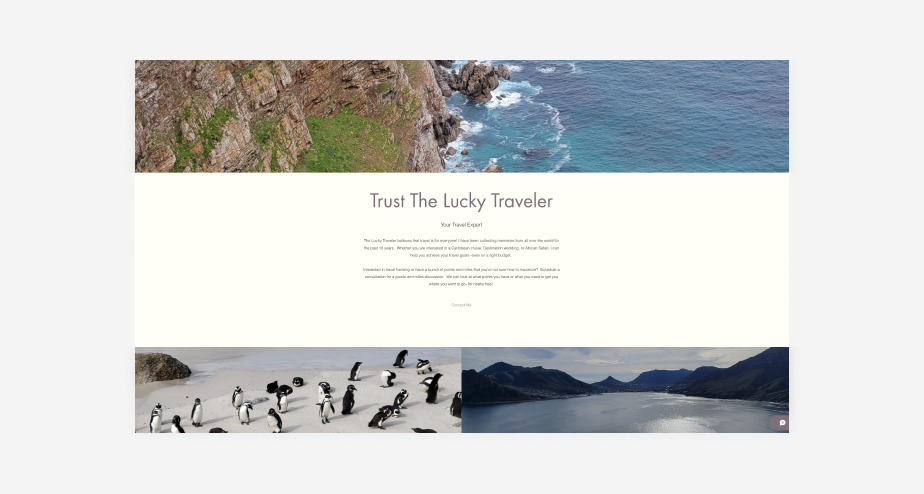
A full service travel agency with experience in planning "bucket list" vacations and navigating the travel industry.
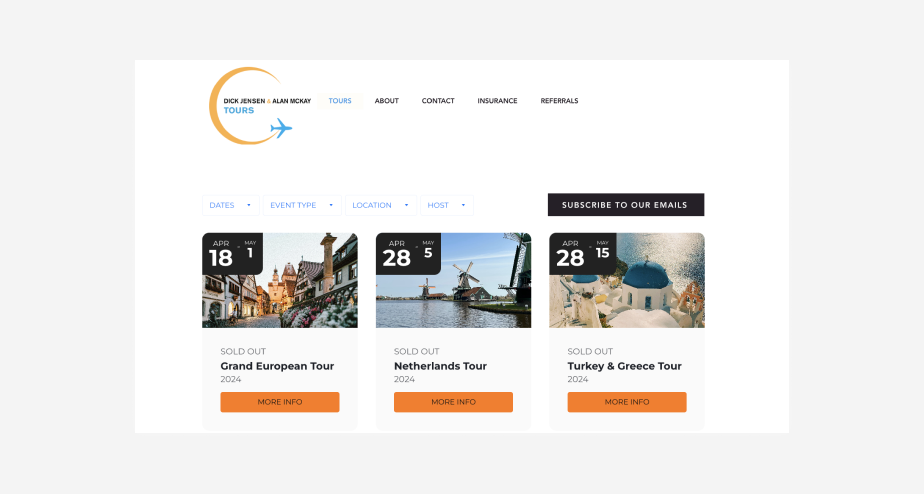
Worldwide Fun4All travel
Travel agent focusing on planning tailoring trips to clients needs and interests.

Benefits of starting a travel business:
Operating a travel business allows you to be your own boss, set your own hours and make independent decisions. The demand for travel services is consistently high, particularly in areas with a substantial tourist presence. For business owners who enjoy creating memorable experiences for clients, a travel business can be rewarding on many levels.
Challenges of running a travel business:
Running a travel business requires diverse skills in areas such as trip planning, customer service and operational management. Coordinating travel arrangements, managing client expectations and ensuring timely service delivery can be challenging. Utilizing online booking systems and scheduling software is crucial for managing these aspects effectively. Additionally, the travel industry is competitive, requiring a unique value proposition and effective marketing to stand out.
How profitable is a travel business?
The profitability of a travel business depends on factors such as location, market demand, competition, pricing strategies and operational efficiency. Providing unique and personalized travel experiences can contribute to higher profitability. Streamlining business processes, utilizing technology and building strong client relationships are key factors in achieving success in the travel industry.
Other business ideas you might be interested in
How to start an industrial design business
How to start a freelance business
How to start an art business
How to start a construction business
How to start a car detailing business
How to start a DJ business
How to start a dog walking business
How to start a catering business
How to start a real estate business
How to start a lawn care business
How to start a food truck business
How to start a landscaping business
How to start a pressure washing business
How to start a cleaning business
How to start a tutoring business
How to start a coaching business
How to start a pool cleaning business
How to start a food business
How to start a painting business
How to start a restaurant business
How to start a baking business
How to start a handyman business
How to start a marketing business
How to start a nail business
How to start a trucking business
How to start a rental property business
How to start a farming business
How to start a homecare business
How to start a flower business
How to start a car wash business
How to start a gaming business
How to start a sports card business
How to start a frozen food business
How to start a courier business
How to start a laundromat business
How to start a wedding business
Related Posts
How to start a travel blog in 2024
Creative travel business names: your passport to inspiration
How to make money as a travel agent in 13 unique ways
Was this article helpful?
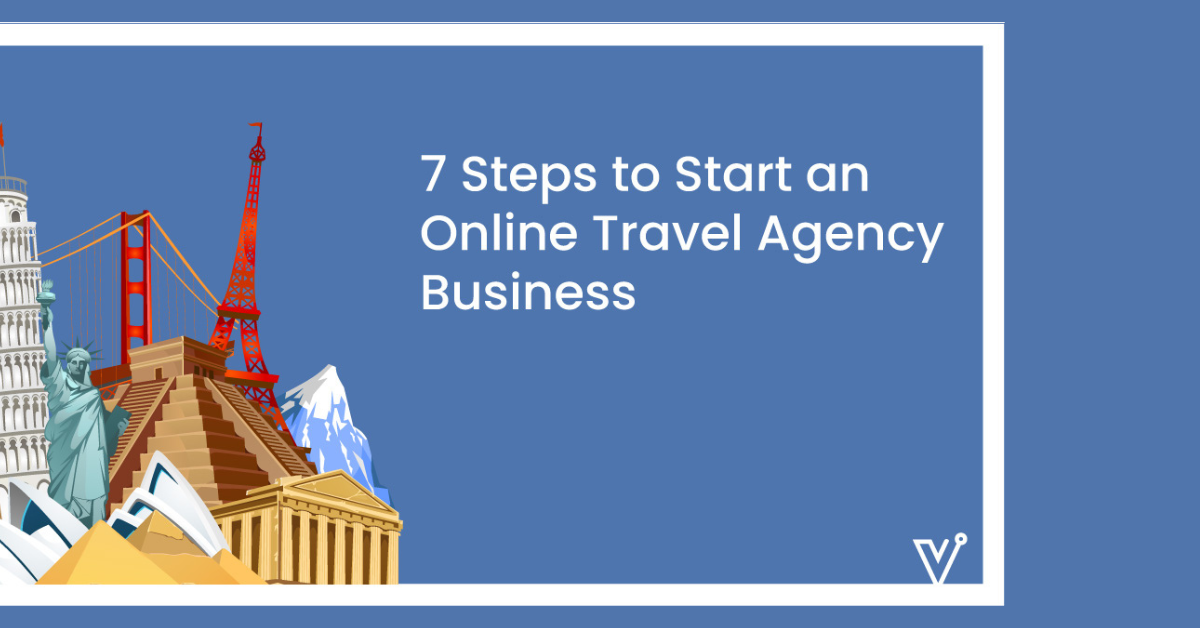
7 Steps to Start an Online Travel Agency Business
We live in the startup era, where budding entrepreneurs are passionate about turning their dream project into a lucrative business. Launching a travel agency business can be equally rewarding and intimidating in this booming entrepreneurial era. According to a study, 71% of businesses fail within 10 years of their operation. Turning your business idea into a travel company and getting it off the ground might seem challenging. But it would be best to start with proper planning, make appropriate financial and legal decisions, and much more to keep it operational.
Online travel agencies or OTAs are the most dominant players in the travel market, with a share of $561 billion in 2021. OTAs are one-stop-shop to search and book everything from flights and accommodations to excursions, making it hassle-free for travelers to book for their upcoming trips. A new research by Statista predicts that by 2025, the OTA market is expected to reach $833.5 billion.
7 Steps to Start an Online Travel Agency Business
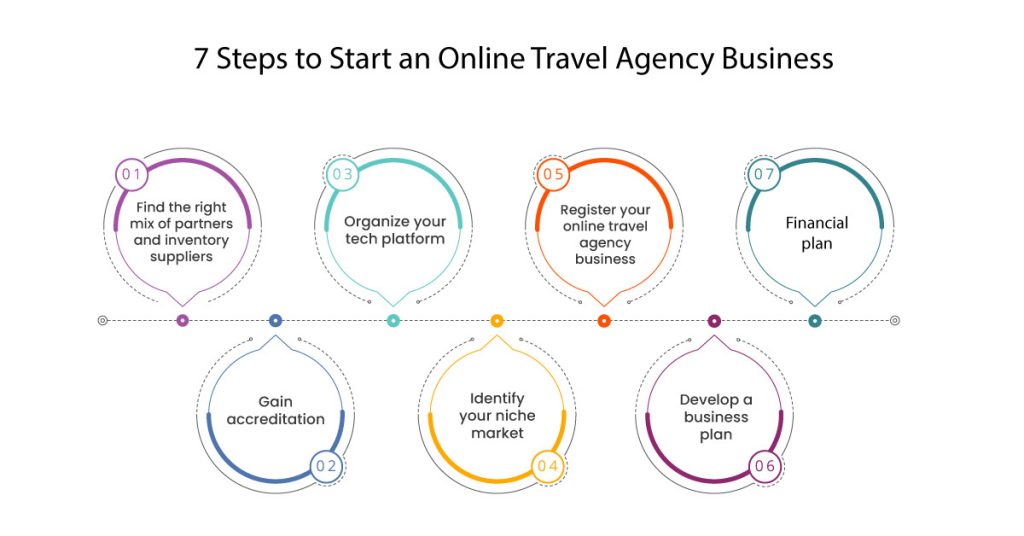
Owning an OTA business in 2022 is lucrative as 81% of travelers heavily rely on OTAs to search and book for their upcoming trips. Let’s now dive into the top 7 steps that you need to take to start your travel agency business. This post can be a blueprint for launching your online travel agency.
1. Develop a Business Plan
Your online travel agency business plan will be a roadmap for establishing your idea. The document will showcase every aspect of your business- company goals, vision, business strategy, financial plan, products or services, your target audience, marketing strategy and strategic partners: These can be suppliers and tech as well. Developing a business plan will keep you on track with your vision. Also, to stay competitive in the constantly evolving travel market, you need to revise your business plan constantly.
2. Identify your Niche Market
Since the travel industry is highly dynamic and competitive, you need to identify and choose which travel market do you want to target. Start with market research to understand your potential customer needs. In this step, you must focus on:
- Target audience travel behavior and preference
- Types of travel products such as hotels, flights, excursions, cruises, etc. to sell
- Finding niche travel markets
Why is it essential to find your niche to start an OTA business?
Well, the competition is fierce with brands like Booking.com, Tripadvisor, Kayak, Expedia, and much more. You need to stand out and compete efficiently in the travel market. And this can be possible by being an expert in your niche and answering every trip-related question the modern traveler asks.
According to a research some of the booming travel niches that your business can dive into are:
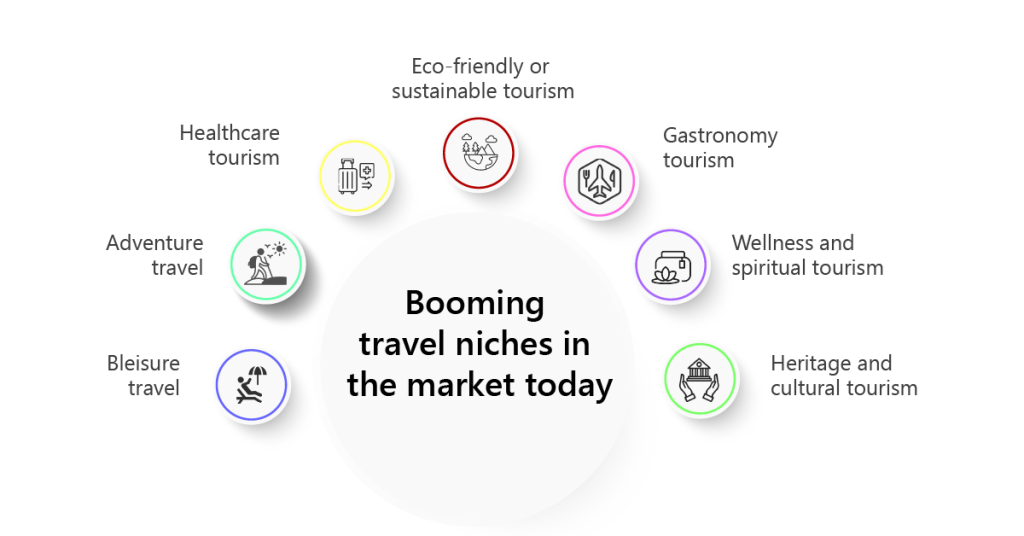
- Adventure travel
- Healthcare tourism
- Eco-friendly or sustainable tourism
- Gastronomy tourism
- Wellness and spiritual tourism
- Heritage and cultural tourism
Recommended: Five Ways World Travel And Tourism Industry Digitalizing Journeys
3. Find the Right Mix of Partners and Inventory Suppliers
The next step is to develop fortifying partnerships that can help your business grow. During the early stage of your startup, you need to work with multiple suppliers or providers to sell your travel products and make money through commissions.
Let’s say your niche is heritage and cultural tourism in Italy. To sell your travel products and grow effectively, you must connect with a wholesaler with the largest hotel inventory, airlines, and other travel services. Talk to various providers, suppliers, compare their prices, services, and the commissions you might earn and then decide on the partnership.
4. Organize your Tech Platform
With a business plan, niche and partners in place, it’s time to build a technology platform. Focus on these five main tech platforms:
- Search engine for customers to book
- Booking engine for automation of OTA workflow
- Back office for business operations
- Commission engine
- Recommendation engine to enhance customer experience
It is difficult to work independently, and that’s why it’s ideal to integrate booking engine and other third-party APIs (flight search, hotel booking by suppliers, NDC, hotel mapping , car rental booking, payment gateways, CRMs) to your website for a hassle-free user experience.
5. Register your Online Travel Agency Business
This is a crucial part of your business. With major tasks off your plate, it’s time to make your travel business legal by registering with the government.
Here is the checklist to do so:
- Choose your business name
- Apply for licenses and permits as per your local laws
- Apply for business insurance
Invest in accounting software
6. gain accreditation.
Accreditation will make your travel agency business credible. Obtain accreditation from IATA, ARC or any other reputed travel organization, contracts from GDS . This accreditation will review your industry experience, finances and even provide training and support to flourish successfully.
Recommended: How Can IATA Travel Pass Help Countries Reopen Borders?
7. Financial Plan
To successfully start your online travel business, you will need sufficient capital.
There are different ways of funding capital. Some of them are:
- Personal savings
- Credit cards
- Money from family and friends
- Venture capital
- Angel investors
- Crowdfunding
- Small business loans and grants
A combination of these funding sources can help you get off the ground. To secure this capital, you need to have a financial plan of how much money you need to raise and how your business will make a profit.
You are now set to take off your online travel agency business with these essential steps. It can be daunting initially, and your startup might have roadblocks, but stay dedicated and remember these steps to start and grow your new business seamlessly.
About Vervotech:
Vervotech is a leading Hotel Mapping and Room Mapping API that leverages the power of AI and ML to quickly and accurately identify each property listing through the verification of multiple parameters. With one of the industry’s best coverage of 98% and an accuracy of 99.999%, Vervotech is quickly becoming the mapping software of choice for all leading global companies operating in the travel and hospitality industry. To learn more about Vervotech and the ways it can enhance your business in the long run contact us: [email protected]
Previous Post What are hotel search patterns? And how can you optimize them to users’ intent?
Next post experiential travel: the concept, the market, and insights on starting the segment, related posts.

How online travel businesses can boost conversions by optimizing search output

For Sales Enquiry
- For US/Canada: 1 (833) 451-5836
- For Other Countries: +91 9923592502
- [email protected]
- Hotel Mapping
- Room Mapping
- Hotel Curated Content
- Wall of Love
- Press & Media
- Tech Partner
- Supplier Partner
- Walkthrough Videos
- Documentation
- Case Studies
- Infographics
Privacy Policy
Copyright © 2024 Vervotech Solutions Pvt. Ltd.
- Free Sample Data
- Brand Mapping
- Extranet Mapping
- Sync History
- Leadership Team
- Growth Story
- How We Innovate
- Values & Life at Vervotech
- Help Center
- Client Portal
- Provider Portal
- Contact Sales
Vervotech Affiliate Partner Application Form
Which Vervotech product(s) do you want to promote? Please select all that apply. Hotel Mapping Room Mapping Hotel Curated Content
What will you need to be successful partner? (for example: image assets, product training, brand guidelines, etc.)
I accept the
terms & conditions
REFERRAL PARTNER AGREEMENT
THIS REFERRAL FORM EXECUTED BY REFERRAL PARTNER WITH COMPANY AND BETWEEN VERVOTECH SOLUTIONS PRIVATE LIMITED, HAVING ITS REGISTERED OFFICE AT FIRST FLOOR, FLAT NO. 101, E BUILDING, RICH WOODS, PLOT NO. 150, SECTOR 11, PCNTDA, CHIKHALI, PIMPRI CHINCHWAD, PUNE, MAHARASHTRA, 411019, IN, (“THE COMPANY”) AND YOU AS AN INDIVIDUAL REFERRAL PARTNER OR ANY SOLE PROPREITOR, PARTNERSHIP, LIMITED LIABILITY PARTNERSHIP, PRIVATE LIMITED COMPANY OR PUBLIC LIMITED COMPANY OR ANY OTHER BUSINESS ENTITY EXECUTING THE REFERRAL FORM (“THE REFERRAL PARTNER”) IS GOVERNED UNDER THE TERMS OF THIS REFERRAL PARTNER AGREEMENT (“AGREEMENT”). PLEASE READ THIS AGREEMENT CAREFULLY. BY CLICKING “ACCEPTED AND AGREED TO” REFERRAL PARTNER AGREES TO THE AGREEMENT APPLICABLE TO THE REFERRAL FORM.
REFERRAL PARTNER ACKNOWLEDGES THAT IT HAS READ THIS AGREEMENT, UNDERSTANDS IT, AND AGREES TO BE BOUND BY ITS TERMS, AND IF THE REFERRAL PARTNER IS A PERSON WHO IS SIGNING ON ITS BEHALF HAS BEEN AUTHORIZED TO DO SO AND THE COMPANY DOES NOT HAVE ANY LIABILITY TOWARDS VERIFYING THE AUTHORITY OF THE PERSON WHO HAS SIGNED THE AGREEMENT ON BEHALF OF THE REFERRAL PARTNER.
APPOINTMENT REFERRALS
Appointment. Company hereby appoints Referral Partner, and Referral Partner hereby accepts such appointment, as Company’s non-exclusive referral partner for the marketing and promotion of Services and the referral of leads for the sale of Services, as further set forth in this Agreement.
Scope of Authority Referral Partner's sole authority shall be to (a) market and promote Services as set forth in this Agreement, and (b) provide sales leads to Company for Company to contact in its sole discretion. The Parties agree that Company will directly enter into agreements with customers for the provision of Services to such customers.
DUTIES AND RESPONSIBILITIES OF THE REFERRAL PARTNER
Prior to undertaking any solicitation efforts of a prospective customer or client ("Prospect”) relating to the services or products or offerings of the Company as set out at https://vervotech.com/vervotech-affiliate-program ("Services”), Referral Partner shall submit a referral form, in a format shared by the Company ("Referral Form”), for written approval of the Company. The Referral Partner agrees to provide the necessary information, data and materials as may be requested by Company in respect of the Prospect. Referral Partner shall fill out a Referral Form and shall provide Company with the names of the Prospect to which Referral Partner intends to refer to the Services). If the Prospect is a large business entity, Referral Partner shall specify the name of division of such large entity in the customer list.
If a Prospect is approved by Company as a potential customer, Company will confirm such acceptance or rejection of such Prospect in writing via email to Referral Partner (“Referral Date”). Notwithstanding anything to the contrary, the Company will be entitled to accept or reject a Prospect at its own discretion, without providing any justifications or reasons in relation to the same. For the avoidance of doubt, Company reserves the right to decline to enter into a transaction with any prospect for lack of creditworthiness or for any other reason. Prospect which are not approved by Company are considered out of scope of Referral Fee. In the event Company does not notify Referral Partner of acceptance of the Prospect, it shall be deemed to be rejected.
In case Company notifies Referral Partner of its approval of a Prospect, the Referral Partner will provide assistance to the Company in establishing contact between the Prospect and the appropriate contact at Company, without any additional costs.
If the foregoing activities result in the Prospect entering into and executing a formal customer agreement with Company (hereinafter, a “Qualifying Transaction”), Referral Partner shall be entitled to a Referral Fee subject to receipt of amount invoiced to the customer for sale of Services through Qualifying Transaction (hereinafter, a “Qualified Sale”) and subject to the other conditions set forth under this Agreement; provided, however, that such Qualifying Transaction is consummated no later than six (6) months following the Referral Date.
A Prospect may not qualify as such, if, as on the Referral Date: (a) it is an existing customer of Company; (b) it has previously been contacted by Company, Company’ s affiliates or any other agent, reseller, vendor who markets Company’ s products and services; (c) it has previously been introduced or referred to Company as a potential prospect by a third party or (d) it is parent, subsidiary or affiliate of Company.
RESPONSIBILITIES OF THE REFERRAL PARTNER
Limited Authority Referral Partner will make no representations, warranties or guarantees on behalf of Company. Referral Partner has no authority to distribute or resell Services, or to make any commitments, agreements, or to incur any liabilities whatsoever on behalf of Company. Company will not be liable for any acts, omissions to act, contracts, commitments, promises or representations made by Referral Partner hereto. Referral Partner's activities under this Agreement shall be at its own cost and risk. Referral Partner shall not, without prior approval from Company, submit proposals, accept orders, negotiate and conclude contracts, and/or alter, vary or modify in any manner any of the terms and conditions of Company' s offer/ proposal / contract.
Assistance. Referral Partner shall make best efforts in performance of its responsibilities under the Agreement and provide reasonable support to Company.
Quarterly Meetings. Referral Partner agrees to meet, either in person or via teleconference, no less frequently than once every calendar quarter to discuss the status of the relationship contemplated herein and emerging opportunities and as directed by Company from time to time.
Training. Company shall have no obligations to provide the Referral Partner any training regarding the Services. Upon request of Referral Partner and in case the Referral Partner is an organization, Company shall make good faith efforts to provide sales training focused on the marketing and promotion of Services to Referral Partner employees, at REFERRAL PARTNER’s own cost.
Subcontracting. Referral Partner shall not subcontract any of its obligations under this Agreement.
Competing Products and Business Practices. During the term of this Agreement, Referral Partner shall promptly inform Company of Referral Partner promotion, marketing, or distribution of any product or service offering similar functionality to Services. Referral Partner (a) shall conduct its business under this Agreement in a manner that reflects favorably upon Company, Services, and Company's goodwill and reputation, (b) shall not engage in illegal, deceptive, misleading, or unethical trade practices, and (c) shall not, and shall not permit any of its subsidiaries or affiliates, or any of its or their respective directors, officers, managers, employees, independent contractors, representatives, or agents to, promise, authorize, or make any payment, or otherwise contribute any item of value, directly or indirectly, to any third party and in each case, in violation of the applicable anti-bribery or anti-corruption law.
Data Protection and Privacy. In the performance of the services set forth herein Referral Partner may receive or have access to personal data of the Company and its personnel. Referral Partner agrees to comply with the terms set forth in this Agreement, in its collection, receipt, transmission, storage, disposal, use and disclosure of such personal data. Referral Partner agrees to ensure compliance with applicable laws, rules and regulations, including but not limited to laws, rules and regulations related to personal data protection and data privacy. To the extent the Referral Partner will share any personal data with the Company, the Referral Partner shall be responsible for obtaining informed consent from such individuals for the processing of their personal data. The Referral Partner agrees to take all necessary steps to ensure compliance, including but not limited to executing appropriate contractual agreements as may be necessary as per applicable laws.
REPRESENTATIONS AND WARRANTIES
Representations and Warranties. Referral Partner represents and warrants that (a) it has the full corporate right, power and authority to enter into this Agreement and to perform its obligations hereunder, (b) the execution of this Agreement and the performance of its obligations hereunder does not and will not conflict with or result in a breach (including with the passage of time) of any other agreement to which it is a party, and (c) this Agreement has been duly executed and delivered by such Party and constitutes the valid and binding agreement of such Party, enforceable against such Party in accordance with its terms. Referral Partner further represents and warrants that it shall comply with all applicable data privacy laws while performing its obligations under the Agreement, and that it has all rights necessary to provide the Referral Form to Company for Company’s use pursuant to this Agreement. Referral Partner specifically represents and warrants that it has procured from all data subjects whose personal information it is disclosing to Company an explicit consent to disclose their personal information to Company for use in contacting them for marketing and/or other business purposes.
GENERAL DISCLAIMERS- EACH OF COMPANY AND REFERRAL PARTNER ACKNOWLEDGES AND AGREES THAT, IN ENTERING INTO THIS AGREEMENT, EXCEPT AS EXPRESSLY SET FORTH HEREIN, IT HAS NOT RELIED UPON ANY WARRANTIES, EXPRESS OR IMPLIED, AND THAT NEITHER PARTY HAS MADE ANY REPRESENTATIONS, ASSURANCES, OR PROMISES THAT COMPANY WILL RECEIVE ANY NEW REFERRED CUSTOMERS OR NEW BUSINESS OR THAT REFERRAL PARTNER WILL RECEIVE ANY REFERRAL FEES AS A RESULT OF THIS AGREEMENT. COMPANY DISCLAIMS ALL REPRESENTATIONS AND WARRANTIES REGARDING THE SERVICES, WHICH ARE PROVIDED AS-IS, WHETHER EXPRESS, IMPLIED, OR STATUTORY, ORAL OR IN WRITING, ARISING UNDER ANY LAWS, INCLUDING WITH RESPECT TO ERROR-FREE OPERATION, MERCHANTABILITY, FITNESS FOR A PARTICULAR PURPOSE, OR NON-INFRINGEMENT.
In consideration of the Services provided by the Referral Partner in accordance with the Agreement, Company will pay to the Referral Partner as per the Referral Fee specified below, which shall be Company’ s sole payment obligation.
Referral Fee: For any invoices issued pursuant to Qualified Sales received by Company from customer during the referral period, Company shall pay Referral Partner a Referral Fee as per the % (mentioned on the referral Page) of the amount actually collected by Company from customer as a one-time Referral Fee.
Company shall make payment of undisputed invoice raised by Referral Partner within Sixty (60) days of the date of Company' invoice to customer for the Qualified Sales.
Company shall not pay or reimburse Referral Partner for any expenses related to this Agreement, unless expressly agreed to by Company in writing, before such expenses were incurred.
Limitation on Referral Fee:
Company will not pay more than one (1) Referral Fee in connection with any given Qualified Sales.
Referral Partner will receive the Referral Fee only as one-time fee.
Referral Partner will not be entitled to receive any Referral Fees for any subsequent services which are beyond the first transaction.
A renewal of a Qualified Sale shall not be considered a new Qualifying Transaction and shall not entitle Referral Partner to any Referral Fee.
Referral Fee shall be paid only when the actual invoicing amount have been collected from Qualified Sales. Referral Partner shall not be entitled to receive payment of Referral Fees for Qualifying Transactions remaining unpaid.
LICENSES AND OWNERSHIP
Company Marks. Subject to the terms and conditions set forth in this Agreement and solely for the purposes hereof, Company grants to Referral Partner a non-transferable, non-exclusive license, without right of sublicense, to use the Company trademarks, service marks, and logos as approved by Company (the “Company Marks”) to perform its obligations set forth in this Agreement. The use of all Company Marks, including placement and sizing, shall be subject to Company’s then-current trademark use guidelines, if any, provided by the Company. If the Company Marks become, or in Company’s opinion are likely to become, the subject of an infringement claim, Company may at its option modify or replace the Company Marks and require Referral Partner to cease use of the allegedly infringing Company Marks. Referral Partner shall promptly provide Company with samples of all materials that use the Company Marks for Company’s quality control purposes. If, in Company’s discretion, the Referral Partner’s use of the Company Marks does not meet Company’s then-current trademark usage policy, Company may, at its option, require Referral Partner to revise such material and re-submit it under this Section prior to display, or release of further materials bearing or containing such Company Marks. Except for the right to use the Company Marks set forth above, nothing contained in this Agreement shall be construed to grant to Referral Partner any right, title or interest in or to the Company Marks, and all right, title, and interest in and to the Company Marks shall be retained by Company. Referral Partner acknowledges that Company asserts its exclusive ownership of the Company Marks and the renown of the Company Marks worldwide. Referral Partner shall not take any action inconsistent with such ownership and further agrees to take all actions that Company reasonably requests to establish and preserve its exclusive rights in and to the Company Marks. Referral Partner shall not adopt, use, or attempt to register any trademarks or trade names that are confusingly similar to the Company Marks or in such a way as to create combination marks with the Company Marks.
Company Materials. Subject to the terms and conditions set forth in this Agreement and solely for the purposes hereof, Company grants to Referral Partner a non-transferable, non-exclusive license, without right of sublicense, to distribute the Company Materials exactly as provided to Referral Partner by Company to perform Referral Partner’s obligations under this Agreement.
Ownership. As between Referral Partner and Company, Company retains all right, title, and interest to (a) the Company Marks, (b) the Services, any of its products, material or pre-existing intellectual property rights (c) the high-level description of the Company Products and the Company Materials, and (d) all Intellectual Property Rights related to any of the foregoing. There are no implied licenses under this Agreement.
No Intellectual Property Rights. Parties agree that no intellectual property rights are conceived or developed under this Agreement. If any intellectual property rights are conceived or developed, the intellectual property rights will vest with Company, unless otherwise agreed by the parties.
CONFIDENTIALITY
In connection with this Agreement, “Confidential Information” means all data and information of a confidential nature of Company disclosed by Company to the Referral Partner under this Agreement, as well as information that Referral Partner knows or reasonably should know that the Company regards as confidential, including business practices, software, technical information, future product/services plans, programming/design techniques or plans, know-how, trade secrets, prospects, customers, end users suppliers, development plans or projects, and services. Confidential Information may be communicated orally, in writing, or in any other recorded or tangible form.
Confidentiality. Referral Partner shall maintain in confidence all Confidential Information disclosed to it by the Company. Referral Partner shall not use for any purpose outside the scope of this Agreement, or disclose to any third party such Confidential Information except as expressly authorized by this Agreement. To the extent that disclosure is authorized by this Agreement, the Referral Partner shall obtain prior agreement from its employees, contractors, agents, and consultants to whom disclosure is to be made to hold in confidence and not make use of such information for any purpose other than those permitted by this Agreement. Referral Partner shall use at least the same standard of care as it uses to protect its own most confidential information (and in no event less than reasonable care) to ensure that such employees, contractors, agents, and consultants do not disclose or make any unauthorized use of such Confidential Information. Referral Partner shall promptly notify the other upon discovery of any unauthorized use or disclosure of the Confidential Information. Notwithstanding any other provision in this Agreement to the contrary, the obligations set forth in this section 7 shall survive any termination or expiration of this Agreement for perpetuity.
Exceptions. The obligations of confidentiality contained in this section 7 shall not apply to the extent that it can be established by the Referral Partner by competent proof that such Confidential Information:
was already known to the Referral Partner, other than under an obligation of confidentiality, at the time of disclosure by the Company;
was generally available to the public or was otherwise part of the public domain at the time of its disclosure to the Referral Partner;
became generally available to the public or otherwise became part of the public domain after its disclosure, other than through any act or omission of the Referral Partner in breach of this Agreement; or
was disclosed to the receiving Party, other than under an obligation of confidentiality, by a third party who had no obligation not to disclose such information to others.
Authorized Disclosure. Notwithstanding any provision to the contrary, the Referral Partner may disclose Confidential Information (a) to the extent required by law or any governmental authority, or (b) on a “need to know” basis under an obligation of confidentiality to its legal counsel or accountants, provided, that such Referral Partner shall to the extent practicable (and except to the extent it would jeopardize the filing or prosecution of letters patent) use commercially reasonable efforts to assist the Company in securing confidential treatment of such information required to be disclosed. Prior to disclosing any Confidential Information under this section 7 Referral Partner shall take reasonable steps to give the Company sufficient notice of the disclosure request for the Company to contest the disclosure request.
Referral Partner shall indemnify, defend, and hold Company harmless from and against any and all liabilities, losses, damages, costs, fees, and expenses (including reasonable attorneys’ fees) resulting from or arising out of any Claims based on allegations that (a) Referral Partner breached any obligations including with limitation Confidential Information, representation or warranty contained herein, or has breached any applicable laws, rules and regulations, or (b) Referral Partner made a representation or warranty regarding Company or the Services that is inconsistent with the written high-level description of Services provided to Referral Partner by Company, or is otherwise unauthorized by Company.
Indemnification Procedure. An indemnifying party hereunder shall be liable for any costs and damages to third parties incurred by the other party which are attributable to any such Claims, provided that such other party (i) notifies the indemnifying party promptly in writing of the claim, (ii) gives the indemnifying party the sole authority to defend, compromise or settle the claim, with prior approval of the Company and (iii) provides all available information, assistance, and authority at the indemnifying party’s reasonable request and at the indemnifying party’s reasonable expense to enable the indemnifying party to defend, compromise, or settle such claim. Any indemnifying party hereunder shall diligently pursue any defense required to be rendered hereunder, shall keep the indemnified party informed of all significant developments in any action defended by the indemnified party, and shall not enter into any settlement affecting the indemnified party’s interests without the prior consent of the indemnified party.
LIMITATION OF LIABILITY
COMPANY SHALL NOT BE LIABLE TO REFERRAL PARTNER OR ANY THIRD PARTY FOR ANY INDIRECT DAMAGES INCLUDING TOWARDS COSTS OF PROCUREMENT OF SUBSTITUTE GOODS, LOST PROFITS OR ANY OTHER SPECIAL, CONSEQUENTIAL, INCIDENTAL OR INDIRECT DAMAGES, HOWEVER CAUSED, AND WHETHER BASED ON CONTRACT, TORT (INCLUDING NEGLIGENCE), PRODUCTS LIABILITY OR ANY OTHER THEORY OF LIABILITY, REGARDLESS OF WHETHER COMPANY HAS BEEN ADVISED OF THE POSSIBILITY OF SUCH DAMAGES. NOTWITHSTANDING ANYTHING TO THE CONTRARY, THE MAXIMUM AGGREGATE LIABILITY OF COMPANY FOR DIRECT DAMAGES FOR ANY REASON SHALL BE LIMITED TO AMOUNTS PAID BY COMPANY IN RESPECT OF THE QUALIFYING SALE . THESE LIMITATIONS WILL APPLY NOTWITHSTANDING THE FAILURE OF THE ESSENTIAL PURPOSE OF ANY REMEDY.
NON-SOLICITATION OF PERSONNEL
The Referral Partner shall not engage or hire as an employee or engage as independent contractor, Company’ s employees or independent contractors during the term of this Agreement and for a period of one (1) year following expiration or termination of this Agreement except as may be mutually agreed in writing.
TERM AND TERMINATION:
Term. The term of this Agreement shall be one (1) year from the Effective Date unless terminated earlier in accordance with the provisions of this Section. This Agreement shall renew automatically for additional one-year terms unless one Party provides the other written notice no later than thirty (30) days prior to the expiration of the then-current term of the Agreement of its intention to allow the Agreement to expire at the end of such term.
Termination for Breach. Either Party may terminate this Agreement for cause resulting from the material breach of this Agreement by the other Party by providing the breaching party written notice of such material breach and the intention to terminate for cause. The Party receiving such notice shall have thirty (30) days to cure such material breach. If at the end of such thirty (30) day period, the breach has not been cured to the reasonable satisfaction of the Party seeking to terminate the Agreement, the Agreement shall terminate.
Termination for Convenience. Either Party may terminate this Agreement for convenience upon ninety (90) days’ written notice.
Effect of Termination; Duties of the Parties Upon Termination. Upon any termination or expiration of this Agreement, Referral Partner shall (a) refrain thereafter from representing itself as a promoter or marketer of Company Products, or as a referral partner of Company, (b) immediately cease all use of any Company Marks, and (c) return to Company the Company materials and Confidential Information and all tangible items in Referral Partner’s possession or under its control containing Confidential Information of Company. Upon any termination or expiration of this Agreement, Company shall return to Referral Partner all tangible items in Company’s possession or under its control containing Referral Partner’s Confidential Information. Upon any termination or expiration of this Agreement, all licenses granted under this Agreement shall terminate.
Survival. Any clauses which by their very nature survive termination of the Agreement, will survive.
MISCELLANEOUS:
Construction. The Parties have participated jointly in the negotiation and drafting of this Agreement. In the event an ambiguity or question of intent or interpretation arises, this Agreement shall be construed as if drafted jointly by the Parties and no presumption or burden of proof shall arise favoring or disfavoring any Party by virtue of the authorship of any of the provisions of this Agreement. As used in this Agreement, the singular shall include the plural and vice versa, and the terms “include” and “including” shall be deemed to be immediately followed by the phrase “without limitation.” The captions and headings in this Agreement are inserted for convenience and reference only and in no way define or limit the scope or content of this Agreement and shall not affect the interpretation of its provisions.
Governing Law and Dispute Resolution: This Agreement will be governed by and construed in accordance with the laws of the India, without reference to its conflict-of-laws principles. The Parties shall resolve any difference or dispute arises out of this Agreement by way of negotiations. If such negotiation process fails, then all disputes arising from or related to this Agreement shall be resolved before exclusive jurisdiction of courts in Pune, India.
NOTICES: All notices including hereunder shall be given in writing by hand delivery, courier service or email at the addresses set forth below:
If to Company
If to REFERRAL PARTNER
Attention: Sanjay Ghare
Email: [email protected]
Address: 3rd Floor, Amar Tech Centre, Sakore Nagar, Viman Nagar, Pune, Maharashtra 411014
Non-Waiver: A party's failure or delay in enforcing any provision of the Agreement will not be deemed a waiver of that party's rights with respect to that provision or any other provision of the Agreement. A party's waiver of any of its rights under the Agreement is not a waiver of any of its other rights with respect to a prior, contemporaneous or future occurrence, whether similar in nature or not.
Captions: The captions in the Agreement are not part of the Agreement, but are for the convenience of the parties. References to Sections are to sections of this Agreement.
Counterparts. Any documents signed in connection with the Agreement may be signed in multiple counterparts, which taken together will constitute one original.
Severability: In the event any term of the Agreement is held unenforceable by a court having jurisdiction, the remaining portion of the Agreement will remain in full force and effect, provided that the Agreement without the unenforceable provision(s) is consistent with the material economic incentives of the parties leading to the Agreement.
Relationship between the Parties. The relationship of Referral Partner and Company is that of independent contractors. Regardless of the use of the word "partner" in the title of this Agreement, neither Party is, nor shall be deemed to be, a partner, joint venturer, agent, or legal representative of the other Party for any purpose. Neither Party shall be entitled to enter into any contracts in the name of or on behalf of the other Party, and neither Party shall be entitled to pledge the credit of the other Party in any way or hold itself out as having authority to do so. No Party shall incur any debts or make any commitments for the other, except to the extent, if at all, explicitly provided herein.
Assignment. Referral Partner shall not assign or transfer this Agreement, in whole or in part, whether by operation of law or otherwise, or delegate any of its obligations hereunder, without the express written consent of Company. Subject to the foregoing, this Agreement shall be binding upon the successors and permitted assigns of the Parties. Any assignment in violation of the foregoing shall constitute a material breach of this Agreement and shall be null and void.
Force Majeure. Neither Party shall be liable for any failure or delay in fulfilling the terms of this Agreement due to fire, strike, war, civil unrest, terrorist action, government regulations, acts of nature or other causes which are unavoidable and beyond the reasonable control of the Party claiming force majeure.
Entire Agreement. The Agreement constitutes and contains the complete, final and exclusive understanding and agreement of the Parties and cancels and supersedes any and all prior negotiations, correspondence, understandings, and agreements, whether oral or written, between the Parties respecting the subject matter thereof. Parties agree that, their engagement with each other is on non-exclusive basis and either Party is free to appoint any third party for performance of their respective obligations.
Electronic Record. This Agreement is an electronic record in the form of an electronic contract formed under Information Technology Act, 2000 and rules made thereunder and the amended provisions pertaining to electronic documents / records in various statutes as amended by the Information Technology Act, 2000. This Agreement does not require any physical, electronic or digital signature. This Agreement constitutes a legally binding document between the Subscriber and the Company.
hfghfghfshdfhd
Referer's Information:
Referral information:, referral details:.

Pravin Mahadik
Chief Financial Officer
Pravin Bandu Mahadik is an ICMAI fellow and accomplished Cost and Management Accountant (CMA) with over a decade of experience in accounts and finance.
As a leader, Pravin has worked across various financial domains, including commercial operations, accounts and finance, auditing, taxation, MIS, transfer pricing, and export management.
He consistently introduces and implements systems to fortify financial control and improve Vervotech’s net organizational efficiency.
Marvel Puri
Chief Revenue Officer
As chief revenue officer (CRO), Marvel is responsible for every process at Vervotech that generates revenue. He has been instrumental in connecting different revenue-related functions, from sales, customer success, pricing, and revenue operations. His focus-driven approach to improving sales performance, and creating great product and pricing strategy, and delivering customer satisfaction has helped Vervotech to acquire 100 clients within a short stint of 2 years.
With the experience of over 15+ years in sales and business development at SaaS-based organizations, Marvel has flourished throughout his career by creating and leading experienced and diverse teams. To Marvel, growth has not only been to hit quotas but is broad and holistic: open new paths to revenue and build the processes to get there.

Ganesh Pawade
Ganesh is a Problem Solver and a Thought Leader. Throughout his 13 yrs professional journey, he helped businesses to identify their platform areas, define solutions and architecture, and make a more technically-informed decision on their current and future business as well as the technology roadmap.
His passion for good code often results in him being engaged in animated discussions with his team of architects and engineers, pushing them to think beyond what is possible. His specialties include Solution Architecture, Full stack specialist, AWS, Azure and Google cloud.

Dharmendra Ladi
Dharmendra Ladi has been instrumental in positioning Vervotech as the “World’s Best Mapping Provider” and is focused on transforming how the industry presents accommodation data to its customers. With his 14+ years of experience in travel and innovative technologies, he is the principal architect behind designing Vervotech’s AI-driven products that are today helping its clients worldwide do business seamlessly.
He leads new product development. Under his leadership, Vervotech has is credited with going from 0 to 100 customers within 2 years of business establishment. Dharmendra is also an inspiring thought leader, and regularly speaks at large scale events, webinars and has been interviewed by multiple media houses.

Sanjay Ghare
CEO & MD
Sanjay brings over 16+ years of entrepreneurial, general management, and senior executive experience with proven expertise in business development, corporate strategy, and product & program management. Sanjay, being an Industry veteran, and an influencer, leads and drives Vervotech’s vision of “Organizing World’s Accommodation Data.” Before he founded Vervotech, he was a VP of Tavisca Solutions, where he took the started SaaS division and grown with customers in more than 15 countries.
With his business acumen, Sanjay is on the trajectory of revolutionizing the accommodation data segment. He’s also a member of the Forbes Technology Council and often puts actionable growth strategies into perspective in his Forbes column.

Anurag Mittal
Chief Marketing Officer
Anurag Mittal is a seasoned technology executive who has led multiple marketing teams at SaaS-based organizations. At Vervotech, Anurag is responsible for marketing and strategy formulation and setting up a growth-oriented marketing & prospecting team. Anurag comes with an experience working with Organizations like Deloitte and ACCELQ, where he led the marketing initiatives for their SaaS product lines and has worn many hats including devising marketing strategies for business growth, managing GTM with alliances and partners, conceptualizing and orchestrating marketing campaigns, end-to-end event management, and demand generation activities to deliver a qualified sales pipeline.
He has been strategic face for the launch of Vervotech’s website and digital presence and have led several winning campaigns that has led to successful brand development and customer acquisition.
Start Free Trial
Get free trial.
Business Email *
Company Name
Schedule a Demo
Error: Contact form not found.
Easy, right?
Within 48 hours, we will email you the entire list of mapped hotels with Vervotech ID
Company Name *
Name of Suppliers (separated by comma) *
Rohit Shukla
Chief Product Officer
As Vervotech’s Chief Product Officer, Rohit is responsible for the product strategy and teams working to advance Vevotech’s position as a leading accommodation data company for OTAs, bed banks, DMCs, and Tour operators.
Rohit has been in the technology space for the last 15+ years, working with companies at different stages of growth within Travel, E-commerce, and FinTech Industries. In his previous roles, he drove product strategies for start-ups and SMEs and was instrumental in building platforms and product lines that generated $900 million in revenues and half a million paid customers. The products included flights, hotels, car rentals, activities & vacation packages.
Archana Garg
Financial Advisor
Archana has more than 15 years of experience in finance and operations management. Archana is proven leader in building and scaling companies as a result of her focus on financial strategy and operational excellence. She is motivated by understanding the customers she serves, and providing value at all levels of a business while building strong relationships with her colleagues.
She is a Chartered Accountant and is responsible for driving the Vervotech’s overall financial strategy, including the growth plans. Her experience navigating high growth companies, developing new business strategies and overall operational mindset delivers meaningful results for growth stage of Vervotech.
Business Email * Company Name *
Get your free EBOOK!
Job openings.
I'd like to Ask a product question Schedule a Demo Talk to sales Invite to RFI/RFP Partner with Vervotech Other
Your information will be used to send you this and other relevant offers by email. We will never sell your information to any third parties. You can, of course, unsubscribe at any time. View our full Privacy Statement .
Key Steps to Focus on When Building an Online Travel Agency
Online travel agencies (OTAs) spearhead the digital transformation in travel in recent years. They firmly occupy the majority share of the modern digital travel market (over 39 % according to Phocuswright). They’ve earned it by offering a great combination of rich travel service supply and the ‘one-stop-shop’ booking experience delivered via high-end web portals and mobile applications.
The growing demand for OTA services has naturally made this market a tempting target for aspiring entrepreneurs and startups. However, every new business has to face severe competition that first of all comes from the big brands. The likes of Booking Holdings or Expedia are dominating entire markets. For example, in the USA these two companies hold a commanding market share of 92% . Peer startups are also putting pressure, with new OTA projects popping up every day in different parts of the world. So, how does one stand out and gain ground in this very promising but equally challenging market?

Let’s try to answer this question together. In this article, we outlined the key steps one should focus on when starting a brand new OTA business. It also contains our ideas and recommendations on better ways to handle each step based on years of experience supplying technology solutions for travel startups, including new OTA businesses.

Don’t know where to start with your OTA technology? We are here to help!
Business Development Expert
Step 1. Finding your market
Just as any journey starts with choosing your destination, a new OTA usually begins with opting the market to operate on. At this stage, it is necessary to run a careful analysis and build an all-round understanding of your market and potential clients. It is important to consider various aspects, such as:
- Geographic focus (worldwide, regional, nationwide, etc.);
- Target audience and its preferences;
- Types of travel products to sell (hotels, flights, packages or other), etc.
Finding niche markets is generally a working approach with the account of its success rate and the current state of affairs in the OTA market. First of all, it offers an adequate response to the competition forced upon startups by bigger OTAs. Niche businesses can offer unique experiences that are tailored to the needs and expectations of specific limited customer groups. Secondly, it is a reasonable way to avoid overspending on marketing while securing good conversion rates thanks to more targeted outreach.
However, the mere choice of your niche can already become quite a challenge in itself. There are just so many options to consider! It makes good sense, in this case, to narrow down your list of options by leaving just the most promising at the moment and ideally in the foreseeable future. Here is a list of ‘hottest’ travel niches as of 2023 according to trustworthy travel industry sources:

Nomadic travel
COVID-19 made it clear for the whole world – remote work works! Employees are more and more inclined to escape offices and work from anywhere around the world. This trend skyrocketed during the pandemic and is not likely to fade away in the coming future. It offers amazing opportunities for creation and marketing of targeted travel products.

Multi-generational escapes
The social isolation enforced by governments worldwide separated family members from one another for long spans of time. Now as the borders are open, the demand for vacations involving multiple generations of the same family is quite likely to boom.

Social impact travel
Sustainable tourism is also a steadily growing trend in travel. It focuses on travel experiences involving activities that serve various social causes. Tourists are getting increasingly more concerned about how their journeys can be beneficial to local communities in post-pandemic times.

Motorhome travel
Also known as campervan tourism, RV or mobile home travel, etc. Thousands of people will certainly explore this type of travel in 2023. A large portion of them – for the first time. It delivers a truly unique combination of travelling freedom and social distancing.

Virtual reality (VR) tourism
With the IT industry booming worldwide, this is an interesting niche to explore. VR technology is a great way to offer an immersive experience of vacations to remote places of the world without leaving your own country.
Step 2. Travel accreditation
Accreditation is a unique number assigned to travel professionals in recognition of business trustworthiness. It is of major importance for making an OTA project successful. First of all, it permits you to book travel, receive commissions, and – with some accreditations – issue airline tickets with the most established travel suppliers. Secondly, it is a powerful tool for building trust and credibility in the travel market.
International Air Transport Association (IATA)

IATA identification number is worldwide recognition of your expert status in travel. It also brings lots of other benefits, such as access to the best prices from around 250 airlines and a unified interface for billing and payment transactions with suppliers.
With all the perks, no wonder it is in the highest demand and really hard to get. It normally takes months of expectation prior to getting your approval. But before that, you need to demonstrate considerable experience in travel, obtain a business license and also fulfill a set of other important criteria. All these complex requirements naturally make IATA a hard target for new businesses. But the benefits it brings definitely make it worth all the effort.
Airlines Reporting Corporation (ARC)

ARC is a US-only accreditation for travel agencies. Similar to IATA, it offers access to over 200 network operators and tools, as well as programs for credit card processing and anti-fraud services. There are three levels of accreditation offered by ARC for various purposes. The traditional option does not require any prior experience in this field. However, there is the ARC Specialist exam that needs to be passed by one of the employees. It increases the costs and the waiting time to get your ID.
The high filing price combined with annual fees, as well as the strict application process, including interviews with the agency owners again really can create overwhelming obstacles for new OTAs. But just like IATA it opens up great prospects and can serve as a source of trust and credibility for your business on the market.
Travel Retailer Universal Enumeration (TRUE)

TRUE accreditation is a great option for businesses operating in the travel agent niche. There are two levels of accreditation available: travel agency accreditation (which covers up to 5 travel agents) or host agency accreditation (accommodates up to 25 agents). It is mainly focused on the U.S. market. However, it recently shifted its focus and is now committed to operate globally.
The main advantage of TRUE number is the possibility to closely work with smaller boutique tour operators that may not be the target audience for other prominent organizations offering accreditation in travel. Also, TRUE allows agents to interact with suppliers using net rates as an alternative to more common commission-based arrangements.
Cruise Lines International Association (CLIA)

This accreditation is relevant only for agencies that plan to sell cruises. As of 2022, it has been received by over 20,000 entities globally. It is the gateway to getting recognized by over 95 percent of the global cruise market. As soon as you’ve made up your mind to distribute cruise content, it is definitely worth applying for your CLIA ID.
CLIA membership requirements are not so strict. Basic membership won’t require any significant experience from you or an entrance fee (it can be required only if you go for the premium option).
Is accreditation a “must-have” for OTAs?
It definitely is if you wish to cooperate with a GDS for flight content. Sabre or Amadeus will for sure demand an IATA ID from you. In other cases, an accreditation would still be great, but not obligatory to own.
When it comes to flights, startup OTAs often choose flight consolidators initially. These are companies like TravelFusion , Mystifly , XML.Agency , PKFARE or others. Their business is based on buying large chunks of tickets from airlines at discounted (or ‘net’) rates and then reselling them to travel agencies. The end price for the latter is good enough to apply their own markups on top and still offer tickets to travelers at prices lower than the general market. The margins that agents earn on consolidator rates are usually lower compared to what they might count on with an IATA ID. But the time-to-market is much faster and there is no need to spend heavily on getting your accreditation in place.
Joining a host agency is another working option to enter OTA business without accreditation. It means you will operate under the umbrella of a travel company that already holds its own IATA ID. This is a relatively quick and convenient way to enjoy the key benefits accreditation has to offer, such as access to GDSs and lucrative airline rates. However, you will also need to comply with a certain set of qualification requirements (they may differ depending on the host) and pay fees for the host service.
Step 3. Financial planning
It is a common story for startup OTAs to have limited initial budgets. That is why it is crucial for them to invest carefully to make sure they get the most out of every penny. On the other hand, it is also extremely important to plan and monitor your revenues properly so you could manage and distribute available budgets with utmost productivity.
A meticulous and conscious approach at every project stage is the only way to handle this challenge successfully. With that said, there are certain aspects of business and techniques that are worth specific attention as they’ll benefit your project the most in terms of adequate budgeting.
Discovery phase
Preparation and planning is everything. This is exactly why a properly conducted discovery phase should be an obligatory step in your startup building process. It is composed of a series of activities to build a complete project vision, define the full development scope and, most importantly, draw up a well-balanced development budget. A discovery phase will help you to develop all-encompassing project estimates by approaching your project from both the business and technical perspectives – by far the only correct way to ensure reasonable financial planning.

Discovery and Analysis Service by GP Solutions
The right way to start your travel software development
Marketing expense management
Marketing is usually the heaviest expense item that often reaches 50% of the total project cost. It is vital to spend marketing budgets wisely – in a way that would secure a solid initial base of loyal customers.
Investing your budget in merely driving the traffic to your portal from all possible sources will almost certainly lead to failure. It would be much smarter to develop a sound customer retention strategy before launching any traffic generation campaigns. Not only will this approach secure higher conversion rates, but it can also reduce marketing expenses and release extra funds to spend on better software or customer service.
For example, it is possible to achieve good results with loyalty programs based on bonus points that can partially or fully cover the cost of a travel service. This is a crucial element for smaller businesses nowadays. It is very hard to compete with larger OTAs today without it. These programs can also be extended with volume discounts (for example, “7=6” on hotels), promocode distribution campaigns, etc. All these features can get almost fully automated, which means minimum manual effort from OTA staff.
Increased attention to non-air sales
85 % of gross OTA sales derive from air tickets while hotels represent only 14 percent, says the survey performed by Hermes Management Consulting company. That said, a more detailed consideration shows that a gross margin of hotel sales is nearly twice the amount of air sales margin – 12% against 6%. So, non-air sales represent a bigger growth opportunity for OTAs.
Step 4. Technological strategy
The entire OTA business concept heavily relies on modern online technology. It takes a complex technical infrastructure to launch an OTA. First of all, there has to be a high-performing and reliable booking engine at the core that would cover your booking flows for travel products – hotels, flights, activities, car rental services or any other you might want to sell. Next, it also needs to be extended with a number of important functional blocks, such as reservation management modules, an inventory system, business rules engine for markups and commissions, a structured API for productive data exchange via the B2C or B2B channel – and many more.
But the technical platform alone, however sophisticated, is not a 100% guarantee of success. Any implementation should be based on a reasonable strategy that can pave a much safer way towards a prosperous booking portal. Here’s a few practical strategic hints that can benefit the tech side of your OTA.
Take your time before you decide – custom or turnkey
This is one of the key dilemmas to go through before any implementation takes place. A bad decision here usually causes lots of trouble. There are different reasons why people choose wrong – over-focus on a particular option, bad planning, poor work on requirements… But haste is by far the most frequent reason of them all.
Take a few minutes to read this article from our blog for valuable guidelines that can help you make the right decision.
Start with an MVP
It is common practice for startups to first enter the market with a Minimum Viable Product, or MVP. It stands for a software version that offers just enough features for use by early customers who can provide valuable feedback for future product development. This technique is created to avoid excessive initial efforts. It allows to make sure that your core OTA concept really works before any full-scale development is launched.
Give more focus to mobile solutions
According to Research and Markets , the mobile travel booking market is expected to grow at an average rate of 12.2% between 2021 and 2029. This is higher compared to the CAGR of 10% that is forecast for the global OTA market until 2025. Markets like North America demonstrate the share of mobile bookings as high as 40% from the overall online market, with a further growth dynamic. All these figures suggest paying specific attention to the mobile UI of your portal. It is possible to start with a mobile web version or an adaptive layout first to keep initial efforts to a minimum. Native Android and IOS apps can be released at later stages. Anyways, mobile interfaces should be kept in order at all times.

*Source: Statista 2021
Step 5. Third-party integrations
No OTA website can operate as a fully closed independent system. Every modern online booking portal requires a number of integrations with external systems to perform its basic tourines – display travel product offers, process bookings, accept payments, generate performance for the management, etc.
Travel suppliers
An overwhelming majority of modern OTAs rely on 3rd-party suppliers for travel data. This group of entities combines various types of travel distribution platforms – GDSs, bedbanks, flight consolidators, other OTAs, etc. They are convenient to work with because they deliver content and confirm bookings almost fully automatically via specialized application programming interfaces (APIs). There is no need for lots of manual work as in the case with own travel inventory.
Many OTAs have turned to use travel API aggregators quite extensively in recent years. This is a great opportunity to cut down drastically on your API integration efforts by unifying multiple travel suppliers under a common product-based API. For example, a single Hotel API integration can put you through to Hotelbeds, Ratehawk, Webbeds and many other suppliers all at once in real-time. This is something really worth exploring while planning integration efforts for your OTA.
Payment gateways
Online payment options is what really wrap up the one-stop-shop experience that is so highly valued in OTAs. The market of payment gateways is so rich that it is really easy to get lost in it. Hope these few guidelines will help narrow down your search:
- Look for the list of gateways operating in your market . Your customers will appreciate a wider range of payment options that are popular in their countries. Of course, it is possible to get by with gateways like PayPal and Stripe that work worldwide. But these are almost certain to charge higher transaction fees compared to local vendors.
- Choose the most secure payment solutions . Opt for payment solutions offering strong fraud detection mechanisms and built-in security techniques – tokenization, 2FA, etc
- Check supported currencies . Be sure that your gateway can fully support the currencies you plan to work with. It would also be smart to pick a system with a wider choice of currencies to feel safer for the future.

Cutting-edge Booking Engine for an Ambitious Saudi Travel Startup
Check out how GP Solutions team introduced top-notch technology to automate the search&book flow built around a unique marketing idea.
CRM integrations
Integration of a CRM system can benefit your OTA business in many ways. Systems of this type are designed to provide valuable insights into customer data, behavior and sales data. They help to determine the most promising segments of your audience and indicate opportunities to yield even better financial returns from your current customers.
Most popular CRM systems like Salesforce or Hubspot may not be the cheapest pieces of software. But if used properly they can (indirectly) save you lots of money and constantly new areas to generate extra profit.
Connection to other systems
OTAs may frequently use other systems for their day-to-day needs. These may include accounting systems, reporting and analytical tools, BI solutions, etc. A properly built export API can make the process of using them much easier, as soon as it can:
- Export all kinds of business-critical data (users, reservations, bookings, etc,);
- Support different commonly used data exchange formats (CSV, XML/XSLT, JSON)
Thus, it makes sense to add this item to your OTA tech checklist.
Step 6. Building competitive customer experience
Last but definitely not least is the level of service and experience an OTA can offer to its customers. Modern travelers are very demanding and are only willing to go for top-notch service that “flows like clockwork”. This effect can only be reached by making regular contributions into:
User interfaces . Successful online booking portals usually offer the following UI elements:
- Quick registration process (with Guest booking option)
- Comprehensive search results display
- Intuitive and functional personal user area
- High level of personalization
Each of these points needs constant attention and improvement in order to keep up with the market trends. Otherwise, your portal runs the risk of falling behind.
Building trust . Every visitor to your website must feel instantly at home. The credibility of this sort can be developed with the help of various activities and techniques, such as, for example:
- Adding trustmarks to the website footer (payment gateway logos, certifications, licenses, accreditations, etc.);
- Maintaining an informative ‘About us’ area containing detailed descriptions of company history, its kye specifics, information on founders and top managers, etc.;
- Provision of elaborate descriptions on cookie and personal data policies;
- Putting up a section with customer references and testimonials
Customer service . You can’t avoid chats in the travel industry, as users always have different inquiries and questions. Don’t forget your users have a vacation mood, so customer service should be as friendly as possible.
Online travel agencies are surely one of the pinnacles of the modern travel industry. They feed off the combination of top-notch ideas and solutions across various areas: software development, UI/UX design, online marketing, eCommerce, etc. It takes a strong background in each of these areas in order to offer competitive service for the modern market. But it is even more important to focus on the right things and make your knowledge really work to the full for the benefit of your OTA business.
Start building your online travel agency technology today!
Get in touch and learn how you can get started with us

Embark on a digital odyssey in travel! Discover how tech innovations like AI and IoT are reshaping the journey, making travel seamless and personalized.

Discover the exciting ways in which digital innovation is shaping the future of eco-friendly tourism.

Unveil the dynamics of travel booking engines and their role in modern travel distribution, catering to diverse business models and operational needs.
Get in Touch with Us!
Next steps after filling out the form:
- Please expect one of our travel tech consultants to reach out to you within 24 hours.
- Next, we will arrange an introductory meeting, to learn more about your challenges.
- We proceed to analyze your scope of requirements, and we are open to sign an NDA if necessary.
- Our travel tech consultant will prepare a formal project implementation proposal within 2–5 days after it’s taken to work.
Leave your request
We will contact you shortly
Thank you for your request!
We will get back to you as quickly as possible
Get latest insights from our travel tech experts!
Join 200+ travel fellows! Get GP Solutions' latest articles straight to your inbox. Enter your email address below:
The presentation has been sent to your email address!
Hotel mapping
Automated hotel mapping for revenue optimization
Room mapping
Unified room descriptions for increased bookings
Hotel content
Rich, consistent hotel content for global reach
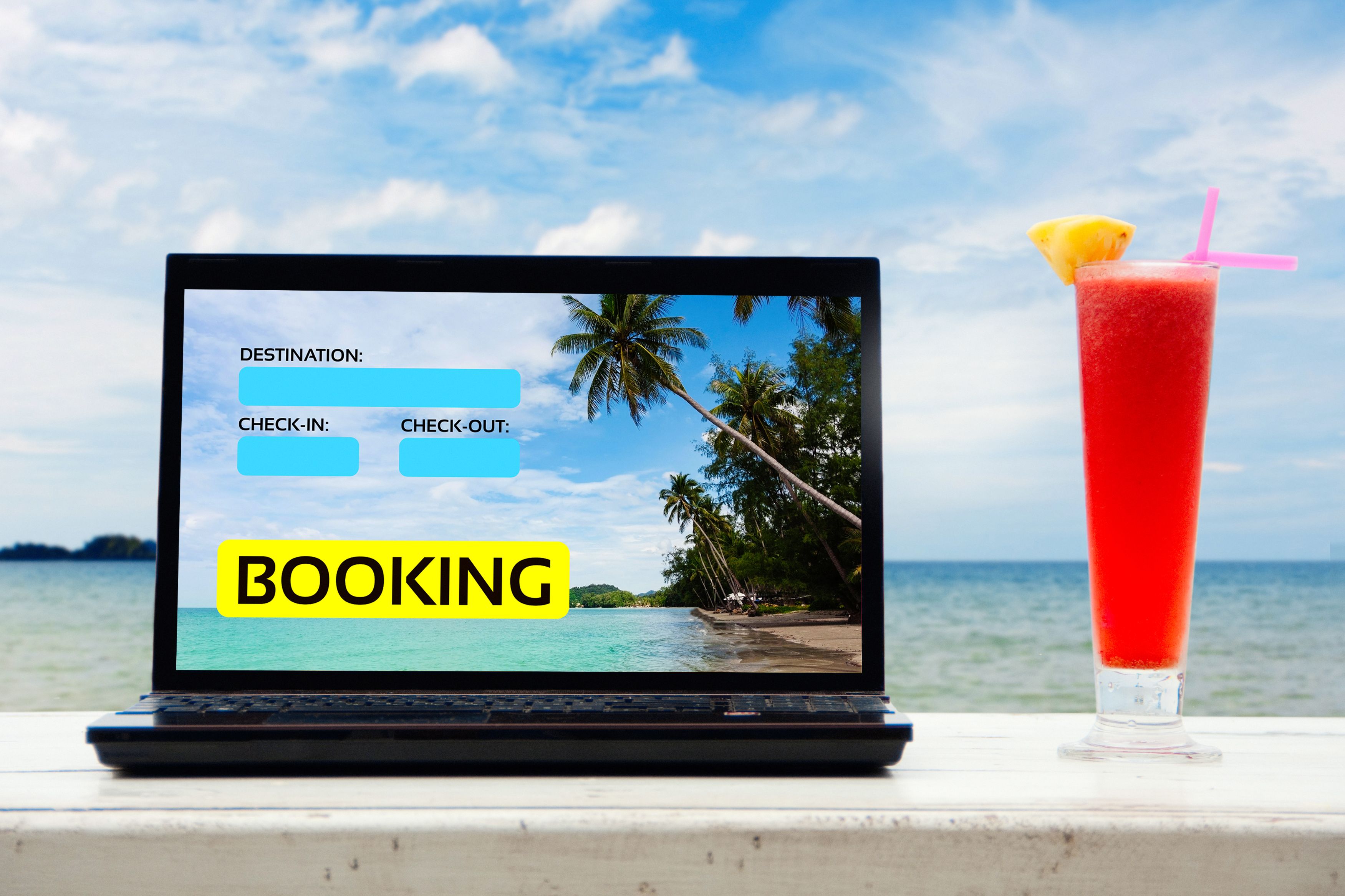
https://cupid.travel/blog/4-key-ways-to-build-a-successful-online-travel-agency-in-2023
4 Key Ways to Build a Successful Online Travel Agency in 2023
In the fast-paced world of online travel, standing out is paramount. This guide dives into the key strategies for Online Travel Agencies (OTAs) to gain a competitive edge in 2023, focusing on personalization, strategic alliances, user experience, and customer service. Learn how to leverage technology, big data, and shifting consumer behaviors to drive your OTA's success.
In the rapidly transforming world of online travel, carving a distinctive presence has become paramount for Online Travel Agencies (OTAs). The digital revolution, coupled with the proliferation of travel companies, has reshaped how consumers approach travel bookings. With a simple click of the mouse, consumers can shift their allegiance from one travel service to another, creating an imperative for OTAs to devise innovative strategies that not only attract but also retain these digitally savvy travelers.
Just as the world of online travel has rapidly evolved in the past few years, our access to information and big data analytics has given us unparalleled insight into macro trends and consumer behavior. We’re seeing growth in the tourism industry, with hotels as the largest market segment.
Revenue in travel and tourism is expected to show an annual growth rate of 4.41%, resulting in a projected market volume of US$1,016.00bn by 2027. Source
The market’s largest segment is Hotels with a projected market volume of US$408.80bn in 2023. Source
Furthermore, insights derived from big data reveal significant changes in travel patterns, as well as evolving online user preferences and behaviors.
It’s more important than ever to leverage these insights. Let’s take a deep dive into some of the key trends in overall consumer behavior and in the travel industry, to see how we can apply these insights to running a successful online travel agency.
1. Personalization and Customer Engagement
The modern traveler, particularly within the millennials and Gen Z demographics, craves personalized experiences , marking a trend OTAs can’t afford to ignore. This trend has created an imperative for OTAs to provide tailored offerings that resonate with each customer’s unique tastes, lifestyle, and past booking patterns.
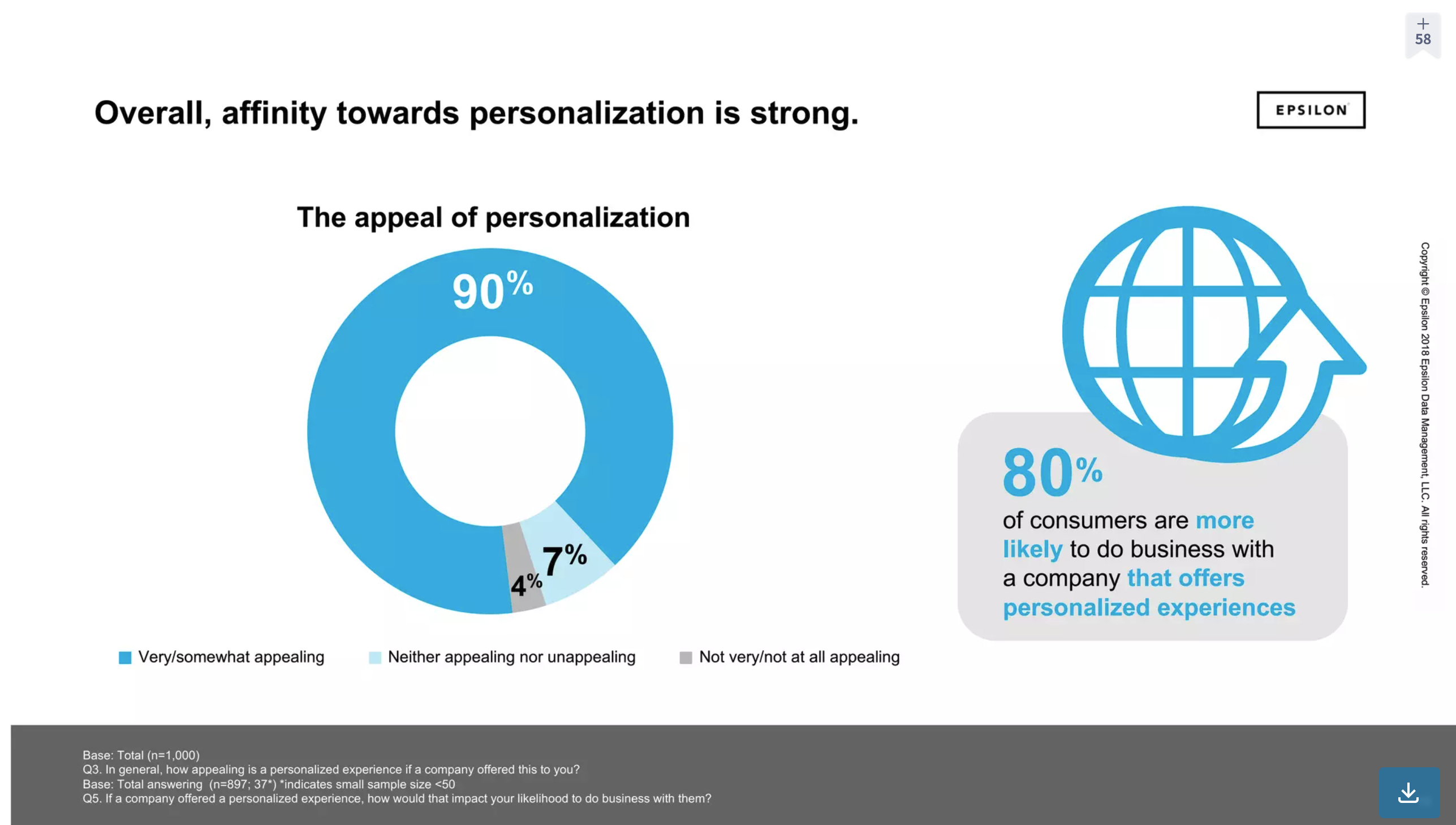
Embracing behavioral trends like environmental consciousness can also position an OTA as a forward-thinking business and set them apart from the rest.
70% of global travellers say they would be more likely to book an accommodation knowing it was eco-friendly […] Source
In practical terms, OTAs can enhance their platforms to cater to sustainability-focused travelers in a few key ways. They can include a filter for “Eco-friendly” or “Sustainable Travel” options that highlight certified sustainable providers and experiences, such as resorts using renewable energy, hotels with efficient waste management, or responsible tourism practices. The OTA’s site can also feature informative content like blog posts, videos, or infographics that educate visitors about sustainable tourism practices. Moreover, integrating sustainability ratings into their review system gives previous travelers a voice in endorsing accommodations or operators that prioritize sustainable practices, helping future travelers make informed, eco-conscious decisions.

The increase in solo travel is also reshaping the travel industry, with a 2019 study revealing that 76% of travelers were considering or had already embraced this trend. Among women, interest has soared exponentially.
With the term “solo female travel” searches having risen six-fold in the four years before the COVID-19 pandemic, and women making up 70% of hotel website visits , OTAs can seize this opportunity.
By offering curated solo travel packages and enhancing search functionalities for solo traveler preferences, OTAs can cater to this growing market segment.
Implementing data-driven personalization, whether through bespoke travel packages or personalized communications, has been shown to enhance brand loyalty and customer retention. OTAs can utilize insights derived from customer behaviors and preferences to curate experiences that resonate with each client’s travel aspirations.
Prioritizing personalization and customer engagement can deepen customer relationships, enhance brand loyalty, and propel OTAs’ growth and success in the competitive online travel landscape.
2. Strategic Partnerships and Alliances
By forming strategic partnerships with airlines, hotels, car rental services, and local tour operators, OTAs can offer customers a broader range of services. This not only creates new revenue streams but also enhances the overall value proposition of the OTA.

Remember what we mentioned about the increased interest in sustainable tourism? There’s an opportunity here. For example, OTAs can strategically partner with green initiatives by integrating carbon offset programs into their booking process. This allows travelers to voluntarily fund environmental projects, thus highlighting the OTA’s commitment to sustainability and resonating with the eco-conscious travelers.
Think of strategic partnerships as a way to demonstrate commitment to a cause both you and your users have a strong interest in. It’s a win-win situation.
3. Site Optimization for Improved User Experience
In today’s digital age, the design and functionality of your website can significantly impact your business’s success. A seamless user interface, on both desktop and mobile, incorporating elements like quick registration processes, a comprehensive search results display, intuitive and personalized user areas, can enhance customer engagement and boost conversion rates.
38% of users will stop engaging with a website if the content or layout is unattractive. Source
This underscores the importance of aesthetic appeal and easy navigation.
However, these facets need constant attention and improvement to stay in line with evolving market trends and user expectations. Failure to do so risks your portal falling behind its competitors.
A major component of user experience is the accommodation results users get after a query. An incorrectly implemented interface and API can lead to multiple listings for the same property, non-competitive pricing, or even properties that aren’t available for the user’s selected dates. This in turn can lead to low look-to-book ratios, or even worse, a user being sent to the wrong hotel.
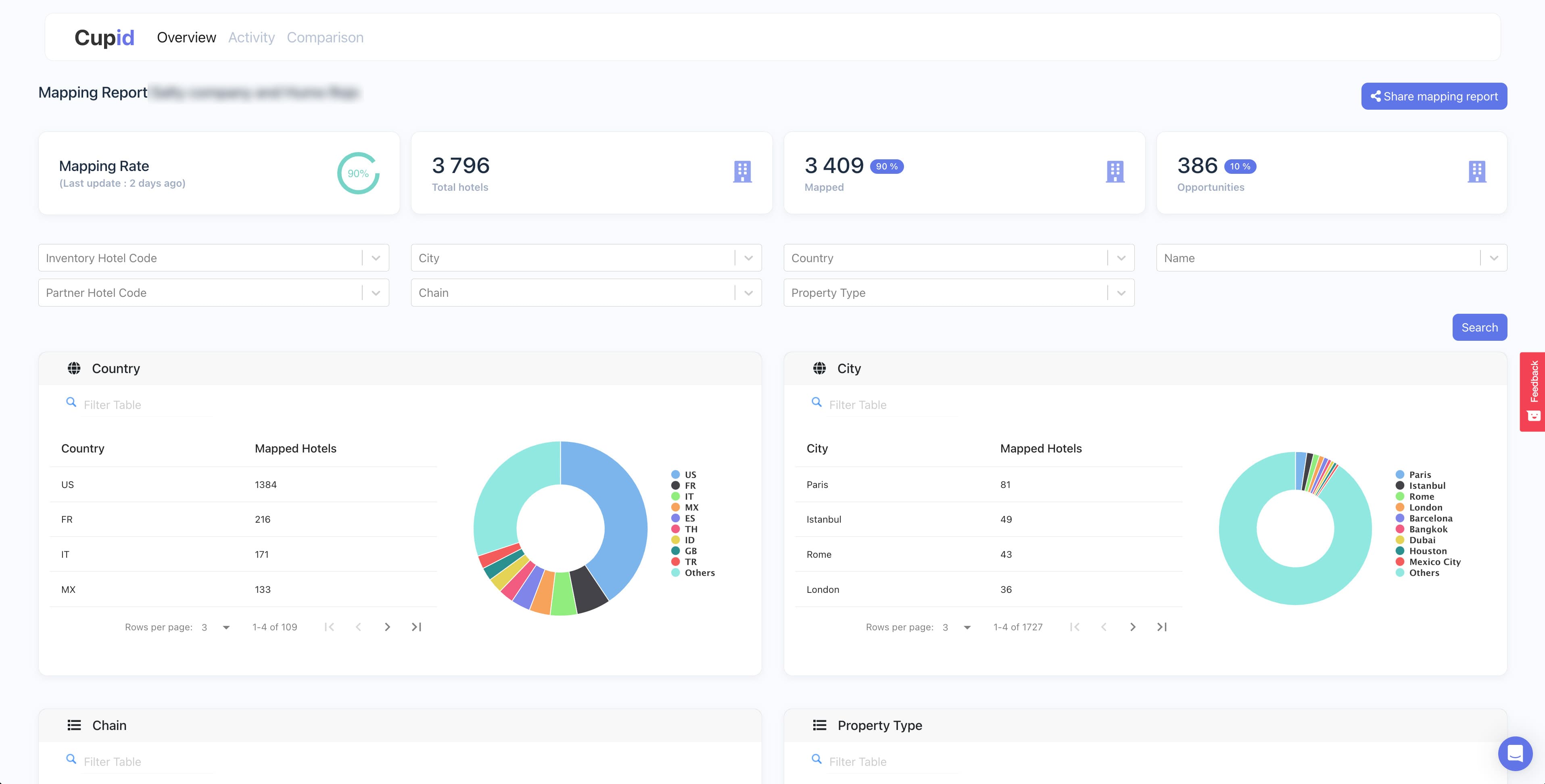
This is where hotel mapping comes into play. Hotel mapping, which involves accurately linking hotel properties from various suppliers, is a pivotal aspect of OTA operations. Yet, this crucial process is often overlooked or manually performed, leading to inconsistencies and inaccuracies. Automated mapping solutions like Cupid have emerged to address this challenge. Solutions like this use advanced machine learning to automate the mapping process, significantly improving coverage and accuracy. Enhanced accuracy reduces the risk of booking errors, thereby improving the customer experience and safeguarding potential revenue. Additionally, the automation optimizes workflows, boosting efficiency and overall conversion rates.
4. Prioritizing Customer Value, Feedback, and Service
In the increasingly competitive travel industry, creating customer value extends beyond just offering competitive pricing.
90% of Americans use customer service as a deciding factor when choosing to do business with a company. Source
This isn’t surprising, considering that users are often in a “vacation mood” and would appreciate a friendly, helpful interaction when they have inquiries or face issues.
As such, the presence of efficient customer service channels, such as chat systems, becomes crucial for OTAs. These platforms allow OTAs to address users’ inquiries and questions promptly, enhancing their overall experience. However, it’s not enough just to respond; the tone of these interactions should be as friendly and supportive as possible, considering the holiday spirit that users are typically in. With advances in generative language models, finely-tuned AI chatbots can greatly enhance the customer experience, and retain your brand’s unique voice.
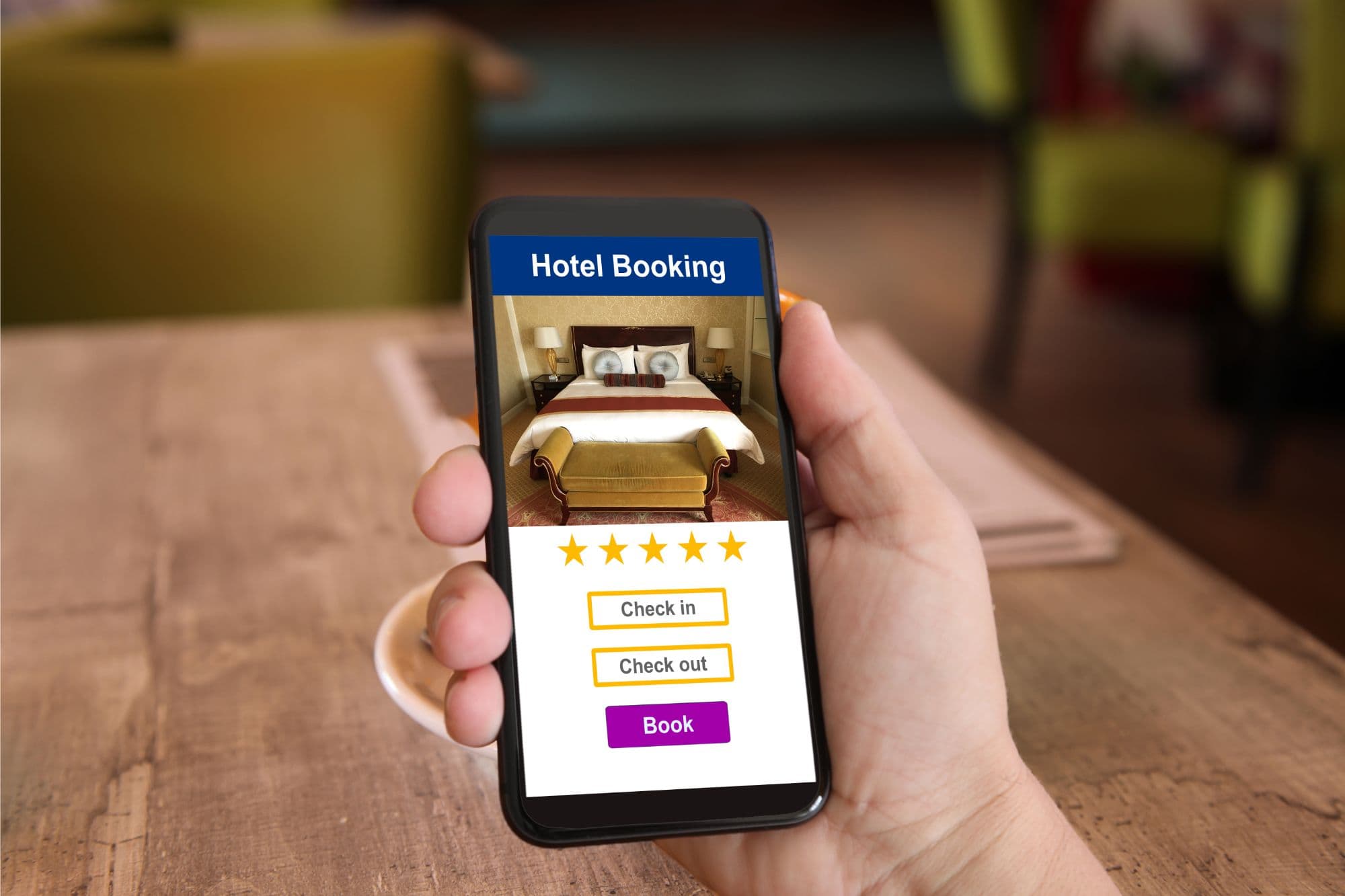
Alongside this, transparency in property information and cancellation policies, as well as prompt responsiveness to customer feedback, significantly contributes to your OTA’s appeal. Encouraging customers to leave reviews and responding to them promptly can bolster your online reputation, fostering trust among potential customers.
91% of 18-34 year old consumers trust online reviews as much as personal recommendations. Source
To sum up, investing in customer reviews and ratings, and enhancing customer service channels, can be a significant step towards boosting an OTA’s online reputation and customer trust.
The competitive landscape of the online travel industry, intensified by rapid technological evolution, demands innovative and adaptive strategies from OTAs. By implementing personalized customer engagement tactics, optimizing their websites for superior user experience, leveraging efficient hotel mapping tools, forming strategic partnerships, and prioritizing customer value and feedback, OTAs can differentiate themselves from their competitors.
By adopting these strategies and tactics and staying on top of consumer behavior, OTAs are better equipped to navigate the challenges, stand out from the crowd, and ensure their continued growth and success in the online travel industry.
Ready to start? Sign-up instantly and start mapping in less than 10 minutes at no cost.
Latest Stories
Here's what we've been up recenly

Unlock Tailored Experiences with Cupid's Room Matchin...
Explore how Cupid's unique room matching technology empowers travel companies to customize and optimize their room offerings, setting them apart in a crowded market.

Optimizing Hotel Distribution with Data Normalization
In the bustling arena of hotel distribution, the silent power of data normalization quietly dictates success.

Maximizing OTA Success with Enhanced Hotel Content
Unlock OTA success with Cupid's innovative hotel content solutions, enhancing customer experience and bookings.

Home Based Travel Agent: How to Start an Online Travel Business.
Start your own online travel business and become a successful home-based travel agent. Learn the steps, requirements, and tips for setting up your travel agency from home.
Table of Contents
Introduction

If you have a passion for travel and a desire to work from the comfort of your home, becoming a travel agent might be the perfect career choice.
With the advancements in technology and the rise of online booking platforms, it is now possible to establish yourself as a travel agent without needing a physical office.
In this article, we will guide you through the steps to become a travel agent from home and build a successful business in the travel industry.
Research the Travel Industry

Conducting thorough research on the travel industry is crucial before diving into the world of becoming a travel agent.
Familiarize yourself with current travel trends, popular destinations, and the services offered by travel agencies.
This will help you gain insights into the market demand and the opportunities available for travel agents.
Researching the travel industry involves gathering information and insights about the travel sector’s current trends, dynamics, and opportunities.
By conducting research, prospective travel agents can gain a deeper understanding of the industry, which can help them make informed decisions and develop effective strategies.
To research the travel industry, individuals can explore various sources of information, including:
- Online Resources: Utilize websites, travel blogs , and industry publications that provide up-to-date news, statistics, and analysis on the travel industry. Online travel forums and communities can also be valuable sources of information, offering insights from experienced professionals and travelers.
- Market Reports And Studies: Refer to market research reports and studies on the travel industry. These reports often provide detailed analyses of market trends, consumer behavior, and emerging destinations. They can offer valuable data and projections that can inform business decisions.
- Industry Associations And Organizations: Join travel-related industry associations and organizations that provide resources, networking opportunities, and industry-specific insights. These associations often conduct research and publish reports that can provide valuable information about the travel industry.
- Networking: Connect with professionals already working in the travel industry. Attend industry events, conferences, and trade shows to meet industry experts, suppliers, and travel agents. Networking allows individuals to gather firsthand knowledge, exchange ideas, and stay updated on industry developments.
When researching the travel industry, it is essential to focus on key areas such as:
- Travel Trends: Identify popular destinations, emerging travel trends, and the preferences of different traveler segments. Understanding travelers’ evolving demands and interests can help travel agents tailor their services and offerings.
- Competition Analysis: Study and analyze other travel agencies and online travel platforms. Identify their strengths, weaknesses, unique selling points, and target markets. This analysis can help identify market gaps and develop strategies to differentiate from competitors.
- Technology And Platforms: Stay updated on the latest technological advancements and online booking platforms. Research travel agencies’ tools and systems to streamline operations, manage bookings, and provide seamless customer experiences.
- Regulations And Policies: Stay informed about travel regulations, visa requirements, and any legal considerations that may impact the services offered by travel agents. Being aware of travel restrictions, safety guidelines, and documentation requirements can help ensure compliance and provide accurate information to clients.
Researching the travel industry is an ongoing process, as the industry constantly evolves and adapts to changing consumer preferences and external factors.
By staying well-informed, travel agents can make strategic decisions, identify market opportunities, and provide valuable services to their clients.
Obtain Relevant Certifications and Training

While no specific educational requirements exist to become a travel agent, obtaining relevant certifications and training can greatly enhance your credibility and expertise.
Look for recognized travel agent certification programs offering comprehensive training in travel booking systems, customer service, and destination knowledge.
Some popular certifications include Certified Travel Associate (CTA) and Certified Travel Counselor (CTC) .
Obtaining relevant certifications and training is an important step for aspiring travel agents. While there are no specific educational requirements to enter the field, acquiring certifications and training can enhance one’s knowledge, skills, and credibility as a travel professional.
Here is a closer look at why obtaining certifications and training is valuable:
- Enhanced Knowledge and Expertise: Certification programs and training courses provide in-depth knowledge about various aspects of the travel industry. They cover travel booking systems, customer service, destination knowledge, travel regulations, and industry best practices. By gaining this specialized knowledge, aspiring travel agents can become well-rounded professionals capable of delivering exceptional service to their clients.
- Credibility and Trust: Certifications from recognized organizations validate the expertise and professionalism of travel agents. Clients often seek travel agents with relevant certifications, demonstrating a commitment to continuous learning and industry standards. Holding certifications can boost your credibility, instill trust in clients, and differentiate you from competitors.
- Industry Recognition: Prominent travel industry associations and organizations develop and recognize many certification programs. By completing these certifications, individuals gain recognition within the industry and may have access to networking opportunities, exclusive resources, and professional development events. Being part of these networks can open doors to collaboration, partnerships, and career growth.
- Competitive Advantage: In a competitive market, having certifications can give you an edge over other travel agents. Clients are likelier to choose agents with specialized knowledge and industry-recognized credentials. Certifications showcase your commitment to professionalism and continuous improvement, making you a preferred choice for clients seeking reliable and knowledgeable travel agents.
- Access to Resources: Many certification programs offer ongoing support and resources for certified professionals. This can include access to online forums, updated industry information, marketing materials, and assistance in keeping up with industry changes. These resources can be invaluable for staying informed, providing accurate information to clients, and growing your business.
When choosing certifications and training programs, look for those offered by reputable organizations or associations such as the International Air Transport Association (IATA), The Travel Institute, or the Association of Retail Travel Agents (ARTA).
These organizations provide recognized certifications that hold weight in the industry.
Remember, certifications and training should be seen as a continuous process.
As the travel industry evolves, it is important to stay updated with the latest trends, technologies, and regulations through ongoing education and professional development opportunities.
By investing in certifications and training, you can establish yourself as a knowledgeable and competent travel agent ready to provide exceptional service to your clients.
Set Up Your Home Office

Creating a dedicated workspace is essential when working from home as a travel agent.
Set up a comfortable, organized home office that keeps you focused and productive.
Equip yourself with a reliable computer, high-speed internet connection, and necessary software for travel bookings and research.
A separate phone line for business calls can also add a professional touch.
Setting up a dedicated home office is essential for those who want to become travel agents and work from the comfort of their own homes.
A well-equipped and organized workspace can enhance productivity and professionalism and create a conducive environment for conducting travel-related business.
Here are some key considerations when setting up your home office:
- Choose a Suitable Space: Select a quiet and well-lit area in your home that can be designated as your office space. It could be a spare room, a corner of a room, or any area where you can have privacy and minimal distractions. Ensure enough space for a desk, chair, storage, and other equipment.
- Ergonomic Furniture and Equipment: Invest in a comfortable chair and a desk that provides ample space for your computer, paperwork, and other office supplies. Consider ergonomics to maintain proper posture and prevent strain or discomfort during long working hours. Additionally, acquire a reliable computer/laptop, high-speed internet connection, and a dedicated phone line for business calls.
- Organize Your Workspace: Establish a system for organizing your documents, client information, and other materials. Use filing cabinets, shelves, or storage solutions to keep everything in order and easily accessible. Labeling and categorizing systems can help streamline your workflow and save time searching for important information.
- Essential Office Supplies: Stock up on pens, notepads, paper, envelopes, folders, and printer ink. These readily available supplies ensure you can handle administrative tasks efficiently without interruptions.
- Lighting and Ambiance: Ensure proper lighting in your home office to reduce eye strain and create a comfortable working environment. Natural light is ideal, but if that is not possible, invest in adequate artificial lighting options. Consider adding plants or decor that inspire productivity and create a pleasant ambiance.
- Privacy and Distractions: Establish boundaries with family members or housemates to minimize interruptions during working hours. Inform them about your work schedule and the importance of maintaining a quiet environment in the office. Consider using noise-canceling headphones or playing soft background music to minimize distractions further.
- Security and Confidentiality: Protect sensitive client information and maintain data security. Install security software on your computer, use strong passwords, and encrypt files containing personal or confidential data. It is crucial to prioritize the privacy and confidentiality of your client’s information.
- Personalize Your Space: Make your home office reflect your personality and preferences. Decorate it with motivational quotes, artwork, or items that inspire you. Personal touches can create a positive and engaging atmosphere that boosts your mood and productivity.
Remember, setting up a home office is about having the right physical setup and creating a professional mindset.
Establish a routine, set dedicated working hours, and maintain a disciplined approach.
By creating a functional and inviting home office, you will be well-prepared to provide excellent service as a travel agent from the comfort of your home.
Establish Your Niche

Establishing a niche is crucial for becoming a successful travel agent from home.
A niche is a specialized area or segment within the travel industry that you focus on and cater to.
By identifying and establishing your niche, you can differentiate yourself from competitors, target a specific audience, and offer unique services.
Here is how to establish your niche as a home-based travel agent:
- Identify Your Interests and Expertise: Reflect on your interests, passions, and areas of expertise within the travel industry. Consider the types of travel experiences you enjoy, destinations you are knowledgeable about, or specific travel needs you can address. For example, you might have expertise in adventure travel, luxury vacations, family-friendly destinations, or eco-tourism. Your niche should align with your interests and strengths.
- Research Market Demand: Conduct market research to identify potential gaps or untapped opportunities within your chosen niche. Evaluate your target market’s demand for specialized travel services and assess the competition. This research will help you determine if your niche has sufficient demand and room to thrive.
- Define Your Target Audience: Identify the specific group of travelers you want to serve within your niche. Consider demographics (age, gender, income level), interests, travel preferences, and specific needs. Understanding your target audience will enable you to tailor your services, marketing efforts, and communication to reach and engage them effectively.
- Tailor Your Service s: Develop unique travel services and offerings that cater to the needs and desires of your target audience. Consider how you can provide added value, specialized knowledge, or exclusive experiences within your niche. For example, if your niche is wellness travel, you could curate wellness-focused itineraries, offer personalized recommendations for wellness retreats, or guide on incorporating wellness activities into a vacation.
- Build Relationships with Suppliers: Establish strong relationships with travel suppliers who can support your niche. This could include airlines, hotels, tour operators, cruise lines, or specialty travel providers. Collaborating with suppliers who align with your niche can result in exclusive deals, tailored packages, and access to unique experiences that set you apart from other travel agents.
- Showcase Your Expertise: Position yourself as an expert within your niche by consistently sharing valuable and relevant content. Use digital platforms such as a website, blog, social media, or email newsletter to provide insightful information, tips, and recommendations for your niche. This establishes your credibility, attracts potential clients, and helps build trust in your expertise.
- Market Your Niche: Develop a marketing strategy that promotes your niche and reaches your target audience. Use appropriate channels and platforms to showcase your specialized services, such as targeted online advertising, partnerships with complementary businesses, participation in industry events, or collaborations with influencers or bloggers within your niche.
By establishing your niche, you can position yourself as a go-to expert in a specific travel industry area.
This specialization allows you to effectively target your marketing efforts, provide unique value to your clients, and differentiate yourself from generalist travel agents.
Remember to continually assess market trends and adapt your niche to stay relevant in an evolving industry.
Build Relationships with Suppliers

Building strong relationships with suppliers is essential for travel agents who want to provide exceptional services and access exclusive deals for their clients.
By establishing mutually beneficial partnerships with suppliers, you can enhance the value you offer as a travel agent and ensure your clients a smooth and seamless travel experience.
Here are some key steps to build relationships with suppliers:
- Research and Identify Reputable Suppliers: Conduct thorough research to identify reputable suppliers within your niche or the specific destinations you specialize in. Look for suppliers with a track record of delivering quality services, maintaining strong relationships with travel agents, and offering competitive rates. Consider factors such as their reliability, customer service, and the unique experiences they can provide.
- Attend Industry Events and Trade Shows: Participate in industry events, trade shows, and networking opportunities to connect with suppliers face-to-face. These events provide a platform to establish personal connections, gain insights into their offerings, and negotiate favorable terms. Building in-person relationships often leads to more fruitful collaborations than purely online interactions.
- Reach Out and Introduce Yourself: Take the initiative to contact suppliers and introduce yourself as a travel agent. Please express your interest in working together and explain how your niche or target audience aligns with their offerings. Share your unique selling points and how collaborating with them can benefit both parties.
- Showcase Your Professionalism and Expertise: Demonstrate your professionalism, knowledge, and expertise in the travel industry when interacting with suppliers. Be prepared with insightful questions, showcase your understanding of their products or services, and convey your commitment to providing exceptional service to your clients. Suppliers appreciate working with knowledgeable and reliable travel agents who promote their offerings effectively.
- Establish Open and Transparent Communication Channels: Maintain open lines of communication with your suppliers. Establish clear expectations regarding their services, commission structures, payment terms, and any special arrangements for your clients. Clear communication ensures smooth coordination and minimizes misunderstandings.
- Provide Feedback and Share Success Stories: Provide constructive feedback on the experience after working with a supplier. Suppliers appreciate insights on improving their services and addressing any issues that may arise. Additionally, share success stories and positive client feedback with the suppliers, highlighting the positive impact of their services on your clients’ travel experiences.
- Foster Long-term Relationships: Aim to build long-term relationships with your suppliers based on trust, mutual respect, and reliability. Maintain regular contact with them, even when you do not have immediate bookings. Keeping them updated on your business growth and upcoming travel plans shows your commitment to the partnership.
- Stay Updated on Industry News and Trends: Stay informed about the latest industry news, trends, and developments. This lets you have meaningful conversations with suppliers and demonstrates your dedication to staying current in the travel industry. Suppliers appreciate knowledgeable travel agents who can contribute valuable insights to the partnership.
Remember, building relationships with suppliers is an ongoing process. Regularly evaluate your partnerships, provide feedback, and explore opportunities to collaborate on new offerings or promotions.
By nurturing strong relationships with suppliers, you can access exclusive deals, provide unique experiences to your clients, and establish yourself as a trusted and reliable travel agent.
Create an Online Presence

Creating a strong online presence is essential for travel agents who want to reach a wider audience, showcase their expertise, and attract potential clients. In today’s digital age, establishing an online presence allows you to connect with travelers, build credibility, and promote your services effectively. Here are some key steps to create an impactful online presence:
- Build a Professional Website: Your website is the foundation of your online presence. Invest in a well-designed, user-friendly website that reflects your brand and showcases your services. Include essential information such as your contact details, services offered, destination expertise, and client testimonials. Ensure that your website is mobile-friendly and optimized for search engines.
- Develop Engaging Content: Create compelling, informative content that resonates with your target audience. This can include blog posts, destination guides, travel tips, and industry news. Share your expertise, provide valuable insights, and address travelers’ common questions or concerns. Engaging content establishes you as an authority in the industry and attracts organic traffic to your website.
- Utilize Social Media Platforms: Establish a presence on relevant social media platforms such as Facebook, Instagram, Twitter, or LinkedIn. Choose platforms that align with your target audience and focus on building an active and engaged community. Share visually appealing content, engage with your followers, and use social media to promote your services, share travel inspiration, and interact with potential clients.
- Implement Search Engine Optimization (SEO) Strategies: Optimize your website and online content for search engines to improve your visibility in search results. Conduct keyword research to identify relevant keywords and incorporate them naturally into your website copy, blog posts, and meta tags. Ensure your website is structured properly, with clear headings, meta descriptions, and alt text for images.
- Leverage Online Travel Platforms: Partner with online travel platforms like TripAdvisor, Expedia, or Booking.com to expand your reach and gain exposure to a broader audience. Create detailed profiles, respond to reviews, and actively engage with travelers on these platforms. Positive reviews and high ratings can boost your credibility and attract potential clients.
- Engage with Online Communities: Join online travel communities, forums, and discussion groups to share your knowledge and engage with travelers. Offer valuable advice, answer questions, and participate in conversations. This helps you establish yourself as a helpful and knowledgeable travel agent and allows you to connect with potential clients actively seeking travel advice.
- Invest in Visual Content: Visual content plays a crucial role in the travel industry. Share high-quality images and videos that showcase destinations, unique experiences, and your services. Visual content is highly shareable and can attract attention on social media platforms, inspiring potential clients to engage with your brand.
- Collect and Share Testimonials: Request testimonials from satisfied clients and display them prominently on your website and social media platforms. Positive testimonials build trust and credibility, assuring potential clients of your expertise and professionalism. Encourage clients to leave reviews on platforms such as Google My Business or Facebook to enhance your online reputation further.
- Consistency and Engagement: Consistently update your online platforms with fresh content, respond to inquiries promptly, and engage with your audience. Consistency and responsiveness demonstrate your commitment to customer service and professionalism.
- Monitor and Analyze Performance: Regularly monitor the performance of your online platforms using analytics tools. Track website traffic, engagement metrics, and conversion rates. Analyzing data helps you identify what works well and where to improve your online presence.
By following these steps and actively managing your online presence, you can establish a strong and influential digital presence as a travel agent.
Your online presence will enable you to connect with potential clients, showcase your expertise, and ultimately grow your business in the competitive travel industry.
Provide Exceptional Customer Service

Providing exceptional customer service is crucial for travel agents who aim to exceed their client’s expectations and build long-lasting relationships.
Exceptional customer service ensures client satisfaction and leads to positive word-of-mouth recommendations and repeat business.
Here are some key principles to guide you in delivering outstanding customer service as a travel agent:
- Active Listening: When interacting with clients, practice listening to understand their needs, preferences, and concerns. Please give them your full attention, ask relevant questions, and take note of their requirements. By listening actively, you demonstrate empathy and show that your top priority is their satisfaction.
- Personalization: Tailor your services to meet each client’s unique needs and preferences. Please get to know them to inquire about their travel preferences and take note of special occasions or specific requests. By offering personalized recommendations and experiences, your clients feel valued and appreciated.
- Prompt Responsiveness: Respond to client inquiries and requests promptly. Aim to provide timely and accurate information, whether it is regarding travel itineraries, pricing details, or any other queries. Prompt responses show that you prioritize their needs and are committed to providing excellent service.
- Knowledge and Expertise: Stay updated with travel trends, destinations, and industry information. Be knowledgeable about visa requirements, travel regulations, and other pertinent details about your clients’ trips. Your expertise inspires confidence and allows you to offer valuable advice and recommendations.
- Attention to Detail: Pay attention to the smallest details when planning and organizing travel arrangements for your clients. From ensuring accurate bookings to double-checking itineraries and verifying special requests, meticulous attention to detail helps create seamless and memorable travel experiences.
- Clear and Transparent Communication: Communicate with your clients clearly, concisely, and transparently. Please provide them with all the necessary information upfront, including pricing details, cancellation policies, and potential limitations or restrictions. Clear communication avoids misunderstandings and ensures that your clients have realistic expectations.
- Anticipate and Exceed Expectations: Go above and beyond to exceed your client’s expectations. Surprise them with unexpected gestures like room upgrades, welcome amenities, or personalized recommendations for activities or dining options. By anticipating their needs and providing delightful surprises, you create memorable moments and leave a lasting impression.
- Problem Resolution: If any issues or challenges arise during a trip, be proactive in resolving them swiftly and effectively. Maintain open lines of communication with your clients and suppliers, and take ownership of finding solutions. Your willingness to assist and resolve problems demonstrates your commitment to their satisfaction.
- Post-Travel Follow-Up: After your clients’ trips, follow up to gather feedback and ensure their satisfaction. Request their input on travel experiences, accommodations, and other journey aspects. Address their concerns and use their feedback to improve your services for future clients.
- Continuous Learning and Improvement: Stay committed to continuous learning and improvement. Seek client feedback, stay updated with industry trends and customer service best practices, and invest in professional development opportunities. You can consistently deliver exceptional customer service by constantly improving your skills and knowledge.
Remember, exceptional customer service is the cornerstone of building a strong reputation and fostering client loyalty.
You can establish yourself as a trusted and sought-after travel agent by prioritizing your client’s needs, going the extra mile, and consistently delivering outstanding service.
Stay Updated with Industry Trends

Staying updated with industry trends is vital for travel agents who want to provide the best possible service to their clients and remain competitive in the ever-evolving travel industry.
By staying informed about the latest trends, you can offer valuable insights, adapt your strategies, and deliver relevant and innovative solutions to your clients.
Here are some effective ways to stay updated with industry trends:
- Subscribe to Industry Publications: Subscribe to reputable travel industry publications, both online and offline, that provide insights, analysis, and updates on the latest trends. These publications often cover emerging destinations, travel technology, consumer behavior, and industry news. Regularly reading industry publications keeps you informed about the latest developments.
- Follow Influential Travel Blogs and Websites: Identify influential travel bloggers and websites that focus on travel industry trends. Follow their blogs, subscribe to their newsletters, and engage with their content. Many travel bloggers and websites share valuable information, expert opinions, and firsthand experiences that can help you stay updated and gain new perspectives.
- Attend Travel Conferences and Events: In travel conferences, seminars, and industry events, industry experts gather to share insights and discuss the latest trends. These events provide valuable networking opportunities and allow you to connect with fellow travel professionals, suppliers, and thought leaders. Attending such events can broaden your knowledge and provide access to exclusive industry information.
- Join Professional Associations and Networks: Become a member of professional associations and networks that cater to travel agents and professionals. These associations often provide access to industry resources, webinars, workshops, and networking events. Engaging with fellow members and industry experts can keep you updated on industry trends and best practices.
- Engage on Social Media: Follow influential travel industry accounts on social media platforms like Twitter, LinkedIn, and Facebook. Many industry experts, travel publications, and organizations actively share updates, trends, and news on these platforms. Engaging in discussions, participating in industry-specific hashtags, and following relevant conversations can provide valuable insights.
- Network with Peers and Industry Professionals: Build and nurture relationships with other travel agents, tour operators, and industry professionals. Networking allows you to exchange knowledge, share experiences, and stay informed about the latest trends through informal conversations. Attend industry networking events or join online communities and forums where professionals discuss industry trends and challenges.
- Utilize Online Research and Resources: Conduct online research to explore travel industry trends. Look for reputable research reports, whitepapers, and studies that delve into various aspects of the industry. Analyze market trends, consumer behavior, and emerging travel preferences to identify potential opportunities and adapt your services accordingly.
- Follow Industry Thought Leaders: Identify influential thought leaders in the travel industry and follow them on social media, subscribe to their blogs, or listen to their podcasts. Thought leaders often share valuable insights, predictions, and analyses on industry trends. Their expertise can provide valuable knowledge and a deeper understanding of the industry landscape.
- Engage in Continuous Learning: Invest in professional development by enrolling in relevant courses, webinars, or workshops. Many organizations offer training programs focusing on travel industry trends, customer behavior, marketing strategies, and emerging technologies. Continuous learning ensures that you stay ahead of the curve and are equipped with the latest knowledge and skills.
- Monitor Competitors: Keep an eye on your competitors and observe their strategies. Monitor their websites, social media channels, and marketing campaigns to identify trends or innovations they are incorporating. This can help you identify areas to improve or find new ideas to stay relevant in the industry.
By proactively staying updated with industry trends, you can position yourself as a knowledgeable and trusted travel agent.
This allows you to offer valuable insights to your clients, adapt your strategies to changing demands, and provide exceptional service that aligns with the current travel landscape.

In conclusion, becoming a travel agent from home offers a rewarding opportunity to turn your passion for travel into a fulfilling career.
Throughout this article, we have explored the essential steps to embark on this journey successfully.
Each step contributes to building a strong foundation for your business, from researching the travel industry and obtaining relevant certifications to setting up a home office and establishing your niche.
We emphasized the importance of creating an online presence and utilizing SEO strategies to reach a wider audience and outrank competitors.
You can connect with readers personally by engaging in conversational writing and incorporating analogies and metaphors, making your content engaging and memorable.
Exceptional customer service emerged as a key aspect of success, as satisfied clients become advocates and referral sources.
You can exceed their expectations and build long-lasting relationships by providing personalized service, active listening, and prompt responsiveness.
Staying updated with industry trends is essential in this dynamic field.
By subscribing to industry publications, attending conferences, and networking with peers, you can gain valuable insights, adapt your strategies, and stay ahead of the curve.
Remember to continuously improve your knowledge and skills and embrace the burstiness and perplexity of content creation while maintaining specificity and context.
By adhering to the principles of formal language, rich, detailed paragraphs, and rhetorical questions, you can create content that engages readers and positions you as a trusted authority.
Incorporate these elements into your journey as a travel agent from home, and you will be well on your way to establishing a thriving business.
Embrace the opportunities presented by the digital age, build strong relationships with suppliers, and leverage the power of social media and online platforms to showcase your expertise.
As you embark on this exciting path, remember to continuously adapt to changes in the industry, monitor your performance, and seek opportunities for growth and improvement.
With dedication, passion, and a commitment to delivering exceptional service, you can succeed as a travel agent from the comfort of your home.
So, take the first step, follow the outlined guidelines, and embark on your journey to become a successful travel agent from home.
The world of travel awaits, and with the right strategies and mindset, you can turn your dream into a reality.

Do I need a degree in tourism to become a travel agent from home?
No, a tourism degree is not required to become a travel agent. However, obtaining relevant certifications and training can greatly enhance your expertise in the field.
Can I become a travel agent without limited travel experience?
You can become a travel agent even with limited travel experience. You can provide valuable insights and recommendations to your clients by staying updated with travel trends and destinations.
How much can I earn as a travel agent from home?
The earnings of a travel agent can vary depending on factors such as the number of clients, the services offered, and the commission structure. With dedication and a growing client base, you can earn a significant income as a travel agent.
Is it necessary to specialize in a specific type of travel?
While it is not mandatory, specializing in a specific type of travel can help you stand out in the market and cater to the unique needs of your target audience.
What are some essential software tools for a travel agent?
Essential software tools for a travel agent include travel booking systems, customer relationship management (CRM) software, and accounting software to manage bookings, client information, and financial records.
Post's Author
THOUSIF Inc. - WORLDWIDE
Our editorial team at THOUSIF Inc. – WORLDWIDE is a group of experts, Who aim to create well-researched, highly infotainment content.
Follow us on our social media handles. 👇
See author's posts
Share this:
- Click to share on Facebook (Opens in new window)
- Click to share on X (Opens in new window)
- Click to share on LinkedIn (Opens in new window)
- Click to share on Pinterest (Opens in new window)
- Click to share on Reddit (Opens in new window)
- Click to share on Tumblr (Opens in new window)
- Click to share on WhatsApp (Opens in new window)
- Click to share on Telegram (Opens in new window)
- Click to email a link to a friend (Opens in new window)
Related Posts
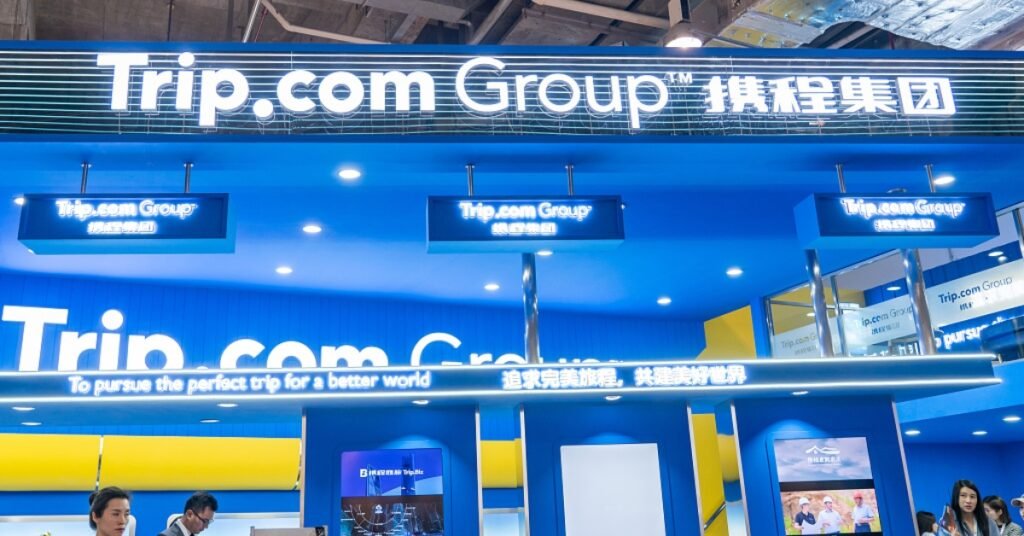
Trip.com and Capital A Berhad Forge a Dynamic Partnership to Enhance Travel Experience

Japan’s New Visa for Digital Nomads: A Comprehensive Guide

Snowstorms Disrupt Lunar New Year Travel Across China

Delta Air Lines Tops in Timeliness: A Look at Air Travel in 2023

The Current State of the US Travel Industry

Travel Influencer’s Guide to Beginner Backpacking
Leave a comment cancel reply.
Your email address will not be published. Required fields are marked *
Save my name, email, and website in this browser for the next time I comment.
- Credit cards
- View all credit cards
- Banking guide
- Loans guide
- Insurance guide
- Personal finance
- View all personal finance
- Small business
- Small business guide
- View all taxes
You’re our first priority. Every time.
We believe everyone should be able to make financial decisions with confidence. And while our site doesn’t feature every company or financial product available on the market, we’re proud that the guidance we offer, the information we provide and the tools we create are objective, independent, straightforward — and free.
So how do we make money? Our partners compensate us. This may influence which products we review and write about (and where those products appear on the site), but it in no way affects our recommendations or advice, which are grounded in thousands of hours of research. Our partners cannot pay us to guarantee favorable reviews of their products or services. Here is a list of our partners .
41 Online Business Ideas You Can Start in 2023

Many or all of the products featured here are from our partners who compensate us. This influences which products we write about and where and how the product appears on a page. However, this does not influence our evaluations. Our opinions are our own. Here is a list of our partners and here's how we make money .
Setting up an online business can help you become an entrepreneur without significant startup costs. The first step: figuring out the best online business idea for you.
What do you have expertise in? What do you love to do? Do you know someone who needs a type of support you could provide? Answering questions like these can offer inspiration as you prepare to start a business .
Here are 41 online business ideas to help you brainstorm. From side hustles to full-time enterprise, e-commerce businesses to services for remote clients, you may be able to run these from home on your own schedule.
advertisement

Shopify Ecommerce
Basic Plan. Shopify & Advanced Plans Available.
The 41 best online business ideas
If you're not totally set on going all-in on your online business, many of these ideas can be started part time. As you build your side hustle, it may be successful enough to turn into a full-time gig .
1. E-commerce store
Starting an e-commerce website is relatively easy and cheap — at least when compared with opening up a brick-and-mortar store. You can start with a limited amount of inventory, use an e-commerce website builder to set up your store, then market your products on social media and online marketplaces and see how customers respond. These platforms can also help you manage orders, ship your products and take online payments.
2. Social media marketing
If you’ve got a knack for getting likes, favorites, retweets, followers, shares, comments and clicks, then you might want to consider offering social media marketing services to other businesses. By consulting with companies to manage their social media profiles, spread their content across the web, keep their brands on track and respond to customer questions, you can turn your favorite hobby into your day job.
3. Freelance graphic design
Got an eye for aesthetics? Did you go to art school, or have you always spent your free time designing posters in Photoshop or Illustrator?
If so, then freelance designing might be a good choice. Take on clients at your own speed, build up a good reputation online and by word-of-mouth and work on projects that you find interesting.
4. Freelance writing
If you’re skilled in words instead, you might become a freelance writer . So long as you’ve got an internet connection and a keyboard, you can contribute all types of written content, from blog posts to feature stories to product descriptions. It helps if you’ve got a special area of interest or expertise so your employers will know you’re qualified to comment on certain topics.
» MORE: Best bank accounts for freelancers
5. E-book writing
With Amazon and other websites around, self-publishing has never been easier than it is today. If you think you’ve got something interesting or useful to say — and you believe other people will think so, too — then writing e-books could become a lucrative business.
With e-books, you don’t have to design, print or ship physical copies of your work. Of course, you will have to learn how to format an e-book correctly, pay for editing and cover design services and figure out an effective marketing strategy — but there are plenty of examples to learn from.
6. Translation
If you’re fluent in multiple languages, then translating could be the ideal online freelance job. You can do it from anywhere, so long as you’ve got the text you’re working on and you understand the goal of the translation.
» MORE: Check out 16 other e-commerce business ideas
Editing comes in many shapes and sizes, from copyediting a company’s marketing materials to proofreading novels to indexing academic manuscripts. As long as you have a sharp eye for detail, a strong grasp of grammar and a willingness to get in the weeds, then editing could be a great business idea if you’re interested in working when and how you want.
8. Writing a blog
Starting a blog can support other online business ideas by showing off your skills. Interested in coding, photography and video, fitness, food or anything else? Demonstrate your knowledge by writing great articles on those topics for others’ blogs.
If you choose to start your own blog, it can also generate revenue itself through affiliate links or advertisements.
9. Freelance researching
Whether you’re putting together documents for competitor or market research , answering tough technical questions on forums or analyzing statistics to point out trends, you can put your skills to work for your clients — with the freedom to work how you want.
10. Freelance coding and web design
If you’re seeking flexibility, diversity of projects, taking on work at your own pace and being your own boss, then freelance coding or web design for clients may be a good fit.
Plus, you can double down as a software consultant as well, offering your critical eye and expertise without writing code yourself.
» MORE: Best business credit cards for LLCs
11. Software and app development
Want to take freelance coding to the next level? Instead of helping clients, you can work on your own applications, programs, extensions and add-ons. Whether you sell your work in an app store or you’re holding out for the long haul and are hoping to get bought by a bigger company, the cash you make will be a direct result of your effort and ingenuity. App development is also a way to make money on Shopify .
Keep in mind, it’s not as easy to have a predictable stream of revenue until your app is already out and selling, and by then you’ve already invested a lot of time and energy. You’ll want to be sure that there’s a market out there for the product you’re creating, and that people are willing to pay for it.
12. Business coaching
You’ll need a good track record and a variety of testimonials to back you up, but if you’re already an entrepreneur, business coaching can provide an additional revenue stream. You can offer one-off sessions, small-group experiences or ongoing client relationships at a variety of price points.
13. College consulting
If you went to a top-tier university and have strong writing skills, you may be able to help applicants seeking admission to elite colleges. You might find yourself editing essays, steering students toward test prep courses and recommending scholarship programs, among other things.
» MORE: How to start a consulting business
14. Tutoring
For those studious entrepreneurs who scored highly on standardized tests, tutoring can pull in a lot of money without too much effort. The better your results, the better your reputation — which means the more you can charge per hour, session or package.
15. Online fitness trainer
If fitness and health is your passion, then serving as a fitness trainer to clients could be a fulfilling career. While training people online can be more difficult than being with them in person, this is an increasingly popular option for busy professionals. You can also consider related services like nutrition education.
» MORE: A step-by-step guide to starting a fitness business

16. SEO consulting
Maybe you’re a pro at SEO, or search engine optimization. If you’ve got loads of skill and experience in getting websites to rank highly on Google, and you understand how to turn searchers into customers, then there are plenty of companies willing to pay handsomely for your help.
Whether it’s by editing metadata tags, regularly updating the company blog or searching for smart keywords to rank highly on, a good SEO consultant can drastically change how a company’s website appears to search engine users — and just a few positions on Google can make a huge difference in traffic numbers. In short, you could have a big impact on a business’s bottom line, which means this online business idea is in high demand.
17. Selling handmade goods
If you’re handy or creative, you could craft your products and sell them on sites like Etsy, Amazon and eBay, straight out of your home.
Beyond that, if you’re a visual artist, you may also try selling print-on-demand products. That’s a type of e-commerce business where customers order mugs, T-shirts or other goods and with your artwork printed on them, then a third party creates the product and ships it to the customer.
18. Virtual thrift shop
Maybe you’re not into handicrafts but the idea of an starting an online store is still appealing? Selling clothes online using platforms like thredUP and Poshmark is one option.
If you're more interested in other types of products, you can scour local estate sales and secondhand shops for unique finds. You may also discover good finds on websites like eBay. As you present these products in compelling ways on your own site, good copywriting and a strong brand can go a long way to separating your site from the crowd.
19. Affiliate marketing
Social media pros, take notice: You can get paid by companies to highlight products on your blog, Instagram, Twitter, YouTube or other social channels. The more followers or site visitors you have, the more of an impact your brand recommendation will make, and the more you’ll earn with product placement.
20. Accounting or bookkeeping
Although entering the industry as a virtual bookkeeper or accountant can be tough because of competition from well-known brands in the industry, it can be done if you have the credentials or target clients in a specific niche. You’ll also need formal training and certification, and it may take time to build up a committed client base — but once you do, your clients may be with you for years.
» MORE: See our picks for best small-business accounting software
21. Telemarketing
If you’re a natural conversationalist who likes helping others, virtual telemarketing is another good online small-business idea to consider. Plenty of companies outsource some of their sales and customer service roles, so if you don’t mind working the phone at home or on the go, then try this option out.
22. Online personal assistant
Thinking about becoming a virtual assistant ? What exactly you’ll do depends on what your skills, experience and network of contacts are, but you can expect tasks from data entry to customer management, research, scheduling and other duties.
23. Data entry
If you’re looking for a job that offers a predictable income without requiring intense creativity, then data entry might be a good place to start. Try looking at online job boards for opportunities.
24. Transcription
Offering transcription services online can take many forms: You can transcribe audio interviews for reporters, create captions for TV shows and videos or develop transcribed versions of podcasts. Services like Rev or TranscribeMe can also send you work as it becomes available, which saves you the work of cultivating your own client base.
25. Travel planning
If travel is your passion, you might consider starting an online travel planning business . You can help clients plan every aspect of their trip — from flights to hotels to activities. You can work on itineraries, give tips about food, currency exchange and safety, and serve as a point of contact between your clients and any international contacts.
Not only can you operate your travel planning business at home, you can also do it while you travel. And more traveling will help you grow your business — you might even start a travel blog or photography site to supplement your planning business.
26. Cybersecurity and IT consulting
As a cybersecurity consultant, you can work with businesses of all sizes to evaluate their systems, run testing and offer tips on how they can improve their set up.
For those looking for something broader, you might consider serving as an IT consultant, assisting businesses or individuals with their technology — helping them get it set up, troubleshoot any issues and offer general operating advice.
With the proper computer set up, you can run your cybersecurity or IT consulting business from anywhere — including potentially traveling to clients’ offices for occasional on-site system assistance.
27. Online therapy
With the emergence of companies like TalkSpace and BetterHelp, you no longer have to have an office or your own practice to counsel patients. Again, you’ll need training and proper credentials. But you can explore the online therapy space by joining one of these new companies or another practice that offers virtual appointments.
28. PR consulting
If you're knowledgeable about business branding and marketing, you might start an online PR consulting business. You can assist businesses with their online presence — including social media accounts, press releases, web content and more — as well as advise them on campaigns, initiatives and overall public image.
As a freelance PR consultant, your hours and responsibilities may vary depending on the specific clients you're working with; however, you'll have more control than you would as part of a firm or agency.
29. Podcasting
Provided you have the right audio equipment and a quiet space, you can record your podcast from anywhere. You can then upload your content to various podcast apps and market your business on social media. Once you reach a certain number of listeners, some podcast platforms will help you sell ads and you'll begin generating revenue.
30. Life coaching
Looking for a way to offer advice and guidance to people without needing the extensive education of a medical professional? Consider life coaching . Although you may need a certification to become a life coach, you have much more freedom to find your niche and decide how you can help people through life's ups and downs.
As a life coach, you can also create resources like e-books and courses to give your clients additional resources outside of traditional phone call or video chat meetings.
31. Video production
As a video producer, you can work with different clients in various industries to shoot, cut and edit video to create the perfect final product. Video production can give you the opportunity to explore a unique medium of storytelling and exercise your creativity.
32. Resume writing and career coaching
If you have a background in human resources, or just know your way around formulating the perfect resume, you might consider starting an online resume writing and career coaching business. You can offer clients advice and guidance on their career path, job applications, resumes and cover letters.
LinkedIn is a great place to get started with this type of online business idea, as many professionals look for career help on that platform.
33. Dropshipping
If you don't want the responsibility of creating your own products or buying inventory upfront, you might consider starting a dropshipping business. With this kind of e-commerce operation, you create your own website, choose products from suppliers, list them on your site, and when an order is placed, the supplier will ship them directly to the customer.
You can get started by browsing dropshipping marketplaces or trying to work directly with manufacturers and importers.
» MORE: How to dropship on Shopify
34. Recruiting
If you're a people person and have good online research skills, you might consider a career as a recruiter. As an online recruiter, you can service different businesses looking to hire new employees and help them find and screen candidates. The more experience you have, the higher-level positions you may be tapped to help fill.
35. Marketing consulting
As a marketing consultant, you can provide guidance on a wide range of topics, depending on your specific expertise, and help businesses execute their online marketing strategies and campaigns. This could include email marketing, social media management and advertising, local marketing , event planning and more. You can specialize in a particular industry or geography, or market your skills to a variety of clients using a network like Upwork.
36. Online fundraising or grant writing
Are you passionate about helping mission-based businesses, especially nonprofits, getting the assistance they need? If so, consider a grant writing business. This requires you to work with clients who need help fundraising to identify grants suited to their needs, then apply for and hopefully win them.
37. Online course teaching
You can find information about practically anything online, but sometimes when you're trying to learn a specific skill or topic, it just helps to hear or see someone else explain it. So if there’s a subject you have specialized knowledge of — a particular software program, a craft, a particular historical event — consider designing an online course. If you have formal qualifications like an advanced degree, you might be able to work with an online course service to teach courses online for their students.
38. Online cooking instruction
Do you have an affinity for cooking or baking? Showcasing your skills online via virtual cooking classes is a great way to earn money while doing something you love. There are a variety of ways you can structure your cooking business: You can offer one-on-one instruction videos, host live classes and even create workshops and cooking programs.
This easy business idea could even translate into a cooking blog, e-books, cookbooks and linking your favorite cooking and baking supplies through affiliate marketing.
39. YouTube channel
One way to promote your new brand, service or message is by creating a YouTube channel. If you feel comfortable on camera, have a spot where you can film and love the idea of reaching a wide audience, YouTube might be the right platform for you. Note, though, that it can take some time for your channel to grow and you'll likely need to network on social media and blogging platforms in the beginning.
» MORE: How to make money on YouTube
40. Voiceover work
To start your own voiceover business, you'll need a microphone, sound editing software and the ability to lend your voice to ad agencies, production companies and anyone else looking for a voiceover.
Then, you can sign up for a freelance voiceover site like voices.com and start searching for the right opportunities. Once you've gotten your foot in the door, you'll have excellent clips to show potential clients.
41. Start a team
If you've been freelancing or running your own company for a while, you might be ready to take the plunge and start your own team of consultants or freelancers. For instance, if you have years of writing and editing experience and can no longer handle all your client inquiries yourself, you might be ready to hire your first employee and expand your capacity.
How to choose an online business idea
These online business ideas represent a variety of e-commerce business models . To choose the right one for you, ask these questions.
How do you want to make money?
Lots of business owners seek out predictable, recurring revenue so they can plan their personal finances. Keeping clients on retainer can help with that. But affiliate marketing, advertising or product sales may be harder to predict. Creating a business plan can help you think through your options and decide which you’re comfortable with.
How will you find work?
If you’re selling your skills as a freelancer, consider searching sites like Upwork and Behance to find the right clients. Networking in your local community, joining industry-specific LinkedIn groups and asking for referrals can be helpful, too.
If you’re selling products or building an audience online, you’ll need different tactics. Search engine optimization can help get your videos or product listings in front of people who will be interested in them. But you may need a significant marketing budget to develop an audience that’s large enough to generate revenue.
How much autonomy do you want?
With some online businesses, like selling handmade goods or creating online courses, you’ll have control over your products from start to finish — which can be freeing but also high-pressure. On the other hand, when you’re producing work for clients, you’ll have to conform to the client’s standards — which may feel confining, but you won’t have to do the work of coming up with ideas yourself. Some solopreneurs aim for a mix of client work and self-directed projects so that they have steady revenue while pursuing their passions.
A version of this article originally appeared on JustBusiness, a subsidiary of NerdWallet.
On a similar note...

- Multi-Vendor eCommerce
- eLearning Business
- Online Rental
- Book a Demo
- B2B eCommerce (1)
- eLearning Business Ideas (48)
- Online Rental Business Ideas (37)
- Online Grocery Business Ideas (39)
- Multi-Vendor eCommerce (75)
- Web Based Business Models (117)
- Food Delivery Startup Ideas (30)
- Online Ride Hailing Business Ideas (8)
- Mobile App Development (38)
- On-demand Services Business Ideas (10)
- Travel Marketplace Business Ideas (22)
- SEO & PPC (21)
- Conversion (30)
- Online Reputation Management (9)
- Tips and Trends (58)
- User Experience (10)
- Product Updates (4)
- Case Studies (2)
18+ Years of Industry Experience

Top 8 Online Business Opportunities in the Travel and Tourism Industry
Last Updated: 13th Nov, 2021
The travel industry has grown exponentially over the past few years. One of the many factors responsible for the growth within this industry is the increase in the purchasing power of consumers. Advancements in technology have proven to be the most important factor that has improved the experience a traveler seeks.
According to Statista, the global economic contribution of the travel industry reached 4.6 trillion USD in 2020. Amid the easing pandemic restrictions and increasing business opportunities in the tourism industry, these numbers are expected to increase even further. To excel in the travel industry, it is important for entrepreneurs to identify the right business model and the ideal travel & activity booking software to successfully launch an online travel marketplace.
In this blog post, we will present the top 8 Travel & Tourism Business ideas for entrepreneurs who want to be a part of the travel industry. Without further ado, let’s jump right in.
Table of Contents
- Online Hotel, Flight and Rental Car Booking Marketplace
- Run Vacation Rental Booking Marketplace
- Launch Online Travel Discussion Platform
- Online Travel Adventures Booking Site
- Online Bike Rental Marketplace
- Start a Snorkeling and Diving Equipment Rental/Booking Business
- Skiing Activity Booking/Rental Business
- Start a Boat Rental Marketplace
1. Online Hotel, Flight and Rental Car Booking Marketplace
With digitalization taking the center stage, people prefer to Google and search for places they plan to visit. Before traveling, transportation and accommodation are two important elements to consider during the research phase. To help you understand the working of a hotel/flight booking website, look at the following process diagram.
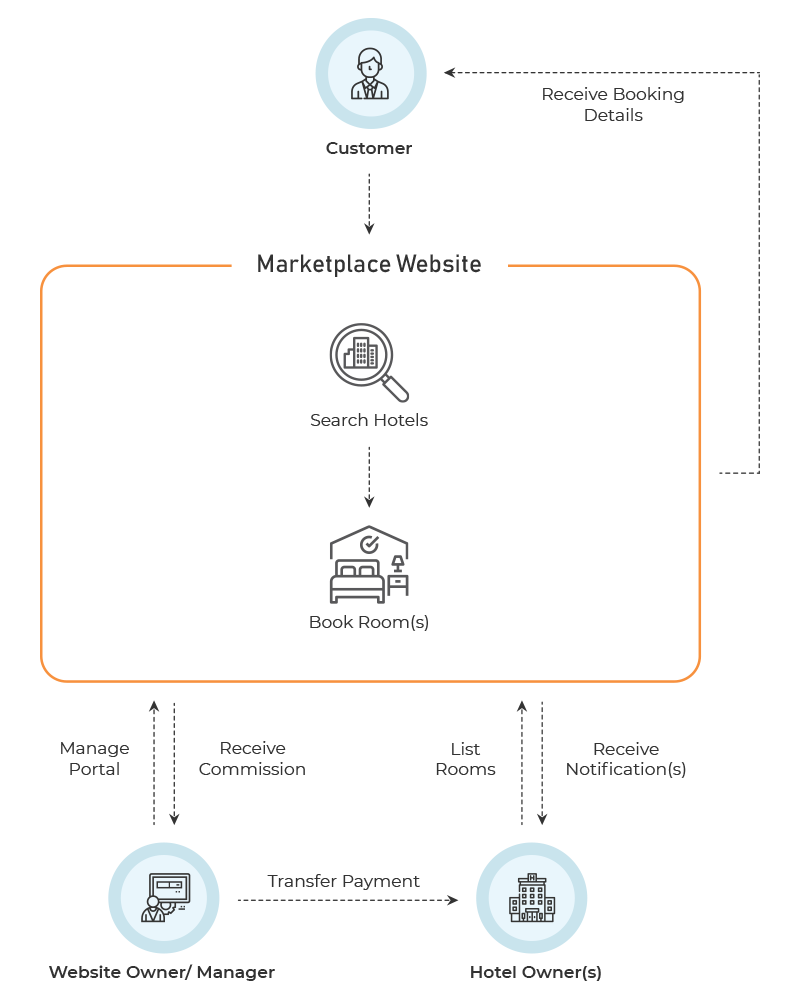
The model of this business is based on the concept of the marketplace. The hotel lists itself on the booking website. When a customer books a room from the marketplace website, the hotel is notified about the booking and the travel website owner or manager deducts an amount as commission. Booking.com is a prime example of such a marketplace.
Current Status of Hotel, Flight, and Car Rental Marketplace
The online travel market has a huge scope for eCommerce marketplaces that offer hotel, flight, and rental car booking functionality. According to a report by Allied Market Research, the annual growth rate for the online travel industry is projected to reach $1.1 trillion by 2022, growing at a compound annual growth rate (CAGR) of 11.1% since 2016. The instrumental resurgence of the travel industry is a result of travel giants and startups offering value/convenience to their customers.
For instance, travel industry behemoth Amadeus has partnered with Hopper, an emerging travel app, to introduce an instant rebooking feature (in case of any cancellation) to its marketplace. Similarly, Expedia Group is merging loyalty programs across its travel brands (Orbitz, hotels.com, Expedia, and more) to expand member benefits.
Business Opportunities in Hotel, Flight, and Car Rental Marketplace
It is an effective business model that requires business owners to understand their niche target audience and generate relevant leads. When choosing this business model, consider all the pros and cons while planning the marketing strategy.
If you wish to launch a travel booking website, try to conduct in-depth competitor research to know what your competition provides. Ideally, you should document your requirements based on the functionalities you require. Finally, make sure you understand what the future holds for the travel industry after which you compare and hire a website development partner to create the website as per your requirements. You can also choose an online travel activity booking software that delivers ready-made tour & travel marketplace. This will save you hundreds of thousands of development hours.
2. Run Vacation Rental Booking Marketplace
Booking hotels and cabs cost more money as compared to renting a place. It all started back in 1996 when a couple in Colorado was looking for a way to rent their ski condo and created a website for the same.
In rental booking, property owners list their apartments/condos/flats for rent. Travelers can search for rental places in their desired areas and choose the one that best suits them in terms of size, cost, location, etc. Renting property is advantageous for people traveling with families for a longer duration. To understand the business model better, refer to the diagram below:
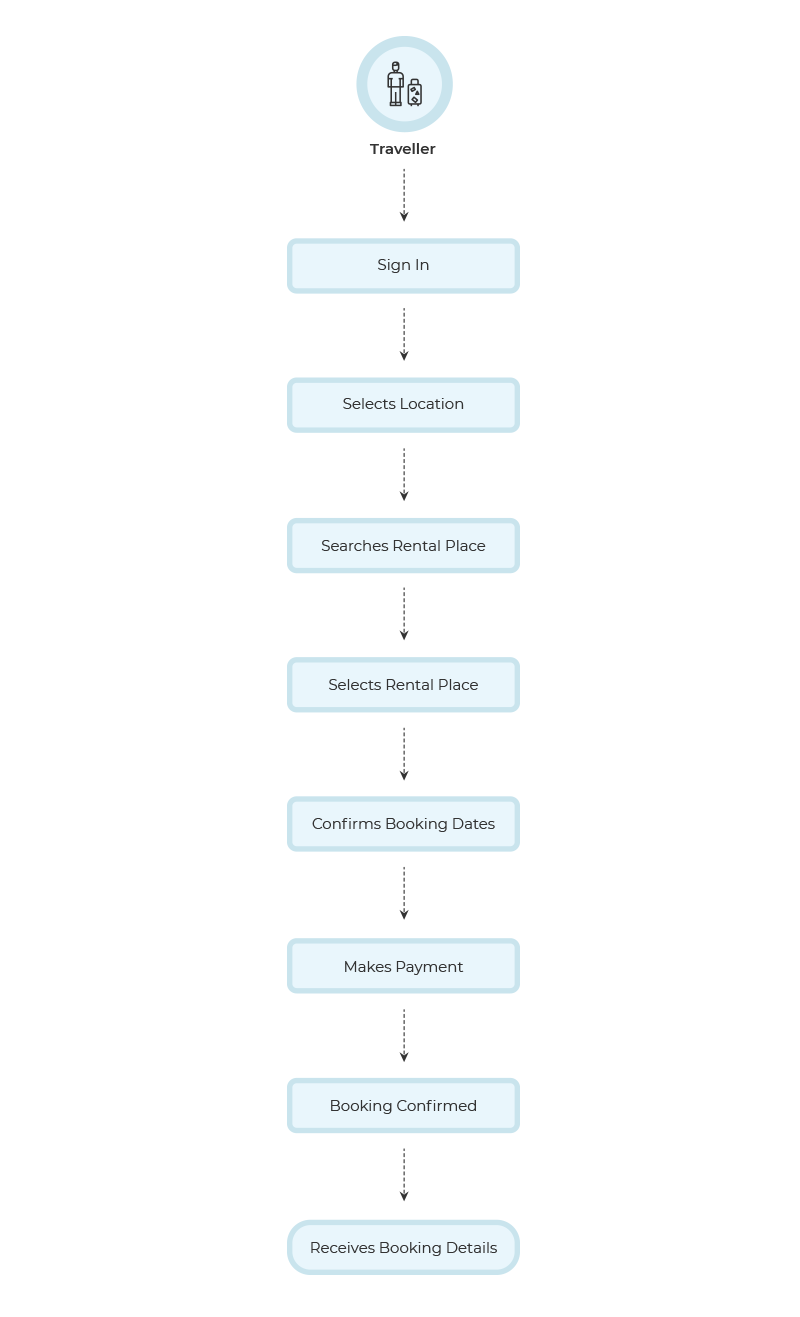
Current Status of Vacation Rental Booking Marketplace
2021 saw an uptick in family travelers on Airbnb and Expedia’s Vrbo. According to a new study by The Points Guy, these travelers are seeking a vacation rental space to enjoy and explore during extended weekends while continuing to work remotely during weekdays. As the travel industry rebounds from the COVID-19 crisis, Airbnb – the industry giant – recently announced the launch of 100+ new innovative upgrades such as flexible dates selection (rather than fixed dates) for vacation rentals, expansion of support agents to almost double, use of smart text selection to simplify listings for hosts, and much more.
Moreover, Airbnb released a 2021 report on Travel & Living with insights across the industry. It includes key findings such as – 200 million flexible date searches since January 2021, overall bookings in 94,000 cities in 12 months (ending on April 30, 2021), and an increase in longer stays vacations (28 days and more) from 14% in 2019 to 24% in Q1 2020. These stats reveal the explosive demand for vacation rentals and also how the pandemic has fundamentally changed travel.
From emerging marketplaces such as Evolve to industry giants such as Airbnb and Vrbo, several key players are playing an important role to consolidate a buoyant accommodation industry.
Business Opportunities in Vacation Rental Booking Marketplace
For any new business, a good marketing strategy is needed. As the rental vacation industry has presently shown growth post the crisis, it will attract a good number of hosts and renters. Therefore, to start your vacation rental marketplace, you need to be specific and different in your service provision with good SEO services, promotional services, branding, photography, and videography to spread awareness.
3. Launch Online Travel Discussion Platform
This platform makes it easy for travelers to decide whether they should undertake the trip or not and if yes, what is the best option while traveling. These platforms provide advisory to help people know the best places to travel and notify nearby tourist places of the destination through user-generated content (UGC). Check the graphic below to get a clearer idea of the business model.
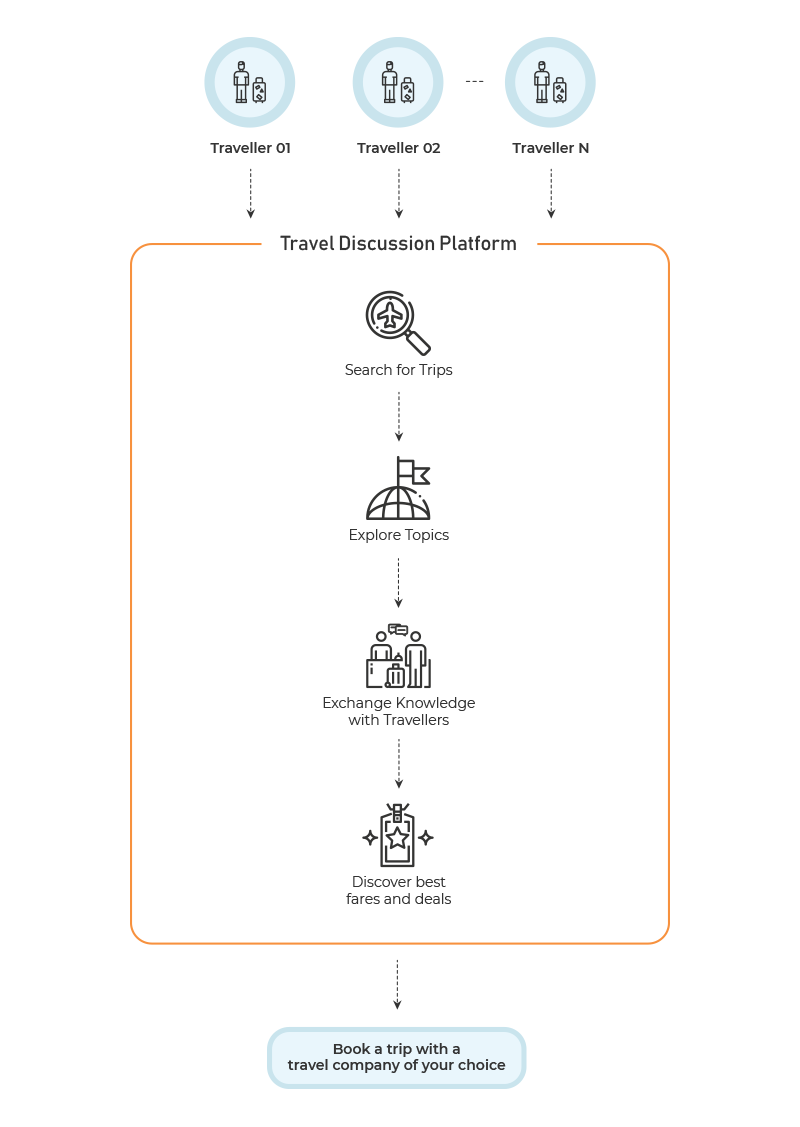
These platforms provide you with detailed information about the places that you must visit in a set time of the year. The websites help you compare fares offered by various hotels and you can opt for the services you want to avail.
Current Status of Online Travel Discussion Platform
One of the most renowned companies in the online travel discussion platform is Tripadvisor. Initially, a marketplace that suggests the best places to visit with details of hotels and activities in the desired place, Tripadvisor later added the trip bookings feature emerging as a one-stop solution for travelers to plan, book, and take a trip. Still, the spirit of this firm is to meet the customer’s expectations by providing guidance (thanks to over 934 million reviews) from those that have been there before.
Initially a subsidiary of Expedia Group, Tripadvisor later became an individual firm due to the corporate spin-off. Starting with an initial capital investment of $4 million USD, the company today enjoys a net worth of nearly $5 billion USD – termed as a classic consumer success story in an Harvard Business Review article. TripAdvisor has shown tremendous growth and gained a reputation because it reduces the work for marketers.
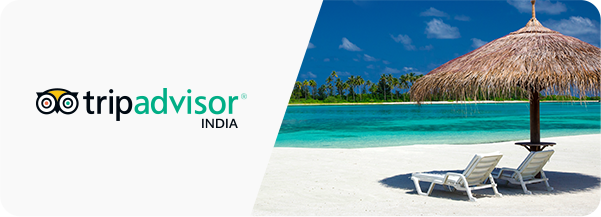
But despite being a popular medium, it often faces backlash due to fake reviews on its website. For instance, recently the Tripadvisor team suspended reviews of the 3-star victorian hotel “The Grand Hotel Scarborough” following an influx of review submissions from people who are not staying at the hotel.
Business Opportunities in the Online Travel Discussion Platform
Some rival businesses tend to bring the other one down and it is easier for a site like Tripadvisor to be a target. To build a successful marketplace like Tripadvisor, you need to ensure the marketplace stays authentic with minimal/zero false entries on your website. Hence, while creating such a marketplace, one should be fully prepared for the upcoming challenges. Here are some of the points that need to be taken care of.
Fraud Reviews
Review fraud is a well-known issue that these platforms face. Buying and selling reviews have become a common practice for listing owners these days. Fraud reviews affect the brand image as the audience loses trust in the marketplace resulting in reduced overall website traffic. To minimize such fraud instances, a dedicated team should be available to monitor the platform activities at all times.
Marketplace Security
Starting a marketplace such as Tripadvisor means providing travel bookings that include online payments once the traveler books and shares details on the website. Here, any kind of security breach would result in data or even payment theft, bringing your business down. Hence, to prevent security concerns, website development should be done in such a way that it gives priority to the safety of the customer and their data.
Personalization
Personalization provides a better experience and makes it more appealing to travelers. Changing to a customer-centric strategy leads to a considerable rise in website traffic as well as leads.
Competition
When you have knowledge about your competition you get to plan things beforehand. Developing a strategy for the market is the only way you can deal with the competition.
Travel Season
Season and time of the year are the most important things which have to be taken into account while traveling. People prefer to travel during the months of April-October, Christmas, and New year. For this reason, you should be ready for the highs and lows during vacations. A good marketing approach would be to attract people in the off-season through various discounts.
Maximize your Business Opportunities with a Reliable Marketing Approach
4. online travel adventures booking marketplace.
Traveling was never meant to be restricted to just sightseeing, trying different cuisines, and discovering museums. Often, many travelers wanted to undertake new adventures and focus on experiencing a city/country. This demand created an opportunity for business owners to invest in an adventure gear rental marketplace – a profitable business idea. While the essence of travel continued to evolve with the years gone by, the industry came to a premature halt during the pandemic. Now, amid the easing travel restrictions and the increasing interest of people in seeking adventures, adventure booking websites are gradually returning to normalization. People are looking for different destinations that offer unique adventures that they can undertake. For instance, places like Australia and New Zealand offer skydiving, cliff jumping, bungee jumping adventures whereas Turkey offers the subtle hot air balloon adventure, Costa Rica offers water rafting and the list is never-ending.
GetYourGuide, Viator, and Adrenaline Hunter are some of the popular adventure booking marketplaces online. Adventure booking websites have become immensely popular over the years and below is a graphical representation of its business model:
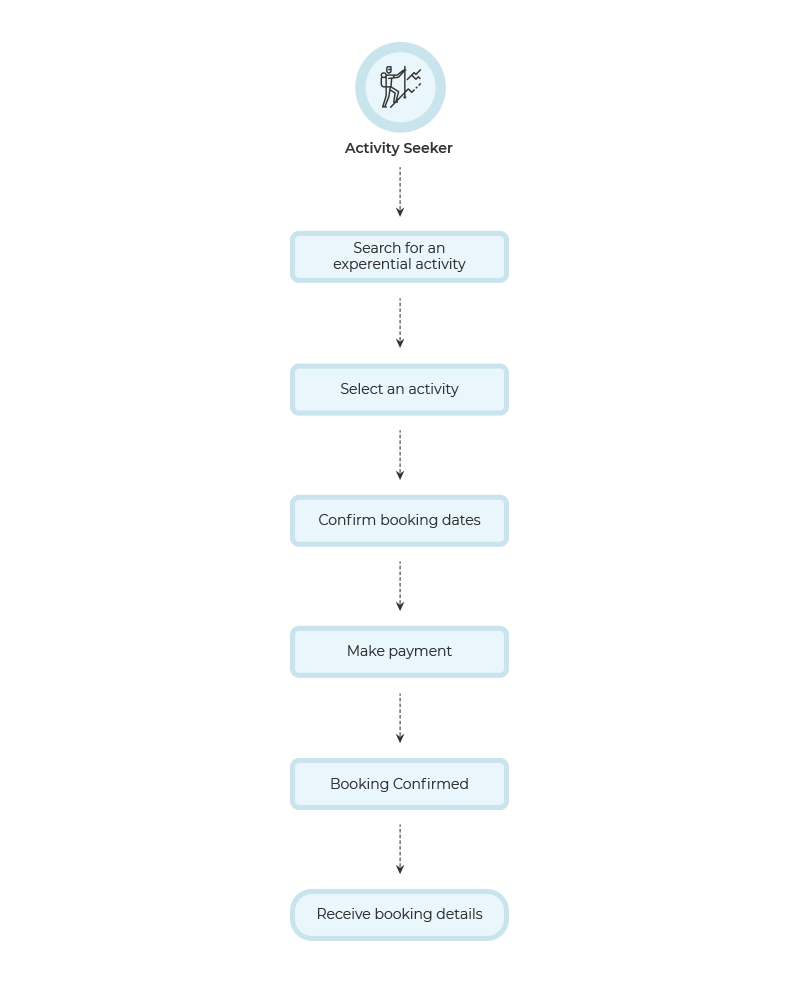
Current Status of Travel Adventures Booking Marketplace
The travel adventure industry is showing great signs of progress as customers seek variety and adventures post-pandemic as per the Forrester report. The adventure tourism market valued at $112 billion in 2020 is projected to reach an astonishing $1.1 trillion evaluation by 2028, growing at a CAGR of 20.1%, according to Allied Market Research.
Several tour operators utilized the time-off last year to devise creative Travel & Tourism Business ideas and be ready for the post-pandemic boom. For instance, Insight Vacations – a website offering premium tour guides, partnered with Anneka Manning – an Australian author and founder of cooking school Bake Club, to start a food-themed tour of Tasmania in October 2021. Similarly, a US tour operator smarTours collaborated with CVS – a US healthcare company to encourage vaccinations with a OneStepCloser sweepstakes.
Business Opportunities in Travel Adventures Booking Marketplace
The adventure travel trends build a positive outlook of the industry, creating an opening for travel adventure business to outshine in the coming years. The travel activity portal should be social media-friendly as people undertaking adventure activities share their experiences on social media leading to word of mouth marketing.
According to Stratos Jets statistics, around 70% of customers research for travel using their smartphones and it is estimated that around 700 million people will be making their travel bookings online by 2023. This makes mobile-friendly marketplaces and smartphone apps an integral part of travel business growth. Entrepreneurs in this business or planning to open a travel activity marketplace should make their websites robust and mobile-friendly.
You can hire a team of web designers and developers to build the website or can use an already existing system like FunAway – a turnkey online travel activity booking software that enables the host to connect with travelers and assist them. It provides features like calendar management, easy booking, social media signup, and more.
5. Online Bike Rental Marketplace
Sharing economy businesses have prospered over the years, especially after the emergence of Airbnb. The Peer-to-Peer (P2P) Bike rental marketplace is one such collaborative business idea where trusted bike owners connect with users looking to rent or borrow a bike. Renting a bike is extremely popular especially in cities where people commute daily amid traffic congestion. The business model of the bike rental marketplace works as such:

A bike rental website provides a platform for bike owners to make money by renting their equipment to potential rentees at a reasonable price. Also, the website admin earns via commission on bookings, premium listing fees, on-page advertisements, and other revenue channels on the marketplace. Spinlister is a prime example of such a marketplace.
Current Status of Bike Rental Marketplace
Amid the pandemic, cycling has emerged as a safer, healthier alternative to commuters. According to a report by The NPD Group , in April 2020, adult leisure bikes saw a significant jump of 121% in sales reflecting the growing consumer demand. The trend continues as the global bike-sharing service market size is estimated to reach from $3.3 billion in 2020 to $13.7 billion in 2026, as per Statista survey.
Business Opportunities in Bike Rental Marketplace
Urban policy and planning Journal – Cities, recently published a new paper citing the environmental benefits of bike-sharing services. The study says that bike-share travelers saved around 500 tons of emissions during the 2014-2017 period in NYC. As people become increasingly aware of the environment, the bike-sharing and rental industry is bound to prosper even further.
6. Start a Snorkeling and Diving Equipment Rental/Booking Business
Snorkeling is a popular underwater recreational activity where divers swim on the water’s surface facedown to relish the marine environment. Snorkelers require these equipment to breathe underwater. There are many diving lessons to learn about snorkeling equipment and swimming methods. It requires three pieces of equipment:
- A curved plastic tube called a snorkel , used for breathing underwater
- Mask to protect nose/face from water
- And Diving fins to swim
Diving equipment such as these is either sold or given on rent by the sellers in a snorkeling/diving equipment marketplace. Aqua-Lung, Cressi Sub, and Seavenger are among the industry leaders in the global snorkeling equipment market.
Current Status of Snorkeling Equipment Rental Business
With a contribution of around $11 billion in the US alone, the recreational scuba diving and snorkeling equipment market is poised for incremental growth, according to a report by the Diving Equipment and Marketing Association (DEMA). Also, Statista recently published a survey report that highlights that in the year 2017 US had approximately 8.38 million participants in Snorkeling activity. These numbers have grown substantially and will continue to increase even further as the travel industry rebounds.
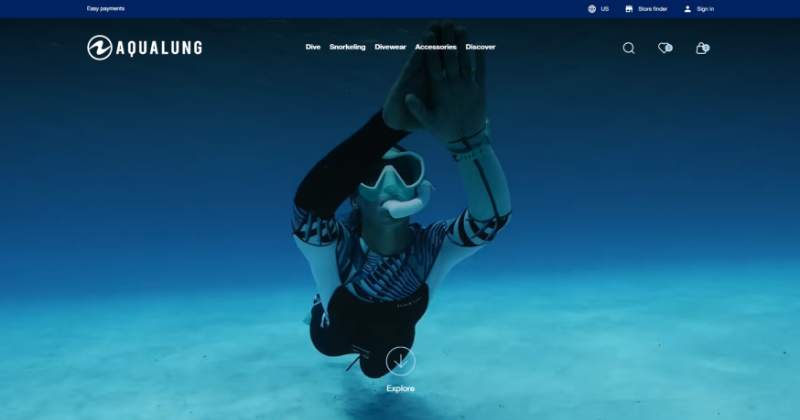
Business Opportunities in Snorkeling Equipment Rental Business
The popularity of recreational activities such as snorkeling has dramatically increased highlighting the need for a reliable snorkeling equipment marketplace. While there are a few leading manufacturers/suppliers of such diving equipment in the industry, online marketplaces are few and far between. Hence, it is an excellent opportunity for a business owner or an entrepreneur to invest in a snorkeling equipment marketplace (for rental or sale) by choosing the right travel & activity booking software.
7. Skiing Activity Booking/Rental Business
Skiing is another popular recreational activity as well as a competitive sport that attracts a lot of attention/tourists thanks to the Olympics. While people often viewed this as an extreme sport, new and promising marketplaces such as Liftopia (skiing and mountain activity marketplace) are changing this case by making Skiing more affordable and accessible to the average consumer.
The skiing activity booking marketplace connects users (skiers and snowboarding enthusiasts) to ski resorts around the world. Also, there are skiing equipment rental marketplaces where individual sellers offer skiing gear on rent or sale to the users. In both these instances, the marketplace admin earns a commission fee on every transaction.
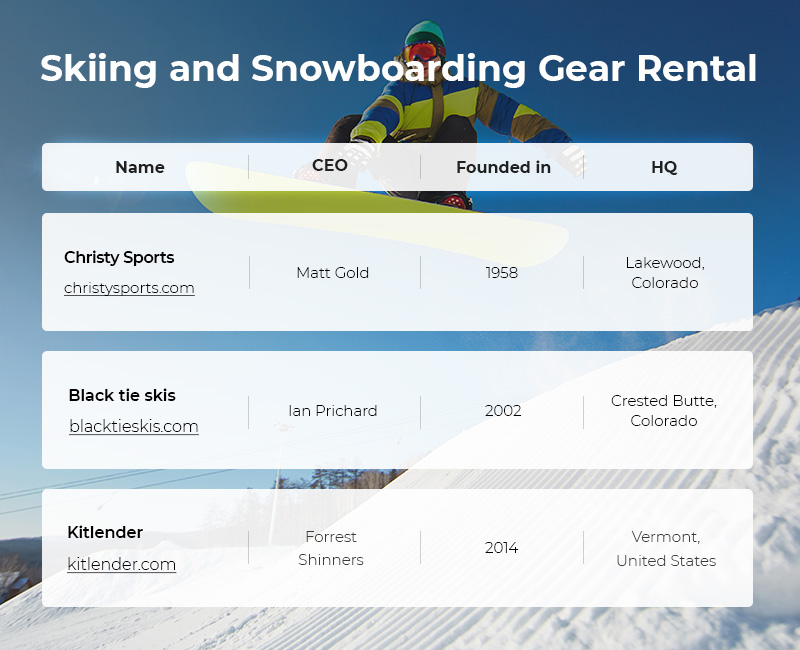
Current Status of Skiing Activity Rental Business
According to a recent Statista survey, there were around 9.2 million skiers and snowboarders in the US in 2018. This number has grown substantially over the years. Moreover, the market for ski gear and equipment has also increased. The global ski gear and equipment market is forecasted to reach $1.74 billion USD by 2028, as per another Statista report.
Business Opportunities in Skiing Activity Rental Business
While the Ski season is almost here, it will be the industry’s third operating season since the pandemic began. From mountain resorts to ski equipment providers, everyone is planning for the season. Despite the crisis, the Skiing industry is showing great signs of progress as users show a keen interest in such recreational activities around the world. This is why skiing activity booking and the rental marketplace is a popular business idea worth investing in.
Start an Activity Booking Marketplace with FunAway
8. start an online boat rental marketplace.
Boat rental is a thriving industry that saw a significant uptick in bookings last year even as the pandemic affected the tourism industry. Boats emerged as a safe, reliable means to travel and enjoy while safeguarding occupants from crowded areas. From everyday sailor boats to luxury yachts, boat rental continued to remain a highly profitable business with instrumental growth. There are 3 prominent activities driving the demand for boat rental business namely – cruising, watersports (such as jet ski racing and powerboat racing), and fishing.
Amid the surge in tourism and an increasing public interest in recreational activities, the boat rental market is expected to grow at a 4.71% compound annual growth rate (CAGR) reaching an estimated $25.8 billion by 2028.
Current Status of Boat Rental Marketplace
Boatsetter – one of the leading P2P boat rental marketplace delivered 15,000+ trips for over 60,000 customers in 2020. Similarly, GetMyBoat – another giant in the boat rental marketplace, achieved a 700% year-over-year (YoY) growth rate in 2021 recording an annual run rate (ARR) of over $158 million, as per the latest press release .
According to Bryan Petro, CEO of GetMyBoat, the boat rental industry experienced a 3900% increase in demand during the pandemic last year with an influx of first-time renters. This is despite tapping the full potential as there are travel limitations and lockdowns in many parts of the world.
Business Opportunities in Boat Rental Marketplace
The P2P boat rental business is a booming market that continues to see growth as promising new players such as Popey.co enter the market. It is a highly profitable business and is expected to see a surge in various regions of the world once travel limitations and restrictions ease. Moreover, the marketplace owner has a variety of revenue channels at its disposal such as rental commission, service fees, subscription plans, PPC campaigns, affiliate marketing, and more. Starting a P2P boat rental business is a good idea with great investment returns.
While the COVID-19 crisis ravaged the travel industry last year, it is showing signs of recovery as travel restrictions are removed. People are looking to travel more, seeking change and adventure. This has attracted hosts and startups alike to start an online travel business. But, before starting a travel marketplace, it is advised to devise a reliable business strategy, select an ideal tour & activity booking software, and identify the unique offerings that will provide your marketplace business with an edge over the competitors.
Looking to Transform your Online Travel Business Idea into Reality?

Want more insights to level up your knowledge?
We create future-focused content to help you stay updated. Follow us on Twitter to get notified about latest tips, trends and product updates.
Disclaimer: The Blog has been created with consideration and care. We strive to ensure that all information is as complete, correct, comprehensible, accurate and up-to-date as possible. Despite our continuing efforts, we cannot guarantee that the information made available is complete, correct, accurate or up-to-date. We advise - the readers should not take decisions completely based on the information and views shared by FATbit on its blog, readers should do their own research to further assure themselves before taking any commercial decision. The 3rd party trademarks, logos and screenshots of the websites and mobile applications are property of their respective owners, we are not directly associated with most of them.
Author: Sahil Verma
With a master’s degree in computer science, Sahil Verma shares his deep understanding of technologies through words. He is a passionate writer who loves to explore the IT sector and trends that define the industry dynamics. Apart from writing, he is an avid cricket and tennis fan idolizing Virat Kohli and Novak Djokovic.
Similar Posts
Launch travel question answer website with these unique script features, things an entrepreneur ought to know before planning a travel based start-up, all you need to know before launching a travel activity booking website, start your online business.
Online Heavy Equipment Rental Marketplace Business Model, Recent Innovations & Key Differentiators
Setting up an online grocery business in 2024 here is what you need to know, how to build an online language learning website like verbling– business model & key features, the startup guide to build an airbnb for car rental, how to market your online tutoring business, how to build a sauna rental website with readymade rental software, join our newsletter.
To receive our newsletter updates via email, enter your email address below.

Get Hold of Untapped Possibilities & Digital Trends
Signup for our weekly newsletter, new startup models | complete features list | industry news.
Starting a Travel Business: How to Become a Travel Agent
Briana Morgaine
17 min. read
Updated March 18, 2024
Free Download: Sample Travel Agency Business Plan Templates
If you’re someone who loves travel, meticulous planning, and helping others have great experiences, consider starting a travel business and becoming a travel agent.
After a sharp drop in international and domestic travel during the COVID-19 pandemic, air travel demand has returned to pre-pandemic levels.
Pent-up demand from families who put off trips is driving tourism activity even as fewer travelers cite the pandemic as a major concern. Those tourists are forecast to drive solid long-term growth in the worldwide travel and tourism industry – and plenty of business opportunities for those who can make vacation planning less stressful.
Becoming a travel agent can be fairly inexpensive, as business ventures go, and you can often get away with limited staff and little upfront cost.
That being said, success largely depends on finding the right niche in a fiercely competitive market, given the rise in online direct-to-consumer travel booking sites. So, if you want to be successful, you’ll want to focus a lot of your effort on your market research , branding, and marketing. You’ll need to know who needs your services—your target market—and what they’ll be willing to pay.
If this sounds right up your alley, keep reading. I’ve interviewed several founders of successful travel agencies for their advice on everything you need to get started, and I’ve also included plenty of links and resources to help you work through the process of starting your own travel business.
- 1. Create a plan for your travel business
Make no mistake: No matter what industry you’re in, a business plan is essential. You may not need a formal business plan if you’re not seeking a loan or investment funding for your business, but don’t skip it. Write a one-page business plan instead.
You can do it in less than an hour. Writing a business plan is scientifically proven to help you grow faster , so don’t skip this step.
What kind of travel agent are you interested in becoming? If you’re planning to be a home-based travel agent, you’ll want to look into finding a host travel agency where you’ll essentially be an independent contractor. If this is the type of travel business you’d like to start, the business planning process should be fairly straightforward.
However, if you’re looking into starting your own travel business from the ground up, you’ll be looking at a much more lengthy planning process—but you’ll also have more flexibility to build a business that’s all your own.
Brought to you by
Create a professional business plan
Using ai and step-by-step instructions.
Secure funding
Validate ideas
Build a strategy
A case for starting early
“In starting ADDISON Yacht Charters , we began market analysis and business planning efforts a full year before we launched the company in November 2013,” says owner Scott Bessette.
“During that period, we attended industry events such as regional yacht shows in the Virgin Islands, Antigua, Florida, and Monaco to acquire as full an understanding as possible with regards to what products and services were being delivered to the market, who was delivering those products and services, and who was purchasing those products and services,” he explains.
Starting the planning process early helped Scott hone in on his vision for his business. “In this manner, we determined what our market niche could be, and established whether or not we could compete in the existing market, and what it would take to succeed,” he says.
Scott was able to get a clear sense of where he wanted to take it, and how to tailor his business to best suit the market needs.
What kind of travel agent business plan will you need?
The kind of travel agency business plan you’ll need will vary depending on what kind of funding you’re looking for.
Are you hoping to eventually run a large travel agency, and interested in seeking a loan, or maybe investment from angel investors? You’ll want a formal business plan for a travel agency that contains all the necessary information on your business. Are you more interested in becoming a travel agent using your own savings, without seeking outside investment or loans? A more lightweight one-page plan might be a perfect fit for your business.
Even if you do intend to pitch your business idea to lenders and investors, you can start with a Lean Plan, and flesh out the rest of the info later on.
Whatever your specific reason for writing a business plan for your travel business, the most important thing is that you write one, period. The travel industry is fragmented , and having a clearly defined niche and a plan will help you stand out. Writing a business plan for your travel agency will help you narrow in on what your goals are, and establish a clear, focused vision going forward.
We’ve covered nearly every aspect of writing a business plan here on Bplans, so be sure to check out the links below when you’re ready to get started. We also have several travel industry business sample plans, which will give you an idea of what your business plan should look like.
Resources to help you create a business plan for a travel agency:
- How to Write a Business Plan
- Travel Agency Sample Business Plan
- 2. Conduct market research and find your niche
What kind of travel agency do you plan on starting? Moreover, what kind of travel business does the industry or your local community actually need?
“When you launch a travel business, the most important thing to do is to provide a valuable service,” says Jacquie Whitt, owner of Adios Adventure Travel .
This means doing some market research to find out what kind of travel agent or travel business the market really needs. Is there a niche you can fill? Maybe there’s an opening in the travel market to provide destination adventure honeymoons for young couples who would rather go backpacking than relax on the beach. Think about the people in your local community too—do they need something specific?
“In a saturated luxury travel market, Urbane Nomads had to distinguish itself from more seasoned players from the get-go,” says founder Hajar Ali. “The dual elements of adventure and luxury was an unexplored niche which we filled very well.”
Hajar says of Urbane Nomads: “It was conceived as the kind of travel company that would remain relevant in the age where most travel-related bookings are made online. We specialize in the sort of experiences that can’t be booked online—adventurous trips to non-mainstream destinations, lodges that can’t be booked online—or indeed, by non-travel professionals—and special experiences and access to personalities that would have been impossible without the personal connections.”
What niche are you filling? Start by researching the travel market in general. Find out who the major players are that you’ll be competing against, determine who your ideal customer is, and define what they want.
Resources to help you do market research and determine your niche:
- Practical Market Research Resources for Entrepreneurs
- How to Do Market Research
- How to Create a Unique Value Proposition
- How a Buyer (or User) Persona Can Improve Your Business
- What Is Target Marketing?
- 3. Develop a brand as a travel agent
Once you’ve determined what the market looks like and what specific niche you’ll be filling, it’s important to get down to the nitty-gritty of creating a strong brand image .
As the travel industry is so competitive, having a well-developed brand will help your business stand out. How do you want your customers to feel when they visit your website, view your advertising, or use your services?
Lorne Blyth, Founder and Director of Flavours Holidays, had a very specific vision for her brand. “[At Flavours Holidays], we have been specializing in cooking, Pilates, painting, photography, and language holidays in Italy since 1998,” she says. Lorne’s vision was to create a brand that “gave guests a true taste of Italy.”
“I use that as part of my branding, as we would like to perceive ourselves as being experts on all things Italy,” says Lorne. “That is why our tagline is ‘Passionate, Inspiring, Authentic.’”
Why should customers use your services, rather than just book a trip themselves? What experience can you provide that others can’t?
Do you offer unique services, such as partnerships with the locals of your travel destinations, that customers wouldn’t have access to otherwise? Is your selling point the ease of having someone else plan your trip for you, down to the last detail? Are you all about personal touches and a great customer service experience?
This is the first step to determining your travel business’s brand strategy— determining who you are. We’ve gone in-depth on how to build a memorable brand for your business, so check out the articles below for more information on branding.
Resources to help you brand your travel business:
- The Definitive Guide to Building a Brand
- Your Brand’s Tone of Voice: Why It Matters and How to Craft It
- 4. Deal with the legal side
A travel business is, for the most part, a fairly simple one to set up. Unlike starting a brewery or starting a dispensary , there isn’t a lot of legal red tape when it comes to becoming a travel agent and starting a travel business.
Determining if you’ll require licensing
In most locations, you won’t need any specific licenses or certifications, but licensing requirements will vary by state and country.
For the U.S. in general, there is no specific license needed to start a travel business; however, state laws vary . In California, Washington, Hawaii, Iowa, and Florida, you’ll need a Seller of Travel license. Canada also has licensing requirements that vary by location, and in the U.K., you’ll need an Air Travel Organiser’s License .
Choosing the structure of your travel business
Beyond specific licenses, there are general licenses that you’ll need before you start any type of business.
First off, choose your business structure . Scott Bessette, owner of ADDISON Yacht Charters, started his travel agency as an LLC , which he says suited his business needs. “Before we considered starting our agency, we determined that a Limited Liability Company was the appropriate structure for what we were trying to achieve.”
Why was an LLC the best choice? “We had no intention of going public, or having to secure formal investment,” he says. “Further, we had a very simple organization structure, so ease of governance and compliance drove our choice of corporate structure.”
However, the business structure you choose will depend largely on your plans for your business, and how you intend to fund it. If for example, you plan to seek outside investment, you may want to look into starting your business as a corporation .
Naming your business and applying for a Federal Tax ID number
You’ll also want to formally name your business (even if it’s just you, becoming a travel agent!), which involves filing a DBA , or a “doing business as.” You’ll also need to apply for a Federal Tax ID number , otherwise known as a Federal Employer Identification Number (EIN or FEIN). We’ve covered these topics in plenty of detail, so be sure to check out the links.
Scott also adds that setting up the legal end of things was fairly simple.
“Establishing the legal and licensing requirements was one of the easiest aspects of starting the business,” he explains. “All said, conception and gestation of ADDISON Yacht Charters was long-term, but she was born after only two days of hard labor.”
Resources to help you determine the legal structure and name for your business, as well as other legal considerations:
- The Complete Guide to Choosing Your Business Structure
- The Complete Guide to Registering Your Business Name
- Resources and Tools to Help You Name Your Business
- How to Apply for a Federal Tax ID Number
- How and Where to Obtain Business Licenses and Permits
- Keep Your Startup Safe from Legal Trouble
- 5. Determine your funding strategy
How do you plan to fund your new travel business?
Luckily, your starting costs should be fairly low: You won’t have expensive equipment to buy, and you probably won’t need extensive space in the beginning. If you’re hoping to become a travel agent working out of your own home, you may not even need office space at all.
However, be sure to have a plan in place for how you will obtain funding. You’ll need funds for marketing materials at the very least; both online, such as your business website , and offline, such as flyers, posters, business cards, and more . Your initial funding budget will also likely go toward any branding or advertising, and you may eventually also decide to rent office space and hire employees, which is a fairly large expense.
Unlike many businesses, there isn’t one tried-and-true path for funding a travel business. From personal funds to venture capital funding, it’s all a possibility.
Many travel agencies are self-funded since they have low initial overhead and can be started fairly easily (though face stiff competition to stand out). “I didn’t get any funding at all, apart from $2,000 borrowed from my dad for the website,” says Brady Hedlund, founder of Life Before Work.
Looking into loans and a line of credit is also a good first move. “We developed banking and relationships with firm lines of credit and support, to ensure that as we started to deliver, funds were available to spend before the client paid the bill,” says Scott of ADDISON Yacht Charters. “ Cash flow is critical to the appearance of a business’s success.”
However, when it comes to financing your travel business, angel investment, and even venture capital funding isn’t completely out of the question. “We formed an LLC to start Project Expedition and closed a $300k seed round in January 2015 to help drive the development of our MVP (minimum viable product),” explains founder Jeremy Clement.
Don Halbert, owner of Costa Rica Vacations , also funded his travel agency through venture capital. “Funding for this venture came from a venture capital company which would later become one of our primary partners,” he explains.
Resources to help you with the funding process:
- How to Get Your Business Funded
- 35 Great Ways to Fund A Small Business
- What Do Venture Capital Firms Want?
- 10 Tips for Finding Venture Funding
- 6. Choose a location and hire employees
Next, you’ll want to make a plan for the logistics of opening your travel business to the public. If you’re starting a travel agency and require office space, this section will likely be more relevant than if you plan to work as a travel agent out of your home.
How many employees will you need to hire? You may not need any to start, until you decide to expand your operations.
You might also want to look into remote employees , suggests Mike Liverton, CEO and founder of Leavetown Vacations . “While many company employees live and work as home-based ‘Destination Experts,’ our main headquarters are downtown Vancouver,” he says.
Additionally, you’ll want to determine your business location . While foot traffic will likely not be a primary motivator in choosing a business location, you’ll want to pick somewhere that accommodates your space needs as well as reflects your desired brand image.
However, as with employees, you’ll find that a physical location isn’t always an absolute necessity. “We have never booked a client from our hometown,” says Scott.
“We’re a 24/7 business, that cannot be limited to when I am in the office, or more importantly, marginalized when I am not,” he explains. “The ADDISON staff has families, conflicts, and important events in their lives. We constructed and positioned our business to be virtual in nature; to be operational anywhere, anytime. I’ve conducted business from Europe, the Caribbean, from multiple states, and during my children’s sporting events.”
“We didn’t choose our business location, we chose a virtual location,” he adds. Whether or not you choose to go this route will depend on your specific niche and brand; however, it’s certainly an option to consider.
Resources to help you set up your travel business and hire employees:
- How to Choose a Business Location
- 13 Out of the Ordinary Ways to Find the Perfect Business Location
- How to Hire Your First Employee
- A Comprehensive Guide to Creating a Business Website
- 7. Market and launch your travel business
Marketing will likely be where the majority of your initial funding budget goes, as it’s an important area to focus on when becoming a travel agent and starting a travel business. In fact, it’s a good idea to come up with a marketing plan as soon as possible.
For Don, the idea that you must spend money to make money drove the marketing strategy behind Costa Rica Vacations.
“Our ‘lesson learned’ in starting up our agency was primarily the realization that your Google Adwords budget can single-handedly determine your success when starting out in this normally competitive market,” he says.
Don’t make the mistake of thinking that all your advertising efforts should revolve around paid advertising, however. Plenty of your focus should go into social media marketing and guerrilla marketing tactics.
“I started out eight years ago running backpacking trips to Thailand, advertising using only lean, guerrilla marketing tactics,” says Brady Hedlund of Life Before Work. “I created an itinerary and website and hit the streets of western Canada to promote my new company.” Since his target demographic was 18-30-year-olds looking for an ‘adventure party tour,’ he went to university campuses and handed out flyers and posted signs advertising his travel agency.
“I didn’t get a single call for over a year,” he explains. “I honestly had no idea what I was doing at the time, but eventually, the business picked up and began to grow at an exponential rate. Flash forward eight years, and we now have a team of 35 full-time staff operating in 18 countries.”
Your marketing strategy will, as with all aspects of starting a travel business, be largely dependent on your specific niche, the demographic you are after, your budget, and your bandwidth as a business. That being said, combining both paid advertising with other guerrilla tactics (both online and offline) will likely serve you well.
Resources to help you market and launch your travel business:
- How to Write an Effective Marketing Plan
- 20 Marketing Tools Every Small Business Owner Should Try
- A Beginner’s Guide to Google AdWords for Small Business
- How to Have the Best Opening Day Ever
- Words of advice: Final tips from entrepreneurs who have started successful travel businesses
- “We searched for quite some time to find an underwriter that would provide us with general liability insurance, due to the amount of risks involved in adventure travel…This is a tricky product when it comes to insurance, but it’s obviously a very important piece of the pie.” – Brady Hedlund, Life Before Work
- “From the beginning, I have built up relationships with various individuals in Italy to help recruit staff for the villas used during our vacations. This varies from local cooks to tour guides to drivers. The little touches along the way, from booking flights for guests to getting the transport back to the airport, all adds up as every little bit helps to create the perfect experience for my guests.” – Lorne Blyth, Flavours Holidays
- “It’s important that your business partners share your values. I work with people in South America who are now my friends. We’re not in it for the money; we enjoy our jobs and if we can ‘eke’ out a living, all the better.” – Jacquie Whitt, Adios Adventure Travel
Business plan template and travel agency resources
By now it should be clear that starting a travel agency requires a strategic approach and lots of planning. But don’t worry if it feels overwhelming. At Bplans, we have a full library of business planning resources to help you get started. You can browse through our free collection of over 500 real business plan examples , or download our free business plan template to help your travel business take flight.
Bri Morgaine is a seasoned content marketing leader with a decade of experience in copy editing, social media operations, and content strategy— having honed her skills at industry giants like Palo Alto Software and Andreessen Horowitz.

Table of Contents
- Business plan template and travel agency resources
Related Articles

11 Min. Read
How To Start and Grow Your SEO Business

6 Min. Read
5 Things to Consider When Opening a Car Dealership

8 Min. Read
How to Start a Food Truck

How To Transition From Corporate To Consultant and Win Your First Client
The Bplans Newsletter
The Bplans Weekly
Subscribe now for weekly advice and free downloadable resources to help start and grow your business.
We care about your privacy. See our privacy policy .

The quickest way to turn a business idea into a business plan
Fill-in-the-blanks and automatic financials make it easy.
No thanks, I prefer writing 40-page documents.

Discover the world’s #1 plan building software
How to Become a Travel Agent—Because, Believe It or Not, the Industry Is on the Rise
By Scott Bay

There’s a reason “how to become a travel agent” has been a continuously trending search phrase on Google—it is a career path that offers a flexible work environment and schedule, ample travel opportunities, and an immersion into a supportive world-wide industry. It's a surprise to some in 2023: Once the internet became widely available, it was largely believed that needing a travel agent was obsolete. However, even though the brick-and-mortar agencies with punny names in strip malls have vanished, the career is on-the-rise .
New software options are making it easier than ever for people to make money planning trips, either as a side hustle or as a full-time business. That’s why Cherikonda, India-based stay-at-home mother, Maya Kapoor-Miller, decided to enter the professional world as a travel agent this year, at 31. “I knew nothing about the travel industry prior to signing up,” says Kapoor-Miller, who decided to use San Francisco-based booking platform Dreamport to establish her online travel advisor business. “It is my first business in life, and the only one that you can start with no investment.”
But there's also a rise in demand. When people ventured back into the world after the pandemic, travel agents saw an overwhelming amount of business . And that momentum hasn’t stopped—when travel is complicated, like it was in 2020 and 2021, travelers turned to professional trip planners to create a seamless vacation. For better or worse, traveling has remained complicated and chaotic, with new rules being implemented (like Americans needing to pay a fee to visit Europe in 2024 ) and airline strikes and staffing issues. Offloading all of the nitty-gritty details to someone else is more appealing than ever.
For those entering the field, there's also the age-old motivator: a love of travel.
Shelton Ellis, who is based in North Carolina, recently saw these opportunities and left behind more than 20 years in public relations and global advertising to turn his passion into a career. “I was born with a wanderlust that would wear Rick Steves out,” Ellis says. “I decided to take the leap and follow that lifelong yearning. Transitioning into this role was really about learning how to monetize what I'm passionate about.”
Whether you are looking for a new career path or a lucrative side-hustle—or simply curious about those taking the plunge—here’s how to become a travel agent, from the qualifications and education required, to anticipated earnings, according to those who have made the shift in the past year.
What exactly does a travel agent do?
Travel agents, or travel advisors (the term is mostly interchangeable), manage everything that goes into a trip for their clients: the flights, car transfers, accommodations, restaurant reservations, and more—they even inspire the itinerary. The reason people turn to travel agents, aside from having a helping hand during any travel chaos , is also to tap into the travel agent’s first-hand knowledge of destinations, and their industry partnerships, which often lead to perks such as hotel upgrades, ideal airplane seats, and experiences that can’t be found on a search engine.
“You have to remember that as a travel agent, you will be a guide for people during their happiest moments—family reunions, weddings , baptisms, and once-in-a-lifetime experiences that people have dreamt of,” says Kapoor-Miller. “It has been one of the most rewarding aspects of being a travel agent. You navigate people, inform them, and help them choose.”
So, how do you become a travel agent?
There are many ways to become a travel agent, from joining an existing travel agency , to starting an independent business from the ground up. Others are opting for one of the buzziest start-ups in the travel industry, Fora . When it launched in 2021, the software company, which trains and provides search engine-optimized profile pages to advisors—at one point had a waitlist of over 30,000 people eager to begin a part-time gig. Travel photographer and Condé Nast Traveler contributor Amanda Villarosa is currently in the process of joining.
“I'm the person that friends and family come to for travel recommendations, tips and tricks, and general travel advice,” says Villarosa. “After discovering Fora and looking into it, I realized that it could be the perfect side-hustle, considering I'm already so involved in the industry.”
With additional flexibility, Villarosa was able to move from New York City to splitting her time between Denver and Los Angeles . She says that the sign-up was quite straightforward. “You're given a dedicated Fora email and have access to advising tools and fellow Fora advisors,” she says. “The training is in the form of Zoom meetings and videos, which you have the option to watch at your own pace. Once completed, you take a certification quiz and you're on your way to advising.”
The other ways in are slightly more involved. To begin an independent practice, you go about it like many other businesses. You will have to create an LLC, establish a business name, cultivate marketing materials, build a website, find clientele, and more.
Ellis found something in the middle, choosing to connect with an established travel agency. “Don't be afraid to reach out to an agency looking to take on new advisors and is willing to mentor," says Ellis. "I was fortunate to learn so much from Annie Chambers, the owner of Crafted Escapes , who has seven years in the business.” He now knows the ropes on everything from using itinerary-building software to destination-specific training, to the sales and marketing aspects of the trade.
Is there required education or qualifications?
Ellis says that there's no certification, per se, required to become a travel advisor, but there are countless training courses available like Departure Lounge ’s classes on navigating the industry through hotels and tour operators. He said it’s also important to stay on top of travel trends. Ellis recently completed travel agent training programs provided by premier cruise lines such as Virgin Voyages , Ritz-Carlton Yachts , and Cunard to help agents sell their products more accurately.
How much does a travel agent make?
What a travel agent earns depends on how many trips they successfully book for their clients. The entire model is commission-based, meaning agents earn a percentage of the total cost of the vacation they orchestrate. Many travel advisors choose to charge a flat-rate planning fee in addition to their commission, but balance is key—if you charge a high planning fee, it could lead to potential clients going elsewhere.

By Olivia Morelli

By Tony Perrottet

By Jahnavi Bhatt

By Federica Bocco
Fora ’s website states that “some of our full-time, expert advisors earn well into the six figures (or beyond).” So a lucrative career may be on the horizon, for those who are able to build a robust client base and excellent industry connections.
How much you make can also depend on where you live around the world. “I am being paid in dollars,” says India-based Kapoor-Miller. “So the currency fluctuations of the local exchange rate are not something I am worried about.”
What are the key skills required to become a travel agent?
“Travel agents need a mix of customer service, communication, destination knowledge, organizational, and problem-solving skills,” says Kapoor-Miller. “But I would say that adaptability, flexibility, curiosity, and cultural sensitivity top them all—you have to put yourself in other's shoes, and understand the requirements, hopes, and expectations of your clients along with any worries and questions they may have.”
It’s vital to have a passion for traveling, even the aspects of the process that aren’t as exciting, such as learning about new airline routes, train schedule updates, and industry news. “It can be an information-heavy hustle, and I believe it's important to be excited about it as that energy definitely transfers to your clients and partners,” Villarosa says.
Should travel advisors choose a specialization?
Many travel advisors have found success through becoming an expert in a few types of travel and destinations. “It's important to become an authority and learn as much as you can through personal experiences and continuing education,” says Ellis. “As a proud member of the LGBTQIA+ community , an avid snow skier, and scuba diver, I know not only the popular destinations but others that are off the beaten path, equally safe and adventurous for all travelers.” This helps travel agents establish a competitive edge, and hopefully convince potential clients to choose them for their expertise.
What are the benefits of being a travel agent?
“Flexibility tops them all,” says Kapoor-Miller. “And the ability to start without industry knowledge. If you worry that you are too old for this job, the good news is that this is a job you can enter and enjoy at any age.”
Another great perk is the "Familiarization trip,” says Ellis. “Tourism boards and hotels invite agents to visit and familiarize themselves with a particular country and its properties. After all, any accomplished salesperson should learn everything they can about their products first-hand...even if they're in Bora Bora.” It's hard work, but someone's got to do it.
By signing up you agree to our User Agreement (including the class action waiver and arbitration provisions ), our Privacy Policy & Cookie Statement and to receive marketing and account-related emails from Traveller. You can unsubscribe at any time. This site is protected by reCAPTCHA and the Google Privacy Policy and Terms of Service apply.
We earn commissions if you shop through the links below. Read more
Travel Agency
Back to All Business Ideas
How to Start a Travel Agency
Written by: Carolyn Young
Carolyn Young is a business writer who focuses on entrepreneurial concepts and the business formation. She has over 25 years of experience in business roles, and has authored several entrepreneurship textbooks.
Edited by: David Lepeska
David has been writing and learning about business, finance and globalization for a quarter-century, starting with a small New York consulting firm in the 1990s.
Published on December 13, 2021 Updated on May 23, 2024

Investment range
$2,150 - $10,600
Revenue potential
$78,000 - $300,000 p.a.
Time to build
0 – 3 months
Profit potential
$62,000 - $90,000 p.a.
Industry trend
Who doesn’t love to travel? But most of us do not love the endless research, planning, and booking required, which sometimes feels like it takes more time than the vacation itself. This is precisely why the $35 billion US travel agency industry has been booming of late, and why it offers a real opportunity for the travel-minded entrepreneur.
By starting your own online travel agency, you can shoulder travelers’ burden and ease their anxiety, allowing them to enjoy their holiday while you make a healthy profit. And thanks to the post-pandemic boost, now is a great time to get in on travel.
Of course, starting a travel agency will not be a vacation – it will take diligence, patience, and strong guidance. Thankfully, you’ve come to the right place, as this step-by-step provides all the information you need to develop and launch your new travel agency and give you a head-start on your entrepreneurial journey.
Step by Step Business values real-life experience above all. Through our Entrepreneur Spotlight Series , we interview business leaders from diverse industries, providing readers with firsthand insights.
Uncover the secrets to building a thriving travel agency with our interview with Casey Halloran of Costa Rican Vacations .
Aspiring travel entrepreneurs will find valuable insights in our interview with Augustin Ndikuriyo on building a thriving African wildlife tour business .
Looking to register your business? A limited liability company (LLC) is the best legal structure for new businesses because it is fast and simple.
Form your business immediately using ZenBusiness LLC formation service or hire one of the Best LLC Services .
Step 1: Decide if the Business Is Right for You
Pros and cons.
Every business has its pros and cons, and a travel agency is no exception. You should weigh these carefully to decide if the business is right for you.
- Flexibility – Work from anywhere, even while traveling!
- Minimal Training – Get accredited for free online
- Travel Discounts – Travel agents get top deals and reduced prices
- Demanding Work – With clients around the world you’re on call 24/7
- Fierce competition – Top sites like Expedia, travel networks, advisors, and more
Travel agency industry trends
The US travel agency industry expanded an impressive 75% in the decade leading up to 2020, which saw a massive pandemic-driven downturn.
In 2021, many travel agents saw a surge in business as travelers unsure of all the constantly changing Covid-19 rules and restrictions turn to them for help, rather than booking their own trips. Global travel advisor InteleTravel experienced a 35% increase in business, not from the disaster year of 2020, but from 2019, which had set records.(( https://www.nytimes.com/2021/04/14/travel/summer-vacation-travel-agents.html ))
Consumers are also turning more and more to online travel agencies, with a study by Expedia showing a 25% increase in the use of online agencies in 2020 alone. Brick-and-mortar agencies seem to be a dying breed, with British travel icon Thomas Cook closing in 2019.(( https://advertising.expedia.com ))
Industry size and growth
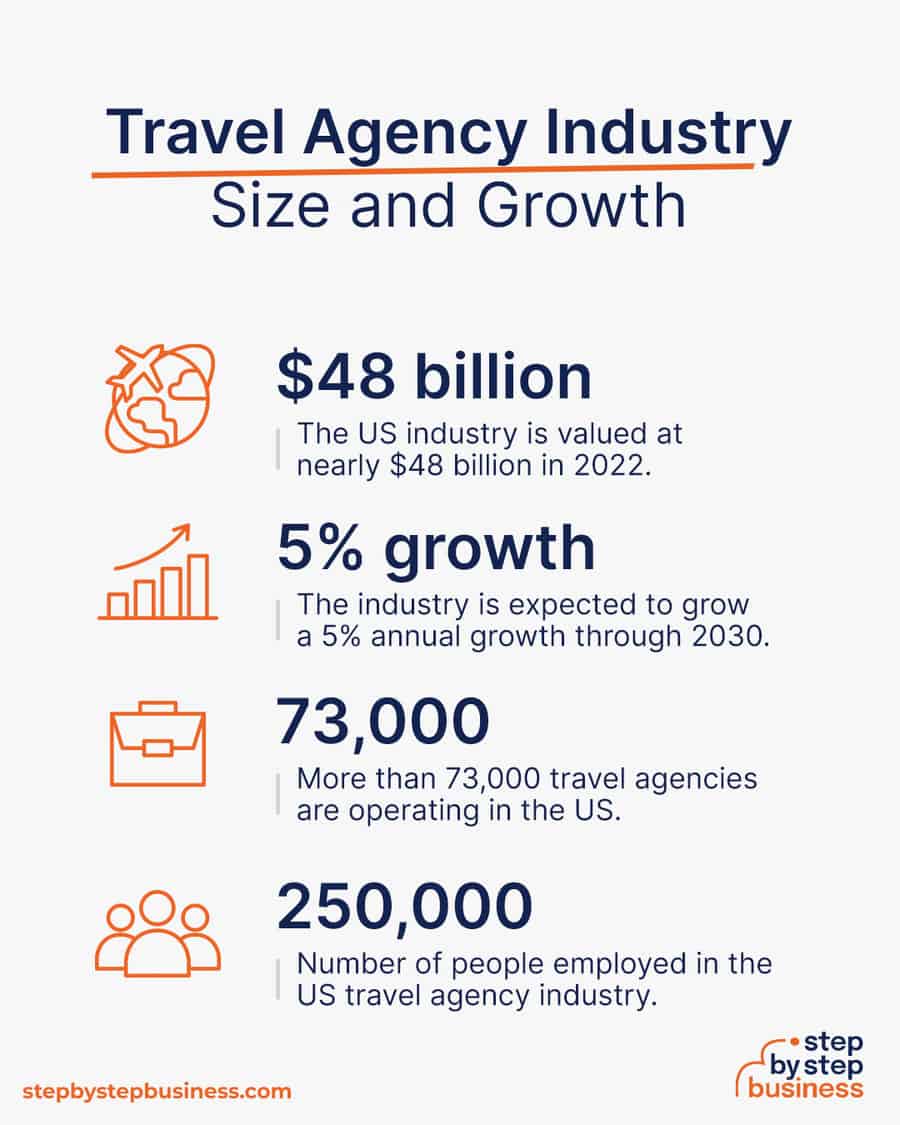
- Industry size and past growth – Market research firm IBISWorld values the industry at nearly $48 billion in 2022.(( https://www.ibisworld.com/industry-statistics/market-size/travel-agencies-united-states/ ))
- Growth forecast – The industry is expected to grow further as the Bureau of Labor Statistics predicted a 5% annual growth through 2030 in the employment of travel agents.(( https://www.bls.gov/ooh/sales/travel-agents.htm ))
- Number of businesses – More than 73,000 travel agencies are operating in the US.(( https://www.ibisworld.com/industry-statistics/number-of-businesses/travel-agencies-united-states/ ))
- Number of people employed – The industry employs more than 250,000 people.(( https://www.ibisworld.com/industry-statistics/employment/travel-agencies-united-states/ ))
Trends and challenges
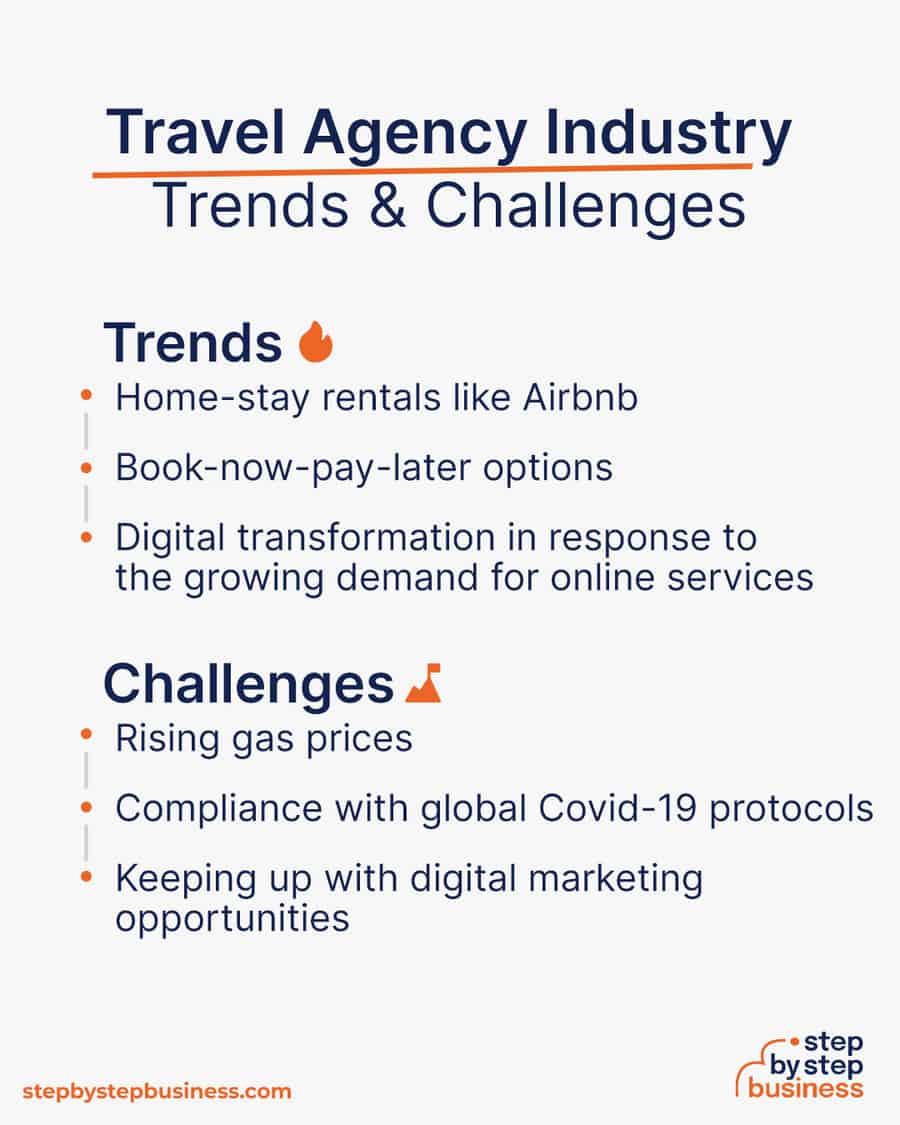
Trends in travel agency industry include:
- Home-stay rentals like Airbnb(( https://stepbystepbusiness.com/business-ideas/start-an-airbnb-business/ )) outperformed hotels in 27 top markets during the pandemic
- Book-now-pay-later options, such as those offered by Expedia and Booking.com, are gaining popularity
- Travel agencies undergoing digital transformation in response to the growing demand for online services
Challenges in travel agency industry include:
- Rising gas prices are impacting travel behavior
- Compliance with global Covid-19 protocols
- Keeping up with digital marketing opportunities
What kind of people work in a travel agency?
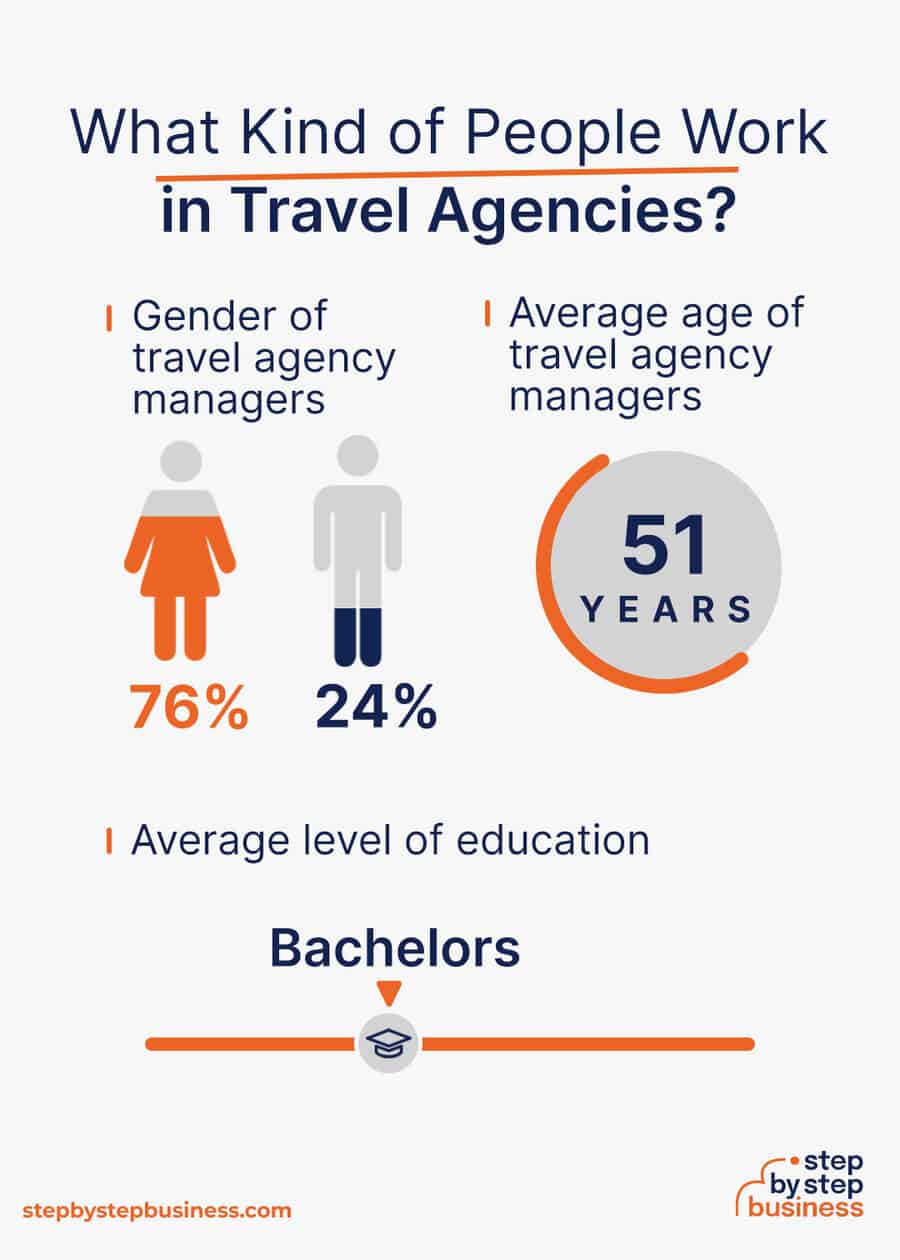
- Gender – 76% of travel agency managers in the US are female, while 24% are male. (( https://www.zippia.com/travel-agency-manager-jobs/demographics/#gender-statistics ))
- Average level of education – 64% of travel agency managers hold a bachelor’s degree.(( https://www.zippia.com/travel-agency-manager-jobs/demographics/#degree-level-types ))
- Average age – The average age of a travel agency manager is 51 years old.(( https://www.zippia.com/travel-agency-manager-jobs/demographics/#age-statistics ))
How much does it cost to start a travel agency?
The startup costs for a travel agency range from about $2,000 to $10,000, with an average of around $6,000. The high-end includes the rental of office space and a larger marketing budget, but you could easily run your online travel agency from home to cut costs.
How much can you earn from a travel agency?
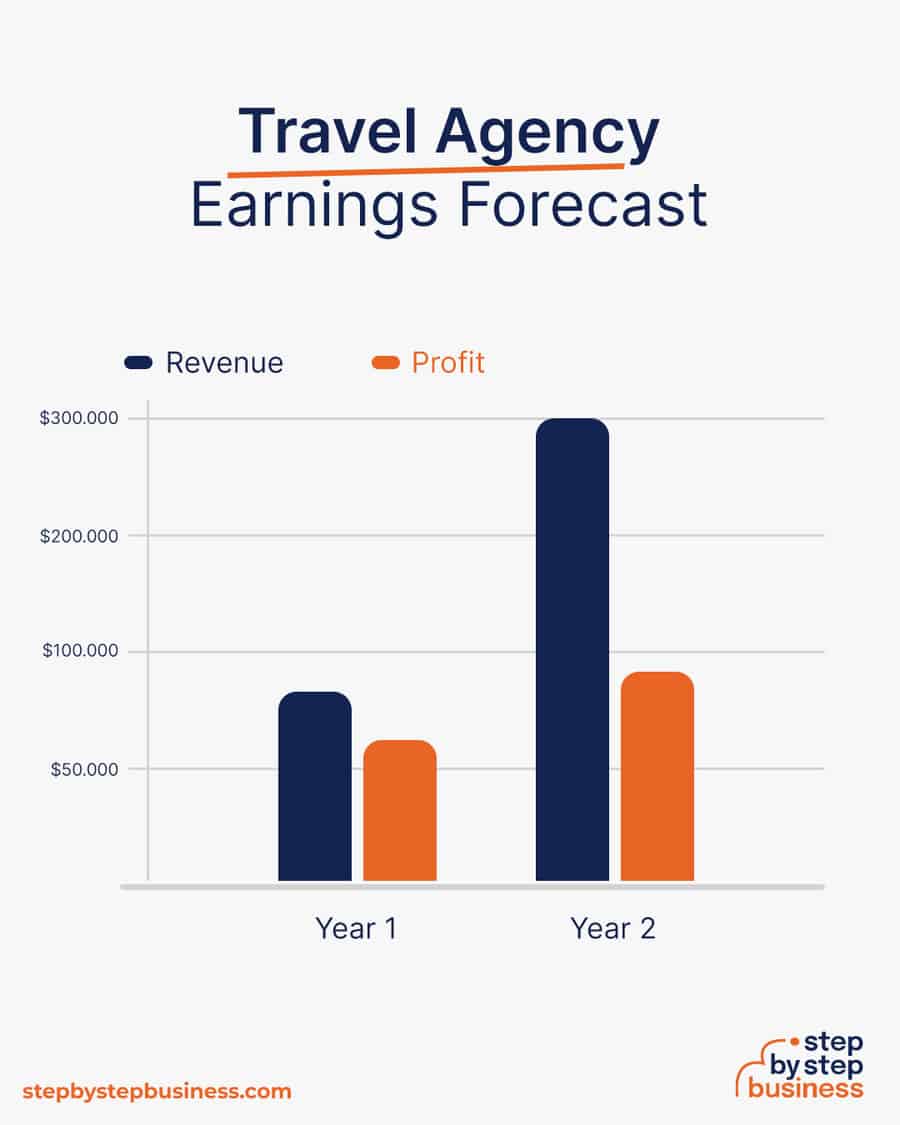
The commission paid to a travel agency by travel vendors such as airlines and hotels is generally about 10%. Some travel agents also charge a nominal consultation fee for each booking, typically between $30 and $50. Those will be your two revenue streams.
The average cost of a one-week domestic vacation is $1,500 per person. The profit margin for a home-based travel agency is usually about 80%. With an office and staff, your margin will likely drop to about 30%.
In your first year or two, you could work from home and sell five two-person vacations each week. At a 10% commission, this would mean $78,000 in annual revenue. You’d have about $62,000 in profit, assuming an 80% margin.
As your brand gains recognition, sales could climb to 1,000 two-person vacations a year. At this stage, you would rent an office and hire staff, reducing your profit margin to 30%. With expected annual revenue of $300,000, you would make about $90,000.
What barriers to entry are there?
There are a few barriers to entry for a travel agency. Your biggest challenges will be:
- Competition – Big and small online firms; self-booking travelers
- Client Acquisition – Time and marketing will be required to build a reputation
Related Business Ideas

How to Start an Airbnb Business

How to Start a Bed & Breakfast

How to Start a Glamping Business
Step 2: hone your idea.
Now that you know what’s involved in starting a travel agency, it’s a good idea to hone your concept in preparation to enter a competitive market.
Market research will give you the upper hand, even if you’re already positive that you have a perfect product or service. Conducting market research is important, because it can help you understand your customers better, who your competitors are, and your business landscape.
Why? Identify an opportunity
As a travel agency, you need to find a way to differentiate yourself from the competition. Research online travel agents and booking platforms to see their offerings and prices, while keeping an eye out for something that might be missing.
Perhaps you could specialize in travel to an under-appreciated region, such as Southeast Asia, and build a network of relevant contacts and vendors. Or you could focus on finding travelers the most incredible home-stay rentals at the best prices.
You could specialize in family vacations, corporate retreats, or honeymoons. The potential niche options in the travel industry are nearly endless.
What? Determine your services and travel offerings
Travel can involve many facets, and you can handle some or all of them, in addition to flights, lodgings, and car rentals. These might include:
- Booking tours and excursions
- Dining recommendations/reservation
- Travel insurance
- Visa and emergency services
How much should you charge for travel agency services?
Travel vendors, such as hotels, airlines, and car rental firms, pay a commission to travel agents that’s generally about 10% of the booking. For instance, if you book a $1,200 flight on Turkish Airlines for your client, Turkish Airlines will give you, the travel agent, a $120 commission.
As a result, booking flights with a travel agent sometimes costs the traveler slightly more than booking directly with the airlines or through a travel site like Expedia or Orbitz. Thus, to attract customers and boost sales travel agents rely on discounted travel packages.
For instance, a return flight from Chicago to Cancun and a 6-day stay at a four-star all-inclusive resort, plus ground transport, might cost a traveler $1,000 or more to book directly. But travel agents get significant discounts from vendors because they place volume orders, so you’d be able to offer this trip as a $599 package deal.
Even after paying your commission, the traveler still saves a chunk of money by using your services, rather than booking themselves. And keep in mind, the discounts offered by vendors are likely to increase as you become a more established agent. You may be able to negotiate commissions from tour operators and excursion companies as well.
Once you know your costs, you can use this Step By Step profit margin calculator to determine your mark-up and final price points. Remember, the prices you use at launch should be subject to change if warranted by the market.
Who? Identify your target market
Your target market will depend on the concept you’ve chosen for your agency. If you’ve decided to specialize in family vacations, you’ll be targeting parents. You might find them on sites like Facebook or LinkedIn, rather than Instagram or TikTok.
Where? Choose your business premises
In the early stages, you may want to run your business from home to keep costs low. But as your travel agency grows, you’ll likely need to hire workers and may need to rent out an office. You can find commercial space to rent in your area on Craigslist , Crexi , and Commercial Cafe .
When choosing a commercial space, you may want to follow these rules of thumb:
- Central location accessible via public transport
- Ventilated and spacious, with good natural light
- Flexible lease that can be extended as your business grows
- Ready-to-use space with no major renovations or repairs needed
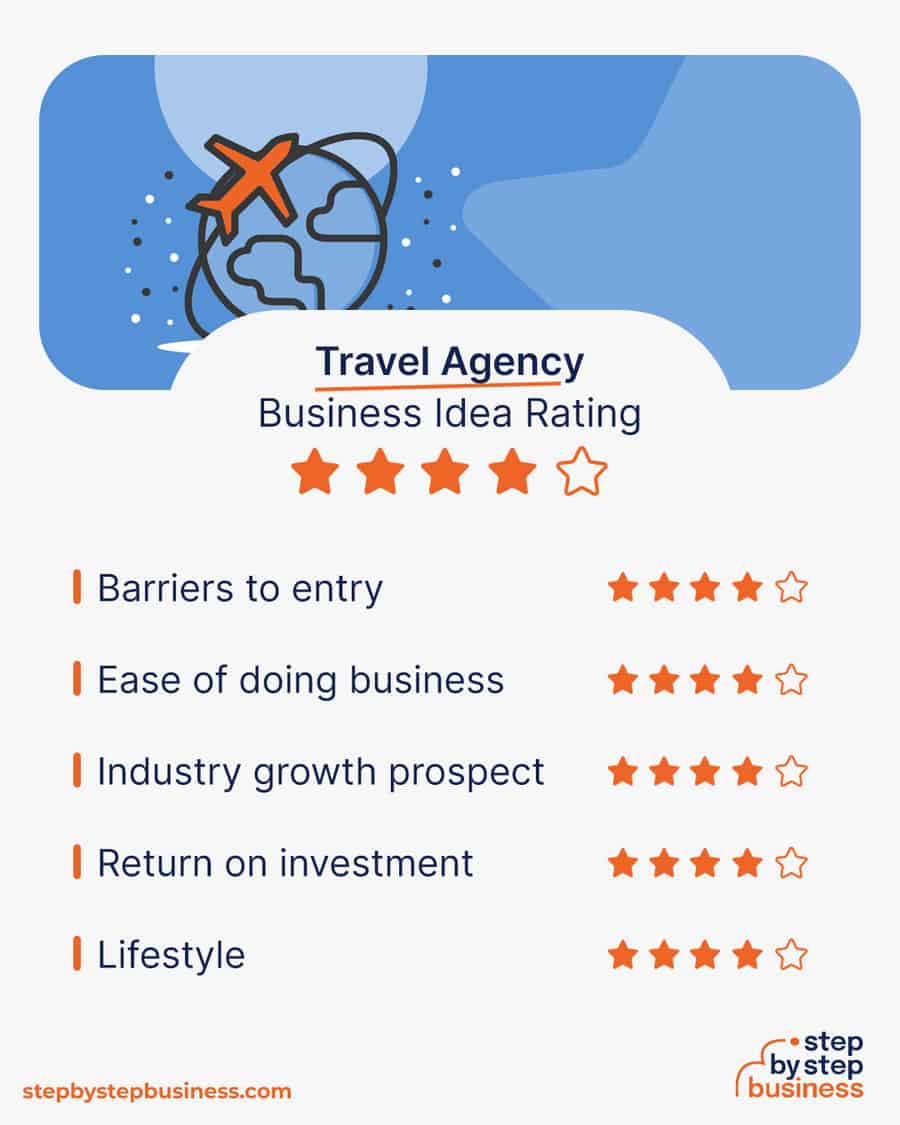
Step 3: Brainstorm a Travel Agency Name
Here are some ideas for brainstorming your business name:
- Short, unique, and catchy names tend to stand out
- Names that are easy to say and spell tend to do better
- The name should be relevant to your product or service offerings
- Ask around — family, friends, colleagues, social media — for suggestions
- Including keywords, such as “travel” or “bookings”, boosts SEO
- Choose a name that allows for expansion: “Wanderlust Adventures” over “Beach Bum Vacations” or “Honeymoon Haven Agency”
- A location-based name can help establish a strong connection with your local community and help with the SEO but might hinder future expansion
Once you’ve got a list of potential names, visit the website of the US Patent and Trademark Office to make sure they are available for registration and check the availability of related domain names using our Domain Name Search tool. Using “.com” or “.org” sharply increases credibility, so it’s best to focus on these.
Find a Domain
Powered by GoDaddy.com
Finally, make your choice among the names that pass this screening and go ahead with domain registration and social media account creation. Your business name is one of the key differentiators that set your business apart. Once you pick your company name, and start with the branding, it is hard to change the business name. Therefore, it’s important to carefully consider your choice before you start a business entity.
Step 4: Create a Travel Agency Business Plan
Here are the key components of a business plan:

- Executive Summary: Present an overview of your travel agency, highlighting its focus on providing personalized travel planning and booking services for various types of travelers.
- Business Overview: Describe the services of your travel agency, including custom travel itinerary planning, booking accommodations, flights, and special experiences.
- Product and Services: Detail the range of travel packages offered, such as luxury vacations, adventure tours, and corporate travel services.
- Market Analysis: Assess the current travel market, identifying target customer segments like families, honeymooners, or business travelers.
- Competitive Analysis: Compare your agency to others, focusing on your unique offerings like specialized destinations, personalized service, or exclusive deals.
- Sales and Marketing: Outline your strategy for attracting clients, using methods like online marketing, partnerships with travel providers, or attending travel expos.
- Management Team: Highlight the experience and expertise of your team in travel planning, customer service, and business management.
- Operations Plan: Describe the process of service delivery, from client consultation to trip execution and post-travel follow-up.
- Financial Plan: Provide an overview of financial aspects, including startup costs, pricing strategy, and anticipated income.
- Appendix: Include supplementary documents such as travel industry certifications, partnership agreements, or detailed client testimonials to support your business plan.
If you’ve never created a business plan, it can be an intimidating task. You might consider hiring a business plan specialist to create a top-notch business plan for you.
Step 5: Register Your Business
Registering your business is an absolutely crucial step — it’s the prerequisite to paying taxes, raising capital, opening a bank account, and other guideposts on the road to getting a business up and running.
Plus, registration is exciting because it makes the entire process official. Once it’s complete, you’ll have your own business!
Choose where to register your company
Your business location is important because it can affect taxes, legal requirements, and revenue. Most people will register their business in the state where they live, but if you are planning to expand, you might consider looking elsewhere, as some states could offer real advantages when it comes to travel agencies.
If you’re willing to move, you could really maximize your business! Keep in mind, it’s relatively easy to transfer your business to another state.
Choose your business structure
Business entities come in several varieties, each with its pros and cons. The legal structure you choose for your travel agency will shape your taxes, personal liability, and business registration requirements, so choose wisely.
Here are the main options:

- Sole Proprietorship – The most common structure for small businesses makes no legal distinction between company and owner. All income goes to the owner, who’s also liable for any debts, losses, or liabilities incurred by the business. The owner pays taxes on business income on his or her personal tax return.
- General Partnership – Similar to a sole proprietorship, but for two or more people. Again, owners keep the profits and are liable for losses. The partners pay taxes on their share of business income on their personal tax returns.
- Limited Liability Company (LLC) – Combines the characteristics of corporations with those of sole proprietorships or partnerships. Again, the owners are not personally liable for debts.
- C Corp – Under this structure, the business is a distinct legal entity and the owner or owners are not personally liable for its debts. Owners take profits through shareholder dividends, rather than directly. The corporation pays taxes, and owners pay taxes on their dividends, which is sometimes referred to as double taxation.
- S Corp – An S-Corporation refers to the tax classification of the business but is not a business entity. An S-Corp can be either a corporation or an LLC , which just needs to elect to be an S-Corp for tax status. In an S-Corp, income is passed through directly to shareholders, who pay taxes on their share of business income on their personal tax returns.
We recommend that new business owners choose LLC as it offers liability protection and pass-through taxation while being simpler to form than a corporation. You can form an LLC in as little as five minutes using an online LLC formation service. They will check that your business name is available before filing, submit your articles of organization , and answer any questions you might have.
Form Your LLC
Choose Your State
We recommend ZenBusiness as the Best LLC Service for 2024

Step 6: Register for Taxes
The final step before you’re able to pay taxes is getting an Employer Identification Number , or EIN. You can file for your EIN online or by mail or fax: visit the IRS website to learn more. Keep in mind, if you’ve chosen to be a sole proprietorship you can simply use your social security number as your EIN.
Once you have your EIN, you’ll need to choose your tax year. Financially speaking, your business will operate in a calendar year (January–December) or a fiscal year, a 12-month period that can start in any month. This will determine your tax cycle, while your business structure will determine which taxes you’ll pay.
The IRS website also offers a tax-payers checklist , and taxes can be filed online.
It is important to consult an accountant or other professional to help you with your taxes to ensure you are completing them correctly.
Step 7: Fund your Business
Securing financing is your next step and there are plenty of ways to raise capital:
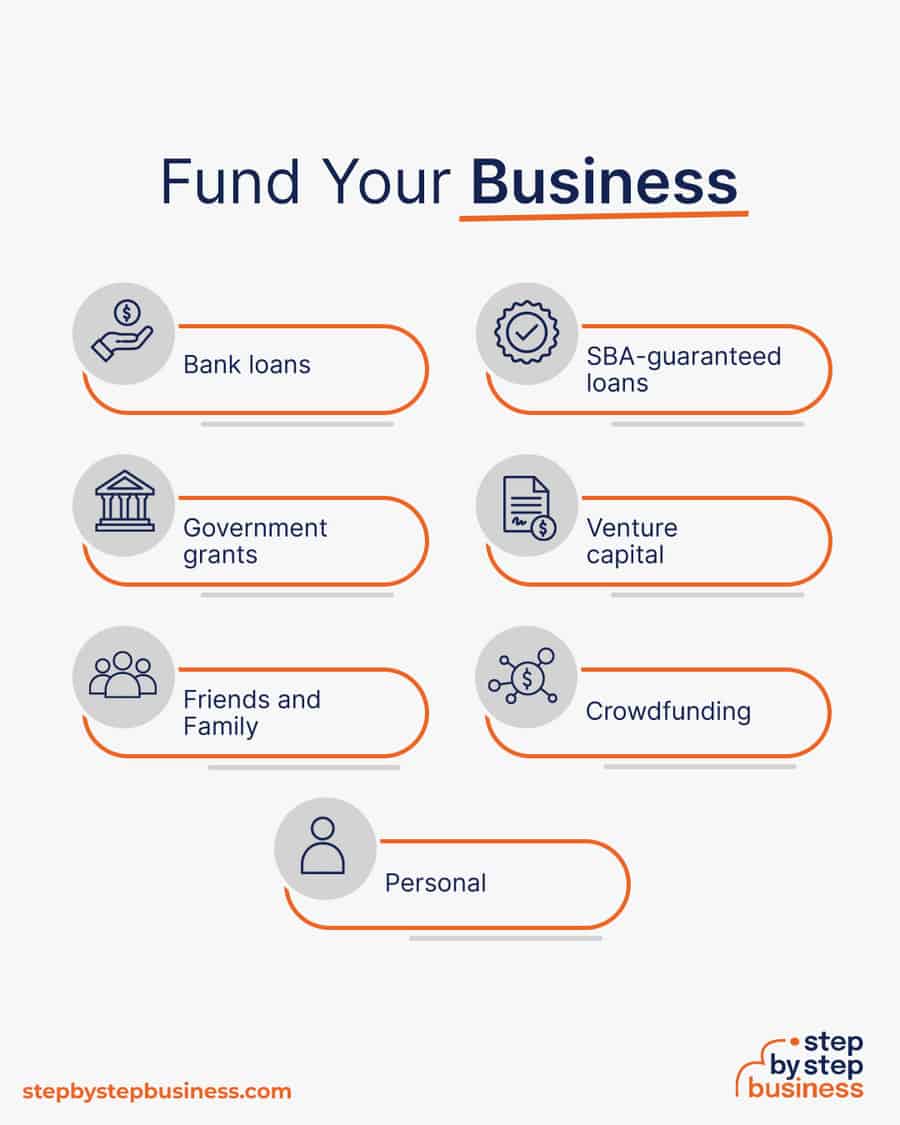
- Bank loans : This is the most common method, but getting approved requires a rock-solid business plan and strong credit history.
- SBA-guaranteed loans : The Small Business Administration can act as guarantor, helping gain that elusive bank approval via an SBA-guaranteed loan .
- Government grants : A handful of financial assistance programs help fund entrepreneurs. Visit Grants.gov to learn which might work for you.
- Venture capital : Offer potential investors an ownership stake in exchange for funds, keeping in mind that you would be sacrificing some control over your business.
- Friends and Family : Reach out to friends and family to provide a business loan or investment in your concept. It’s a good idea to have legal advice when doing so because SEC regulations apply.
- Crowdfunding : Websites like Kickstarter and Indiegogo offer an increasingly popular low-risk option, in which donors fund your vision. Entrepreneurial crowdfunding sites like Fundable and WeFunder enable multiple investors to fund your business.
- Personal : Self-fund your business via your savings or the sale of property or other assets.
Bank and SBA loans are probably the best options, other than friends and family, for funding a travel agency. You might also try crowdfunding if you have an innovative concept.
Step 8: Apply for Travel Agency Licenses and Permits
Starting a travel agency requires obtaining a number of licenses and permits from local, state, and federal governments.
Federal regulations, licenses, and permits associated with starting your business include doing business as (DBA), health licenses and permits from the Occupational Safety and Health Administration ( OSHA ), trademarks, copyrights, patents, and other intellectual properties, as well as industry-specific licenses and permits.
You may also need state-level and local county or city-based licenses and permits. The license requirements and how to obtain them vary, so check the websites of your state, city, and county governments or contact the appropriate person to learn more.
You could also check this SBA guide for your state’s requirements, but we recommend using MyCorporation’s Business License Compliance Package . They will research the exact forms you need for your business and state and provide them to ensure you’re fully compliant.
This is not a step to be taken lightly, as failing to comply with legal requirements can result in hefty penalties.
If you feel overwhelmed by this step or don’t know how to begin, it might be a good idea to hire a professional to help you check all the legal boxes.
Step 9: Open a Business Bank Account
Before you start making money you’ll need a place to keep it, and that requires opening a bank account .
Keeping your business finances separate from your personal account makes it easy to file taxes and track your company’s income, so it’s worth doing even if you’re running your travel agency business as a sole proprietorship. Opening a business bank account is quite simple, and similar to opening a personal one. Most major banks offer accounts tailored for businesses — just inquire at your preferred bank to learn about their rates and features.
Banks vary in terms of offerings, so it’s a good idea to examine your options and select the best plan for you. Once you choose your bank, bring in your EIN (or Social Security Number if you decide on a sole proprietorship), articles of incorporation, and other legal documents and open your new account.
Step 10: Get Business Insurance

Business insurance is an area that often gets overlooked yet it can be vital to your success as an entrepreneur. Insurance protects you from unexpected events that can have a devastating impact on your business.
Here are some types of insurance to consider:
- General liability: The most comprehensive type of insurance, acting as a catch-all for many business elements that require coverage. If you get just one kind of insurance, this is it. It even protects against bodily injury and property damage.
- Business Property: Provides coverage for your equipment and supplies.
- Equipment Breakdown Insurance: Covers the cost of replacing or repairing equipment that has broken due to mechanical issues.
- Worker’s compensation: Provides compensation to employees injured on the job.
- Property: Covers your physical space, whether it is a cart, storefront, or office.
- Commercial auto: Protection for your company-owned vehicle.
- Professional liability: Protects against claims from a client who says they suffered a loss due to an error or omission in your work.
- Business owner’s policy (BOP): This is an insurance plan that acts as an all-in-one insurance policy, a combination of any of the above insurance types.
Step 11: Prepare to Launch
As opening day nears, prepare for launch by reviewing and improving some key elements of your business.
Essential software and tools
Being an entrepreneur often means wearing many hats, from marketing to sales to accounting, which can be overwhelming. Fortunately, many websites and digital tools are available to help simplify many business tasks.
You may want to use industry-specific software to manage bookings and scheduling, such as TravelPerk , TravelCEO , and TravelOperations .
- Popular web-based accounting programs for smaller businesses include Quickbooks , Freshbooks , and Xero .
- If you’re unfamiliar with basic accounting, you may want to hire a professional, especially as you begin. The consequences for filing incorrect tax documents can be harsh, so accuracy is crucial.
Develop your website
Website development is crucial because your site is your online presence and needs to convince prospective clients of your expertise and professionalism.
You can create your own website using services like WordPress, Wix, or Squarespace . This route is very affordable, but figuring out how to build a website can be time-consuming. If you lack tech-savvy, you can hire a web designer or developer to create a custom website for your business.
Your website should showcase your offerings, customer testimonials, and detailed information about destinations.
Your clients are unlikely to find your website, however, unless you follow Search Engine Optimization ( SEO ) practices. These are steps that help pages rank higher in the results of top search engines like Google.
Here are some powerful marketing strategies for your future business:
- Leverage Social Media : Use platforms like Instagram, Facebook, and Pinterest to share stunning travel imagery, customer stories, and travel tips. Engage with your audience through regular posts, stories, and responses to comments.
- Content Marketing : Start a blog or a YouTube channel providing valuable content like travel guides, tips, destination reviews, and travel trends. This not only helps in SEO but also establishes you as an expert in the field.
- Build Partnerships : Collaborate with local businesses in your chosen travel destinations, such as hotels, tour operators, and local attractions. This can lead to exclusive deals or packages that you can offer to your clients.
- Email Marketing : Collect emails through your website and social media channels and send out regular newsletters with travel tips, special offers, and new package announcements.
- Customer Reviews and Referrals : Encourage your clients to leave reviews on platforms like TripAdvisor or Google. Word-of-mouth referrals are powerful, so consider offering incentives for referrals.
- Attend Travel Expos and Events : Participate in travel expos, seminars, and networking events to build contacts and stay updated on the latest industry trends.
- Offer Personalized Services : Tailor your services to meet individual client needs. Personal touches can make a big difference in the travel industry.
- Utilize Paid Advertising : Invest in targeted ads on social media and Google to reach potential clients. This can be particularly effective when you have special offers or new packages to promote.
- Stay Informed and Flexible : The travel industry is dynamic, so it’s important to stay informed about global travel trends, destination updates, and customer preferences.
- Sustainable and Responsible Travel : With growing awareness about environmental and cultural impacts, promoting sustainable and responsible travel practices can set your agency apart.
Focus on USPs

Unique selling propositions, or USPs, are the characteristics of a product or service that set it apart from the competition. Customers today are inundated with buying options, so you’ll have a real advantage if they are able to quickly grasp how your travel agency meets their needs or wishes. It’s wise to do all you can to ensure your USPs stand out on your website and in your marketing and promotional materials, stimulating buyer desire.
Global pizza chain Domino’s is renowned for its USP: “Hot pizza in 30 minutes or less, guaranteed.” Signature USPs for your travel agency could be:
- Travel to Asia’s best secret destinations
- The best local insights and insider adventures
- Vacations for the whole family, from grandma to the baby!
You may not like to network or use personal connections for business gain. But your personal and professional networks likely offer considerable untapped business potential. Maybe that Facebook friend you met in college is now running a travel agency, or a LinkedIn contact of yours is connected to dozens of potential clients. Maybe your cousin or neighbor has been working in travel agencies for years and can offer invaluable insight and industry connections.
The possibilities are endless, so it’s a good idea to review your personal and professional networks and reach out to those with possible links to or interest in travel. You’ll probably generate new customers or find companies with which you could establish a partnership. Online businesses might also consider affiliate marketing as a way to build relationships with potential partners and boost business.
Step 12: Build Your Team
If you’re starting out small from a home office, you may not need any employees. But as your business grows, you will likely need workers to fill various roles. Potential positions for a travel agency would include:
- Travel Agents – sales and bookings
- General Manager – scheduling, accounting, staff management
- Marketing Lead – SEO strategies, social media, other marketing
At some point, you may need to hire all of these positions or simply a few, depending on the size and needs of your business. You might also hire multiple workers for a single role or a single worker for multiple roles, again depending on need.
Free-of-charge methods to recruit employees include posting ads on popular platforms such as LinkedIn, Facebook, or Jobs.com. You might also consider a premium recruitment option, such as advertising on Indeed , Glassdoor , or ZipRecruiter . Further, if you have the resources, you could consider hiring a recruitment agency to help you find talent.
Step 13: Run a Travel Agency – Start Making Money!
Owning a travel agency means sharing the joy of travel for a living. What could be more fun? It’s also a huge, high-growth industry that you could tap into and grow a profitable business. Startup costs are low, and all you need is a simple accreditation — there’s no real training required. You just need a good concept for your agency and a great marketing plan. Having a strong online presence in this digital age is also an absolute must.
You’ve started off on the right foot by reading this guide, and now you’re ready to begin your trip to entrepreneurial success!
- Travel Agency Business FAQs
If you run your online travel agency from home, you could have profit margins of up to 80%. Costs to run your travel agency are very low, and you’re paid around a 10% commission on everything that you book. As a home-based, one-person show, you could make $60,000 per year to start, and much more once you’re established.
Consumers are turning to online travel agencies more and more, which you could easily run from home. If your business grows fast and you need to add staff, you may want to have an office.
Some consumers prefer the personal service of a smaller online agency that can offer more local, personal insights about travel destinations. The key is to differentiate yourself in some way. You could specialize in certain locations, a specific type of lodgings, such as cabins, or in a type of vacation such as corporate retreats.
Travel agencies engage in activities such as providing travel advice, booking travel arrangements, managing logistics, and offering specialized services tailored to clients’ needs.
Running a travel agency can have challenges due to intense competition, evolving industry dynamics, regulatory considerations, seasonal fluctuations, and the need for customer satisfaction and crisis management.
Leave a Reply Cancel reply
Your email address will not be published. Required fields are marked *
Save my name, email, and website in this browser for the next time I comment.
- Decide if the Business Is Right for You
- Hone Your Idea
- Brainstorm a Travel Agency Name
- Create a Travel Agency Business Plan
- Register Your Business
- Register for Taxes
- Fund your Business
- Apply for Travel Agency Licenses and Permits
- Open a Business Bank Account
- Get Business Insurance
- Prepare to Launch
- Build Your Team
- Run a Travel Agency - Start Making Money!
Subscribe to Our Newsletter
Featured resources.

21 Agency Business Ideas
David Lepeska
Published on August 11, 2022
Dreaming of running your own agency? There are a lot of possibilities out there, from travel to advertising and marketing, to recruiting, SEOconsult ...

14 Best Luxury Business Ideas
Published on July 29, 2022
People love a bit of luxury in their life, which is why high-end goods are always in demand. You’ll need a sizable investment to get started, buty ...

21 Tourism and Travel Business Ideas
Carolyn Young
Published on July 21, 2022
The tourism industry is massive and diverse, offering many opportunities for sharp entrepreneurs. You could start a travel agency, a campground, ah ...
No thanks, I don't want to stay up to date on industry trends and news.
1-800-396-8507 Get Started

ENTREPRENEURS STARTING A BUSINESS
- Agency Solutions
- Starting a Travel Business
THERE'S NO BETTER TIME THAN NOW TO JOIN THE TRAVEL INDUSTRY.
Looking to start a travel agency? You bring the passion for travel, we bring the resources to help you succeed. If you are an entrepreneur who loves travel, enjoys a flexible lifestyle and has a desire to own a home-based travel business that is exciting, rewarding and creates life-changing memories , fill out the form below. With a demand for travel advisors more than any other time, joining forces with an industry-leading travel company like Avoya Travel ® opens new doors for your business to start a travel agency business from home.
No experience? No problem. Use our new-to-travel education, marketing, technology, support and 60 years of travel industry experience to hit the ground running with your business. With economical start-up costs and access to our innovative products and services, this is an opportunity unlike any other to build and grow a successful independent travel business. Join a community of like-minded peers eager to create the future of travel. We’ll help make sure you have all the facts before choosing a travel host or franchise network.
Start Your Dream Travel Business in Just Three Steps

Fill Out the Form
Submit your contact information below and get connected with an Affiliation Specialist.

Launch Your Travel Business
Become an Independent Agent in the Avoya Network™ and launch your very own travel business.

Start Selling
Go ahead, make travel dreams come true! We'll be here to help you from day one to day 365 and beyond!
WHY PARTNER WITH AVOYA?
For decades, we've been helping entrepreneurs build successful travel businesses and soar within this exciting industry. But don't just take our word for it. The average Avoya Affiliate books over $350,000 in sales every year. Yes, you read that right!
We love what we do, and that's to help you do what YOU do best: sell unforgettable experiences. While this industry is fun and exciting, it's also growing. Want to capitalize on the travel craze? Fill out the form below to learn more about partnering with the industry’s leading network, voted Best Host Agency seven years in a row, paving the way for the future of travel.
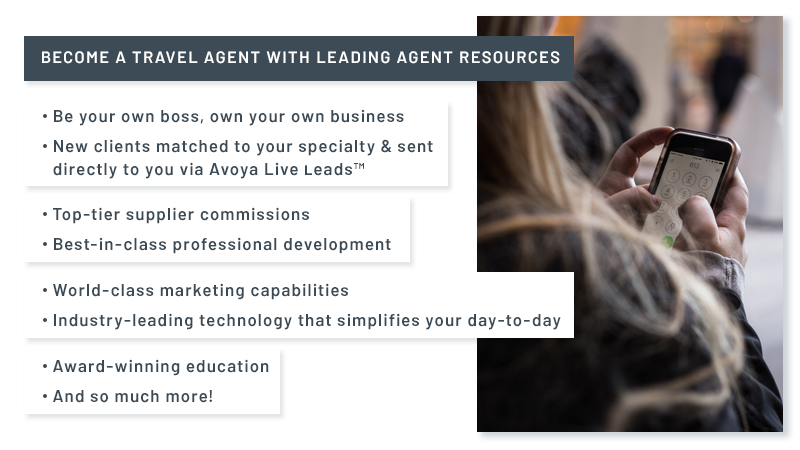
ACCESS BEST-IN-CLASS RESOURCES
Our advice for embarking on your business journey alone? Don't. By joining the industry's leading travel platform, you'll enjoy the freedom to run your business your way, on your terms, but with all the added advantages of an award-winning travel partner with industry-leading resources.
With our team of experts by your side, running your dream travel business couldn't be easier.

MILITARY DISCOUNT
It's time to succeed, and to save money while doing it. To honor and thank you for your service, we're proud to offer an exclusive discount for active duty, veterans and their spouses for $100 off your affiliation fee to join the Avoya Travel Network™! It's never too late to start your dream business. Are you ready for your next mission? Click here to get started.
NO EXPERIENCE? NO PROBLEM!


AVOYA TRAVEL ACADEMY
Ready to embark on your journey into the travel industry? The Avoya Travel Academy is designed specifically for aspiring entrepreneurs (like you!) entering the world of travel, offering a comprehensive educational experience that equips you to confidently own and operate your independent travel business.
Our award-winning course, Travel Agent Education Powered by Avoya , housed in the Avoya Travel Academy, allows you to choose from three distinct plans tailored to suit your business's needs and your wallet. Whether you prefer a budget-friendly option or an all-inclusive plan, we have the perfect fit to kickstart your success in travel.
Curious to explore further? Click here to learn more about the program and complete your registration process, or fill out the form below to talk to a Specialist.

"I opened my Independent Agency with the Avoya Travel Network in March 2016 through Avoya Travel's New-To-Travel program, and by the end of 2016 hit my own personal goal of being a Best of the Best agency with over $1.3 million in sales. Avoya's robust support, including the optional Live Leads program, has helped me apply my sales experience to the travel industry, build my business beyond expectations and begin creating lifelong relationships with new customers."

"I have tripled my income since I joined Avoya. A lot of it has to do with the innovative Agent Power technology, the quality of Live Leads and the support that I receive from Avoya."

"Avoya Travel's reputation is unsurpassed; when they say Integrity and Professionalism, it is true. We feel we're in the best hands possible."

"Avoya offers all the support you need in order to start your own travel business. Professional development, organization, technology, leads, competitive pricing, invoicing, quoting and of course MARKETING, it's all here. I don't know of any other travel partner that offers all of that."

“Avoya Travel provides the very best support in all areas of my business; support being available seven days a week; the stellar reputation and connection between Avoya Travel and vendors, which assures us the very best offers to clients and automatically gives us the advantages to connect directly with vendors; and of course, the weekly direct deposits and much more!”

“I love Avoya's support!!! Being affiliated with the most honorable people in the business gives you great security.”
Contact us to learn more about our product and service offerings.

Online Travel Booking System: The Ultimate Checklist
- International Tour Operators
- Sales & Bookings
- Customer Experience
The global travel & tourism market is steadily growing and will reach an estimated 2.2 billion users by 2027 . This goes to show the sheer importance of running an efficient tour operation.
What is the key to a seamless travel booking experience? That’s easy. It’s a convenient, easy-to-use booking system. Choosing the right online travel booking system for your tour company is paramount, and honestly, a game-changer (for your business and the overall customer user experience).
That said, to stand out from the competition, you need more than just a convenient booking and payment solution. You need the whole package, with features that simplify and streamline all your processes from the moment someone books a tour, all the way through to the after-sales service.
This 3-step guide will show you how to choose the ideal travel booking software for your business.

Choosing The Right Online Travel Booking System
We’ve curated three straightforward steps for choosing the ultimate travel booking system for your tour company. Ready to take your online booking processes to a whole new level? Let’s get started.
Step 1 - Honest Evaluation Of Your Current Processes And Your Needs
This is two-fold. You need to evaluate your business from an operational and customer experience point of view.
Does your current process resonate with your audience, or do they find it difficult to understand and use? You’ll be able to identify what their pain points are with a quick analysis of any negative reviews received. If you’ve sent out customer surveys, this is also a useful tool to understand feedback from the user experience.
From an operational perspective, are you spending a lot of time on admin, payment issues, and communicating with your clients? These are all signs that it’s time for an upgrade.
1. Analyze Your Current Process
Ask yourself what your goals are for your online travel booking processes. Then consider how your current processes hold up against closer scrutiny. To get to the core issues, perform a gap analysis to compare your current performance metrics with what you hope to achieve.
It’s also crucial to research different software options to see what’s out there and what could benefit your tour operation the most. A platform like WeTravel gives you access to a 360 solution , taking control of all areas of your business so that you can focus on the most important part - providing an incredible travel experience.
-1.jpg?width=1000&height=666&name=Copy%20of%20Untitled%20(2)-1.jpg)
2. Needs vs Wants
Be realistic about your actual needs, and the needs of your clients, vs your wants . Don’t be distracted by bells and whistles that your booking platform doesn’t need. Choose only the features that you know you will use or that could improve your business.
Did you know that WeTravel has an option to try the software for free ? Better yet, choose the Basic Plan to get started (did we mention that this plan is also free?)
Step 2 - Draw Up Your Checklist Of Crucial Online Travel Booking System Features
Once you have identified your unique areas of concern, and what you most need from an online travel booking system, it’s time to draw up a checklist of required features. This will guide you in your choice, taking emotion out of the equation so you can make a data-driven decision for your business.
Real-Time Bookings
Real-time bookings are a must! The system you choose should update booking availability continuously and instantly.
When your customers can see the current availability and secure their reservations instantly, their customer journey is a calm and happy one. It saves them the disappointment and frustration of choosing a destination, only to discover that it is no longer available.
Automated Communications
Automated communications streamline the entire trip booking process for customers and travel agents alike. They offer significant benefits, saving time and improving the customer journey.
This includes abandoned cart reminders and disputed payment support. It also includes valuable features like pre-departure safety tips and general info about their destination. Communication doesn’t have to stop after the vacation is over.
-1.jpg?width=1000&height=666&name=Copy%20of%20Untitled%20(1)-1.jpg)
You’ll increase the chances of repeat business with post-trip communications. An example is sending out automated messages asking what they enjoyed about their trip, and inviting them to leave a review.
Learn more about the best practices for client communications, here .
User-Friendly Interface
Your online booking system should offer a user-friendly interface with a clean, uncluttered look and an embedded checkout link for your website. This makes online travel bookings more accessible to users who aren’t technologically savvy, and would normally be hesitant to make payments online.
Integrates With Social Media For Online Booking Versatility
With so many people scrolling through social media for news, entertainment, and shopping, it’s no surprise that many access information about travel there as well. This is why social media marketing is one of the most effective ways your travel businesses can boost engagement .
It’s just as important to the travel booking experience. If they have to go off-platform to book a trip, you risk losing that customer. Your booking software should ideally allow people to book a trip with your company directly from that social media platform .
Low Learning Curve For Your Employees
When switching to a new online travel booking system with unfamiliar booking and payment solutions, your staff need to get to grips with the new tech, fast.
The more time it takes to train your travel agents or tour operators on the new software, the more time will be lost while trying to get your booking processes on track. Choose a system with a low learning curve and excellent technical support.

Secure Payment Gateway
When conducting business online, you need to be able to accept payments 24/7, safely and securely. So a secure payment gateway is critical.
To provide your customers with maximum convenience, it should allow payments in multiple currencies (with competitive exchange rates), and accept most major credit cards. Here’s a comprehensive list of payment features to consider when choosing a payment platform .
Payment gateways can carry high commission fees, and this can negatively impact your profits. Worse still, factoring in those costs means your customer will share the burden with you. So choose an online travel booking system with a payment gateway that addresses this issue, head-on.
For example, WeTravel pricing starts at an ultra-low processing fee of 1%.
Curious about what you can achieve with WeTravel?

Data Security
Data security is one feature you can never overlook. The right online travel booking system will offer security for client data as well as your own. This includes the protection of personal data, as well as payment data.
Why is online payment security so important?
It protects you and your customer from fraud, but also builds a relationship of trust with your customer base. Only choose a booking and payments system that ensures the protection of sensitive data and adheres to payment card industry (PCI) standards.
Mobile Friendly
Mobile phone use trends are shaping the travel industry . Is the booking system you’re considering mobile-friendly? This is essential, as so many of your customers will be booking their trips on mobile devices.
But it goes beyond customer convenience. It has to be convenient for you, too.
-1.jpg?width=1000&height=666&name=Copy%20of%20Untitled%20(3)-1.jpg)
You should be able to check in on your travel bookings at any time, from anywhere. This means that the online travel booking system you choose should have a mobile-friendly UX and an app for your agents to use, on-the-go.
Versatility In Pricing And Structure
The online travel booking system you choose should offer you flexible pricing options and optional add-ons, so you can choose what works best for your tour company. You should also have access to customizable elements like branded email communications and branded customer dashboards.
As an example of this, WeTravel offers these customizable branding possibilities.
Some of our features are reserved for Pro and Enterprise plans. But ALL plans, including the free one, include unlimited bookings & team members, with integrated payment processing and support for your team and customers.
A major benefit of using WeTravel? The platform is scaled to grow with your business.
Step 3 - Make The Transition
After you have found the online travel booking system that meets your needs, it’s time to make the transition. Despite your eagerness to get started, your staff must be well-prepped and ready for the switch to your new booking and payment solution.
Training And Support
If you’ve chosen a system that is easy to set up and requires very little training, it’ll make the transition that much easier.
The simple setup is just one of the many reasons that over 5000 companies use WeTravel to simplify their online bookings and payment processes. It’s user-friendly for both travel agency staff and the people booking their trips. Have a look at some of our success stories and see for yourself.
-1.jpg?width=1000&height=666&name=Copy%20of%20Untitled%20(5)-1.jpg)
Top-tier support should be a standard feature. Did you know that WeTravel offers a support team available to you on ALL plans?
WeTravel understands the need for ongoing support, on all levels. This transcends technical issues and includes tutorials and academic guidance. That’s why joining the WeTravel community gives you access to e-books and guides, as well as tools and templates that streamline your workflows.
Continuous Learning
The travel industry is a dynamic force, adapting to and meeting the needs of an ever-more demanding global audience.
Making the transition to more functional booking and payment solutions is a step in the right direction. But to continue offering your clients maximum value, you must stay up-to-date with the latest trends. So cultivate a culture of continuous learning in your staff.
Keep abreast of travel industry developments, and stay informed about best practices. Participate in travel industry-specific webinars that help you to unlock your company’s potential growth. Or join the thousands of industry professionals taking our Academy courses to hone their online business skills.
The right online travel booking system for your tour business should focus on features that really matter. It should provide simplicity, convenience, security, and ongoing support.
WeTravel is more than just a booking and payment solution for travel companies of all sizes. We are the solution, with features that offer an easier and more enjoyable travel booking experience for both you and your valued customers.
Are you ready to give the travel community the convenient, user-friendly, and secure travel booking and payment platform it deserves? WeTravel will help you do that. Contact us today for a free demo .
New resources, straight to your inbox
We’re committed to your privacy. WeTravel uses the information you provide to us to contact you about our relevant content, products, and services. You may unsubscribe at any time.
About the author

Related Posts
Is your tour operator booking software damaging your business, how customers can book trips through wetravel without leaving your site, why is it worth investing in a good travel payment platform.
- According to our Build for the Future survey, a small group of forward-thinking travel businesses have cultivated key attributes that help them thrive.
- Travel leaders have 45% more capabilities in differentiated people advantage than laggards because they upskill existing personnel and attract and retain new talent, which allows them to offer customers a better experience.
- Leaders have 68% more AI capabilities than laggards because they deploy advanced analytics throughout the travel value chain to offer hyper-personalization.
Subscribe to read our latest insights on Travel and Tourism.

Travel and Tourism
/ slideshow, building the travel company of the future, key takeaways.
The following insights are part of BCG’s Build for the Future series, based on three years of research conducted on digital transformations at major organizations around the globe.
Planning a trip once meant consulting a guidebook or working with a travel agent. Today, people may plan a getaway based on a TikTok influencer’s recommendation, an online review, or a personalized ad fed to them by an algorithm.
These and other evolving consumer behaviors, coupled with cost pressures, are redefining competition in the travel business and the capabilities needed to succeed. As a result, the travel industry is facing challenges in all sectors, including airlines, hotels, theme parks, and cruise lines. The challenges are especially acute for long-time incumbents playing catch-up with digital natives.
Against this background of change, a handful of travel companies are thriving. According to our Build for the Future survey, the most forward-thinking travel businesses share a number of common attributes. These traits allow them to excel regardless of customer or market pressures and produce financial and nonfinancial outcomes that outshine those of their peers. (See “Build for the Future.”)
Build for the Future
- Five areas that are fundamental to success
- The emphasis of transformation efforts
- How successful transformation efforts have been
- The degree to which each of more than 50 potential influencing capabilities were in place
At a Glance
Our Build for the Future survey identified a small cadre of companies we refer to as “future-built,” with attributes that make them more ready than their peers for what’s on the horizon. These traits include: aligned leadership and purpose, differentiated people advantage, agile operating model, innovation-driven culture, modern technology platforms, and AI .
Future-built travel companies use these attributes as a springboard to improve their performance in four specific areas:
- Customer Experience. They elevate travel experiences by designing seamless, digital-first customer journeys, enhancing touchpoints, and reimagining loyalty to foster lasting connections.
- Commercial Excellence. They sharpen their competitive edge by using dynamic pricing and revenue management strategies, crafting tailored marketing narratives, and accelerating growth through digital sales channels.
- Operational Innovation. They infuse operations with digital agility, they forecast and preempt maintenance needs, and they execute capital projects with precision to redefine operational excellence.
- Cost and Resilience. They employ a holistic view of managing costs, embed zero-based budgeting principles, and streamline procurement to lift efficiency and instill resilience.
Among the 24 industries analyzed in our Build for the Future research, travel is one of the more advanced when it comes to being ready for the future. That’s primarily because of the advanced practices used by digital newcomers. Long-time travel players, however, trail the majority of incumbents in comparable consumer-facing industries when it comes to future readiness. In particular, travel incumbents lag in adopting innovation-driven cultures and cultivating a differentiated people advantage.
Read the slideshow to learn more about the survey findings.

Focusing on People and AI
The difference between travel industry leaders and laggards is particularly acute in two areas:
Differentiated People Advantage. Travel industry leaders have an edge in upskilling existing personnel and attracting and retaining new talent, which allows them to offer customers a better experience booking travel or taking a trip. Leaders in the hospitality sector of the travel business, for example, improve hiring and retention through continuous benchmarking to ensure that compensation is equal to or above that for comparable jobs in other industries, and by offering flexible schedules. Hospitality leaders also support diversity and inclusion. They also target messaging, outreach programs, and other actions to appeal to specific groups of current, past, and prospective employees.
AI. Travel industry leaders deploy advanced analytics and AI throughout the travel value chain. By optimizing their supply chain and offering hyper-personalization, these bionic companies successfully combine human and advanced technology capabilities, gaining a competitive advantage that can take a variety of forms. During severe weather, airlines use these capabilities to minimize customer travel disruptions by selecting the next best flight schedules. Cruise lines use their combined people and advanced technology capabilities to fine-tune pricing during cruise booking periods to maximize occupancy and revenue.
How Travel Industry Incumbents Can Catch Up
To become future-built travel businesses, companies might consider the following moves to foster the six winning attributes we’ve identified:
Aligned Leadership and Purpose. Leadership is central to becoming future-built. Companies in industries of all types with a systematic and well-supported approach to activate leaders see transformation success rates that are three times higher than those of their competitors. Leaders at these companies reimagine and reinvent the business to serve all stakeholders, inspire and enrich the human experience, and execute and innovate through supercharged teams.
Differentiated People Advantage. Combine people and machines for a new model of customer service excellence. Use generative AI’s (GenAI) emerging power to equip frontline staff with behavioral nudges and as support for personalized customer interactions.
Agile Operating Model. Build a minimum viable operating model to support innovation and establish an innovation flywheel . Such a learning loop increases a company’s chances of building the next game-changing product or service and decreases the time needed to bring digital products to market.
Innovation-Driven Culture. Create an innovation-focused culture that embraces risk, fosters collaboration, and grants autonomy to internal teams. Then, use that culture to put customer experience at the heart of everything you do.
Modern Technology Platforms. Ensure that efforts to establish data platforms and modernize core systems start at the top, in the executive suite. Guide modernization initiatives with a rigorous focus on business outcomes. Work backward from the outcome you want to achieve, analyzing the data that has to be liberated and the systems that have to change to accomplish your goals.
AI. Use the excitement generated by GenAI to invigorate AI transformation programs, especially for managing revenue, managing operations, and personalizing customer interactions.
Call it the Instagram effect. People influenced by what they see on social media have higher expectations for travel and the services they get from the travel companies they work with. By cultivating superior people practices and an innovation-based culture, travel laggards can catch up with industry leaders and provide the services that customers want.
ABOUT BOSTON CONSULTING GROUP
Boston Consulting Group partners with leaders in business and society to tackle their most important challenges and capture their greatest opportunities. BCG was the pioneer in business strategy when it was founded in 1963. Today, we work closely with clients to embrace a transformational approach aimed at benefiting all stakeholders—empowering organizations to grow, build sustainable competitive advantage, and drive positive societal impact.
Our diverse, global teams bring deep industry and functional expertise and a range of perspectives that question the status quo and spark change. BCG delivers solutions through leading-edge management consulting, technology and design, and corporate and digital ventures. We work in a uniquely collaborative model across the firm and throughout all levels of the client organization, fueled by the goal of helping our clients thrive and enabling them to make the world a better place.
© Boston Consulting Group 2024. All rights reserved.
For information or permission to reprint, please contact BCG at [email protected] . To find the latest BCG content and register to receive e-alerts on this topic or others, please visit bcg.com . Follow Boston Consulting Group on Facebook and X (formerly Twitter) .
Contact Our Experts

Michael Fraser
Managing Director & Partner
Los Angeles

Alberto Guerrini
Managing Director & Senior Partner

Andy Levine

Lara Koslow

Jason Guggenheim
Managing Director & Senior Partner, Travel & Tourism Global Leader

Ryan Trocinski

Karan Jagitani
San Francisco - Bay Area
Michael Fraser is a Partner in the Los Angeles office. He joined the Los Angeles office of BCG in 2012 as a consultant. He holds a JD and a Bachelor of Commerce (majors actuarial studies and finance) from the University of New South Wales, Australia. Since joining BCG Michael has focused on Industrial Goods and Financial Services, with casework across a range of functional areas, including Marketing and Sales, People and Organization as well as Transformation. He has recently returned from casework in Brazil - a country he thoroughly enjoyed experiencing. Prior to joining BCG Michael worked for an Australian investment bank in Sydney and in New York where he spent time in equity and credit research, infrastructure a strong area of concentration. In his time away from the office, Michael enjoys the sights and sounds that Los Angeles has to offer, with his knowledge of the town happily increasing with each passing weekend!

Alberto Guerrini joined Boston Consulting Group in 2005. He is a core member of the firm’s Consumer practice; leader of the firm’s travel and tourism sector in IGT (Italy, Greece, and Turkey); and leader of the firm’s People and Organization practice in IGT. Alberto is also a leading member of BCG’s global initiative for pricing and revenue management in travel and tourism.

Lara Koslow is global leader of Boston Consulting Group’s Center for Customer Insight and part of the firm’s global Marketing, Sales & Pricing leadership team. She is the former global co-leader and North American leader of BCG’s marketing topic.

Julia Dhar joined Boston Consulting Group in 2009 and is a core member of the People & Organization , Industrial Goods, Public Sector, and Social Impact practices. She founded and leads BCG’s Behavioral Science Lab and the firm’s behavioral science network BeSmart, and is a member of BCG’s global Change Management leadership team. Trained as a behavioral economist, Julia champions the use of behavioral insights to improve product and service design and delivery to make countries and organizations more inclusive, sustainable, and productive. She is deeply involved in the firm's IP development on the Future of Work and co-leads BCG’s work on deskless workers.

Jason Guggenheim joined Boston Consulting Group in 2001 as a consultant after practicing as an attorney for 3 years in Johannesburg, South Africa. Jason studied at the University of the Witwatersrand in Johannesburg and received an undergraduate degree in finance and economics and a graduate degree in law from Oliver Schreiner School of Law at the University of the Witwatersrand. After leaving BCG in 2002, Jason took a strategy/corporate development role in the Ventures group at Delta Air Lines. In 2004, Jason joined a 4 person team, led by the then-CFO of Delta Air Lines, who took on the restructuring of the bankrupt independent energy provider Mirant Corporation. Following the emergence from bankruptcy of Mirant Corporation, Jason returned to BCG in 2007 to further his interest in strategy, travel and tourism, and turnaround work. Over the past few years, Jason has focused on cruiseline and airline work, serving clients in both the US and Europe.

Related Content
What’s Next
Read more insights from BCG’s teams of experts.

BCG’s research reveals six key success factors and the steps companies need to take to drive innovation, gain competitive advantage, and build for the future.

How a Platform Operating Model Can Drive Agility and Resilience
Organization-wide platforms for product and service delivery enable agile ways of working and rapid recovery from crisis.

Why Airlines Need to Nudge Behavior, Not Just Hedge Fuel Costs
Saving fuel is everybody’s business, from dispatchers and pilots to cabin crews and passengers.

Can Rising Borrowing Costs Create Unexpected Opportunity for Hotels?
Uncertainty, inflationary fears, and elevated interest rates have a chilling effect on investment. But strong demand for rooms makes hotels one of the few sectors that enjoy pricing flexibility in a broader economic downturn.

Building Customer Experience for the Future
How can businesses adapt to fast-evolving expectations? Here are the capabilities companies need to thrive.
- NEW COLOURS
- Classic Tech
- Classic Plus
- Classic Pro
- Classic Flight
- Military Backpack
- Underseat Bags
- Laptop Backpacks
- Gym and Work Backpacks
- Minimalist Backpack
- > Show All
- Classic Cross Body Bags
- Packing Cubes
- British Airways
- Backpack Size Guide
- > More Backpack Guides
- Carry On Luggage Size Guide
- > More Cabin Bag Guides
- Travel Gift Guide
- Digital Nomads Hub
- Travel News
- Destinations
- Product & Style
- Travel Light
- Packing Tips
- Packing Lists
- Air Travel Tips by Airlines
- Luggage Tips
- Pre-flight Checklist
- In-flight Checklist
- Layover Tips
- CABIN MILES
- Backpacks CLASSIC NEW COLOURS Classic Classic Tech Classic Plus Classic Pro Classic Flight ADVENTURE NEW COLOURS ADV ADV Pro ADV Dry MILITARY Military Backpack SIZE 28L 30L 32L 36L 42L 44L SHOP BY FUNCTION Cabin Bags Underseat Bags Laptop Backpacks Daypacks Gym and Work Backpacks Minimalist Backpack
- Shoulder Bags > Show All SHOULDER BAGS Sidekick Flipside Flapjack Classic Cross Body Bags
- Bum Bags > Show All BUM BAGS Hustle Hip Bags
- Accessories > Show All ACCESSORIES Rain Cover Packing Cubes Gift Cards
- Blogs Product Guides Backpack Size Guide > More Backpack Guides Carry On Luggage Size Guide > More Cabin Bag Guides Travel Gift Guide Our Journey Digital Nomads Hub Travel News Destinations Product & Style Cabinzero Travel Tips Travel Light Packing Tips Packing Lists Day Trips Air Travel Tips Air Travel Tips by Airlines Luggage Tips Pre-flight Checklist In-flight Checklist Layover Tips
41+ Business Travel Tips For Professionals: Travel For Success
Business travel is a common aspect of our professional life, whether you're a corporate employee or a digital nomad . It can facilitate growth and foster communication between enterprises. With practical business travel tips, whether your business trip is domestic or international, you can easily and confidently travel.
Depending on the nature of each business trip, there are certain things to consider. For client meetings and deal negotiations, having a business attire plan for both meetings and networking events is essential. For industry conferences and workshops, note-taking items such as a notebook, a laptop, and a comfortable pair of footwear are necessary for long hours of educational seminars.
As the landscape of business travel is continuously evolving, business travellers should practise travel tips that promote productivity as well as personal well-being. Here is our list of expert-approved travel tips for business travellers.
Pre-travel: Business Travel Packing Tips

Travelling with a cabin-friendly and practical backpack is convenient.
CabinZero Classic Backpack . IG: @umbelentini
Depending on the specific requirements of your business trip, you can tailor your business trip packing list accordingly. Remember to always have a list of all the essentials and take local weather into consideration when choosing the appropriate clothing.
1. Bring Essential Travel Documents
What does every business traveller need? Travel documents such as a valid passport, a visa if required, and a travel itinerary to keep track of meeting schedules, flight details, and reservations.
If you plan to drive, having an International Driving Permit (also known as "IDP") is a must. Furthermore, You should also have digital copies of important travel documents for unexpected cases.
2. Stay Powered With a Battery Charger And Power Bank
In today's digital age, having electronic devices on every business trip is the norm. From your smartphone to your laptop or tablet, these devices play an essential part in work-related tasks and in your personal life. Having battery chargers and portable power banks in your packing list will ensure your devices stay powered. When picking a power bank, it is important to consider factors such as capacity, compatibility and weight.
3. Bring An Extra Set Of Clothes (And Undies) In Your Carry-on
In case your flight is delayed or the checked suitcase disappears somewhere, you will have a fresh set to change into. It’s one of the best business travel hacks everyone should know about. Plus, extra underwear is never a bad thing.
On a side note, do bring casual clothes for a night out. Or at least some comfort clothes that you can wear both in and out of the room. It’s a pain to put your only set of formal clothes on just to go outside to grab some ice bin or food down the hall.
4. Use Carry-on Luggage
For a stress-free travel experience, choosing the right carry-on luggage is crucial. Having a practical and cabin-friendly backpack not only saves you time at long check-in queues but can also significantly reduce your risk of lost luggage. Start travelling efficiently and travel in style with CabinZero's diverse range of uniquely designed backpacks now.
5. Have Multiple Supplies/Copies Of One Thing
Laptop and phone chargers, socks, important documents, etc. should be available at least in two, one in your carry-on and one in your suitcase. That way, you lower the chances of forgetting your essentials.
6. Bring Noise-cancelling Headphones
Ambient noise, including flight engines, chatter from other passengers, and noise in public spaces, can be distracting for a long period. Using noise-cancelling headphones is not only great for cancelling out these unwanted noises, but it also allows you to relieve stress by having uninterrupted entertainment on the go.
7. Stay Refreshed With A Travel-sized Toiletry Bag
Having a versatile toiletry bag for every trip is a game changer for many travellers, especially business travellers. It is no secret that dressing smartly and having good personal hygiene can leave great impressions in professional settings. Choose travel-sized toiletry and opt for a waterproof bag with organisational compartments to carry all your toiletry needs.
8. Travel Light
Travelling light increases your mobility in crowded airports and ensures your efficiency in transit while taking public transportation. On top of all that, travelling light can lower your stress levels associated with unpacking and safeguarding your belongings. Remember to choose versatile clothing, consider layer clothing and evaluate your necessities.
On The Road: Tips for a Smooth-Sailing Business Trip

Flying in first class gives you more cabin space and privacy. Photo by Angelov on stock.adobe.com
Now that we have got the packing in order, it’s time to get started on your trip preparation. These few extra steps ensure you will hit the ground running once you land.
9. Digitalise Your Travel Documents And Working Files
It is a good practice to make digital copies of your travel documents such as passports, visas, flight tickets and reservations for unexpected cases of missing your original copies. There should be at least two backup copies, one on your phone, and another in your cloud storage.
For business trips, there are necessary files and documents required for meetings, workshops, etc. It is logistically better to have your working files in digital forms.
10. Make Use Of Expedited Security Programs
If you are a frequent traveller, one of your top priorities is probably to get through security screening faster . Using expedited security programs such as TSA Precheck or Global Entry can certainly expedite the screening process as verified passengers use dedicated lanes and are subjected to a more simplified process at security checkpoints.
11. Opt For Credit Cards With Free Lounge Memberships
Travelling for long hours can be tiresome. Instead of waiting at crowded terminals, treat yourself and stay in comfortable airport lounges to recharge during your business trips.
Airport lounges also have amenities such as stable Wi-Fi, power outlets, bathrooms, and working places to catch up on your pending work tasks. Most airport lounges come with an entry price. However, you can use a credit card that offers free lounge memberships to make the best out of credit cards' perks.
12. Get Sufficient Sleep To Avoid Jet Lag
One of the best travelling for work tips is to get enough sleep. This not only helps you mitigate the effects of jet lag, but it also gives you enough energy to get work done during your business trips. Depending on the length of your trip and the time difference in your new time zone, you can gradually adjust your sleep schedule and take naps strategically.
13. Be Mindful Of The Cultural Differences
For a successful work trip, navigating through the cultural differences mindfully is the key. Researching the cultural norms of your destination countries before travelling to understand the basic local customs and etiquette. This is an effective way to navigate interactions and initiate communication. Always be flexible with different working styles and embrace the diversity in your business trips.
14. Get Upgraded To First Class
There are various reasons that flying first class is appealing to business travellers: comfort, priority boarding, extra cabin space and premium amenities. One of the most appealing yet underrated perks of flying first class is networking opportunities with other business travellers and industry professionals. The good news is there are many ways to get upgraded to first class while travelling , including joining loyalty programs and using credit cards' perks.
Good Night's rest: Tips For Great Business Hotel Stays

Having Wi-Fi allows you to catch up on pending work tasks. Photo by Mint Images on stock.adobe.com
A comfortable and productive hotel stay is crucial for a successful business trip. Whether you're seeking a quiet haven or a convenient workspace, these tips will help you navigate your hotel stay like a seasoned traveller.
15. Bring Your Own Cleaning Kit
Whether you plan to stay just a night in a hotel or stay long-term for work, having a cleaning kit with you can help keep your space safer and more germ-free. Some useful items you should include in your travel cleaning kit are all-purpose cleaners and disinfectant wipes or wet wipes.
16. Check For Bed Bugs
Bed bugs might be small, but they are troublesome for all travellers. Handling bed bug infestations is not easy. Therefore, it is better to avoid bed bugs in the first place. You can inspect your bed to check for bloodstains, eggs or faeces. Using your flashlight or black light to check the frame joints and cushions for bed bugs is also useful.
17. Optimise Travel Loyalty Program
Frequent business travellers are often offered special benefits in travel loyalty programs by hotels. These benefits usually include special bonuses, points to use in hotel services and privileges for room upgrades. If your work requires taking frequent business trips, you can save costs substantially by optimising travel loyalty programs at hotels.
18. Pick An Airline or Hotel Chain To Be Your Favourite
Sticking to one airline or hotel chain makes it easier to accumulate points and rewards. It’s simple, just pick one to be your favourite, and try to book them as much as possible. Plus, it helps when you wake up to a familiar hotel room, which can be a big different when you have to travel for business a lot.
19. Location, Location, Location
A business traveller generally has different priorities than a leisure traveller when it comes to booking a hotel. to your meetings or work location to save time on commuting.
Using a map to anticipate the proximity of the potential hotels to the areas that your business trip is based around. If you plan on using public transportation frequently, you should consider the proximity of your hotel to nearby buses or train stations. Safety should be your top priority, therefore, choosing a secure area to stay at is highly recommended.
20. Pick Your Accommodations Wisely
Places that cater to tourists will provide different services to those that are business-oriented. Aside from having a convenient location, good amenities, efficient transportation and staying within budget, the ideal hotel for business trips should have business amenities such as complimentary Wi-Fi and a business centre.
21. Have A Universal Power Adapter
Keep your working devices powered and stay connected during any work trips by having a universal power adapter. As countries have different electricity standards and voltage, using a universal adapter is a simple, lightweight and safe option for your power needs.
Thriving on Business Trips: Tips to Stay Healthy and Positive

Socialising at business events can lower your anxiety and build mutually beneficial relationships. Photo by bnenin on stock.adobe.com
‘Mens sana in corpore sano’ (healthy mind, healthy body); you can’t do much with an exhausted body and mind. Business travel can take its toll, especially on a frequent basis. Here is what every business traveller needs to know to stay in tip-top shape, both mentally and physically.
22. Use The Gym
Maintaining a consistent fitness routine is important for your health, especially if you travel often for work. Most hotels have a gym, a pool or a fitness centre that you can use to keep a regular workout schedule on the go. A good practice is to schedule your workout time in advance and consider it like a work task so that you can keep up the routine.
23. Take A Walk
Simply taking a walk is among small business travel tips that generate big impacts in the long run for business travellers, whose work often requires sitting for long hours at meetings or on flights. Walking has numerous health benefits, including improving cardiovascular health, retaining bone strength and promoting brain function.
24. Mind What You Eat
Eating healthy on a business trip can be easier than you think. The rule of thumb is to avoid packaged and processed snacks. There are better options at the airports, hotels, and local vendors. If possible, try to pack healthy snacks in your carry-on . Nuts, seeds, dried fruit, string cheese, granola bars, veggies, Greek yoghurt, and whole-grain crackers are a few good examples.
25. Bring A Tea Sachet Or Two To Feel Calm
When you are in a new place, something that reminds you of home is a lifesaver. The simple act of preparing and enjoying a familiar tea can do wonders for your mental health. Likewise, waking up to a familiar room layout of a hotel chain that you stick to can calm you down and let you have a good start to the day.
26. Stay Hydrated With A Reusable Water Bottle
Needless to say, staying hydrated is an important part of staying healthy when you travel for work, especially when some countries lack drinkable tap water. According to LinkedIn , you should aim for 8 ounces of water per hour of flying as the cabin air can be dry. Water with electrolytes is also a good choice (alcoholic and/or caffeinated beverage is a no-no, though).
27. Build Relationships And Socialise At Events
Having healthy relationships is believed to reduce stress and anxiety. Work-related relationships and socialising at business events can make your work more enjoyable. Thus lowering your stress levels and negative emotions that might arise during long work trips. Establishing good work relationships can further advance your career in the process.
28. Explore Local Area In Your Own Time
To keep a good balance between life and work; it is a good idea to have time to unwind during your business trips. And exploring the local area is a perfect idea. You can use travel apps to find hidden gems and interesting things to do. A quick research gives you an overview of nearby attractions and tasty local dishes to try.
Slash Your Expenses: Saving Money On A Business Trip Tips

Staying organised with your travel expenses can lower the overall costs of business travel. Photo by Mediteraneo on stock.adobe.com
29. Save All Receipts For Reimbursement
Each company has a different reimbursement process; however, saving receipts is required for most cases. Work travel expenses need proper documentation, such as receipts, to process. This helps ensure accountability and transparency. From transportation to meals, you should keep track of all receipts.
30. Use Free Lounge Memberships
Some credit cards offer travellers free lounge memberships in airports around the world. This is among the top business travel hacks that every business traveller should know for a comfortable flying experience. You can skip the highly-priced airport food and drinks by enjoying the complimentary food at airport lounges.
31. Stay Organised By Tracking Your Expenses
Regarding work trip expenses, there are accommodation costs, food and drink costs, transportation costs and more. To stay on top of your expenses, you can use tracking tools to record all transactions and expenses that occurred during your business trips. Keeping all receipts should be a consistent practice for travel expense audits and reimbursement.
32. Plan Ahead And Book Early
Booking in advance is a common travel practice for many reasons. It allows travellers to have more time to plan whilst saving more. If you have time to compare your options, you can select the best ones that fit your needs and your budget. On top of that, many airlines and hotels offer corporate rates for business travellers. Booking early means you can have time to negotiate better deals.
33. Be Aware Of Common Business Travel Mistakes
For inexperienced travellers, knowing the common travel mistakes that can happen during work trips is useful to actively avoid them beforehand.
For example, one of the most costly mistakes is overpacking or underpacking. This can lead to excess baggage fees, lost time checking bags, and missing essential items. Another example is careless spending and missing out on trivial expenses such as exchange fees and taxes when auditing. Other common ones include but are not limited to:
- Booking travel arrangements at the last minute
- Forget important documents and essential electronics
- Underestimate travel times between avenues
- Neglect your health and don’t sleep enough
- leave behind important documents like your passport, visa, travel insurance, or itinerary
- Ignore your company’s travel policy
- Forget to schedule some downtime
- Put all your money into one place.
34. Review Your Corporate Travel Policy
An effective corporate travel policy allows both employees and employers to find time-efficient and correct solutions to common matters in business travel. By reviewing your company's travel policy, you can know what expenses are eligible for reimbursement, the criterias used in selecting travel arrangements and so on.
Travel Smart: Business Travel Tips To Stay Safe

It is advisable to keep your important travel documents and other essentials in a safe place when travelling. Photo by hafakot on stock.adobe.com
Just like any travel trip, especially if you are going alone, travelling on a business can come with its fair share of risks. Here are some common business travel hacks to help you stay on the safe side.
35. Be Alert And Aware
Do your homework. Research beforehand to know your hotel and the landmarks. At least learn to know what areas are dangerous and should be avoided. Avoid walking alone in unfamiliar areas, especially at night.
Share your travel itinerary, contact information, and accommodation details with a trusted person back home. And last but not least, If something feels off, avoid the situation and trust your instincts.
36. Be Prepared With A Medical Kit
Travelling with a medical kit is one of the basics of business travel tips safety. To prepare for cases of minor injuries and health issues during your business trips, you can include first aid basics such as bandages, antiseptic solution and a small pair of scissors.
For medications, common over-the-counter medicines like pain relievers, motion sickness medications, flu remedies and anti-diarrheal medications are recommended. If you take prescription medications regularly, be sure to bring them along with your prescriptions.
37. Leave Your Essentials Packed In A Safe Place
Securing your valuables should be the top priority. This includes vital documents, local currency, credit cards, electronic devices, work-related documents and more. You can use a safe to keep your essentials safe or have them on you in a secured bag.
38. Use Travel Apps Wisely
There is a great number of travel apps available for travellers. Each app has certain functions that can help you ensure your safety on your work trips. Smart Traveler is an app created by the U.S. Department of State to provide safety guidelines on foreign destinations and is available on both Android and iOS . VPN apps are a virtual private network that allows you to browse freely and keep your data safe from hackers when travelling.
39. Have An Accessible List Of Emergency Contact
In cases of emergency and stressful situations, having a list of important contacts accessible can save you both time and energy. In an emergency, the first responders should be able to call your trusted contact or insurance company for you. Therefore, having a list of easy to find and accountable emergency contact with you on your work trips is highly recommended.
40. Dress Appropriately And Be Mindful Of Local Cultures
If you are heading to a completely new country, it is always a good idea to research online about local customs and cultures. By understanding more about cultural norms, you can be more aware of local people's religious beliefs and traditional practices, which influence your choice of clothings and interactions.
41. Use Social Media Mindfully
Social media can be useful platforms to share your experiences with family, friends and co-workers. However, it is essential to keep in mind that ill-intentioned individuals, such as hackers, can use the information you share to create serious problems.
You should use your social media mindfully and avoid sharing details that are too specific about your travel plans. For example, posting your passports, flight tickets, and hotel room numbers is not a safe practice.
42. Get A Business Travel Insurance
Travel delays, trip cancellations and loss of personal belongings are among the top common issues that are linked to business travel. A well-rounded business travel insurance should cover trip cancellation, medical expenses, travel delays, and loss of personal items and baggage. Having business insurance can help you better cover unexpected cases and lower your stress levels in urgent situations.
43. Invest In Travel Safety Products
Travel safety gadgets help ensure your personal safety while on business trips in foreign countries. Simply investing in a few useful travel safety products such as secondary door locks, anti-theft backpacks, and luggage trackers, can give you peace of mind.
ADV 42L and ADV Pro 42L - A Must-Have For Frequent Business Travellers
Minimal design with multi-functional compartments, Adventure Backpack and Adventure Backpack Pro from CabinZero is perfect for your next work trip. With a padded laptop sleeve and a sizable 42L capacity, you can easily carry your electronics and valuable belongings on the go. Adventure Backpacks are also made with water-resistant coatings and built-in sleeves for trolley handles, making them ideal backpacks for international travel.
- Carry-on friendly for the majority of airlines
- Durable Nylon 500D Rip-Stop fabric with water-resistant coating
- Great organisation
- Laptop sleeve in the spacious main compartment*
- Padded laptop sleeve on the front compartment**
- Can fit up to 17’’ laptop
- Two inner zipped pockets with a pen loop and key clip
- Top quick access pocket on the front to store you ID, passport, etc.
- Straps that can be tucked away
- Passthrough trolley sleeve
- Lockable sliders on the front** and main compartment for peace of mind
- Okoban tracing tag.
*Only available on the ADV lineups.
**Only available on the ADV Pro lineups.
Travel For Success: Business Travel Tips For Professionals
One of the best business travel tips is careful planning. With this business travel tips guide, you can streamline your travel plans and ensure productivity in your future business trips. Remember, do not forget to maintain a healthy balance between work and personal time to avoid burnout in the long run.
Save this article for the next time you are preparing for a work trip. Share this article with your fellow business travellers to make the most out of every trip.
Leave a comment
Please note, comments must be approved before they are published
This site is protected by reCAPTCHA and the Google Privacy Policy and Terms of Service apply.
Shop your Backpacks Now

Classic Cabin Backpack 44L Gobi Sands

Classic Cabin Backpack 44L Miami Magenta

Classic Cabin Backpack 44L Aqua Lagoon

Classic Cabin Backpack 44L Sage Forest

Classic Cabin Backpack 36L Gobi Sands
You may also like.

These are the top 10 countries for travel and tourism

The US retains its prime position in the World Economic Forum's latest Travel & Tourism Development Index. Image: Unsplash/EveLazco
.chakra .wef-1c7l3mo{-webkit-transition:all 0.15s ease-out;transition:all 0.15s ease-out;cursor:pointer;-webkit-text-decoration:none;text-decoration:none;outline:none;color:inherit;}.chakra .wef-1c7l3mo:hover,.chakra .wef-1c7l3mo[data-hover]{-webkit-text-decoration:underline;text-decoration:underline;}.chakra .wef-1c7l3mo:focus,.chakra .wef-1c7l3mo[data-focus]{box-shadow:0 0 0 3px rgba(168,203,251,0.5);} Charlotte Edmond

.chakra .wef-1nk5u5d{margin-top:16px;margin-bottom:16px;line-height:1.388;color:#2846F8;font-size:1.25rem;}@media screen and (min-width:56.5rem){.chakra .wef-1nk5u5d{font-size:1.125rem;}} Get involved .chakra .wef-9dduvl{margin-top:16px;margin-bottom:16px;line-height:1.388;font-size:1.25rem;}@media screen and (min-width:56.5rem){.chakra .wef-9dduvl{font-size:1.125rem;}} with our crowdsourced digital platform to deliver impact at scale
- Pent-up demand after the pandemic is expected to drive passenger numbers back up to pre-pandemic levels in 2024.
- The recovery of the travel and tourism sector since the pandemic has been uneven, however, and some nations are better placed than others to respond to the challenges and opportunities of the future.
- The top three best-placed countries for travel and tourism are the US, Spain and Japan, according to the World Economic Forum’s Travel & Tourism Development Index.
If you were desperate to get away after the restrictions and enforced staying at home of the pandemic years, you were far from alone.
Global international tourist arrivals are expected to meet pre-pandemic levels in 2024 driven by this pent-up demand. But, the recovery of the travel and tourism sector since the pandemic has not been without challenges. Add to that macroeconomic, geopolitical and environmental factors, which have added pressures on the industry.
These pressures will amplify and evolve over the coming years and, along with the growth of digital technologies and AI, may well force the travel industry to adapt.
Some economies are better placed than others to make these changes, respond to future risks and ensure that travel and tourism is a driver of economic growth and prosperity.
With this in mind, the World Economic Forum’s Travel & Tourism Development Index (TTDI) aims to serve as a benchmark for stakeholders to gauge progress, inform decisions and policies, and encourage sustainable and resilient growth.
A mixed recovery in challenging conditions
Europe dominates the top 10 economies for T&T, as ranked by the 2023 index, although the top spot is clinched by the US.

But the index also shows that while 71 of the 119 economies it ranks improved their scores between 2019 and 2023, the average improvement is just 0.7% above pre-pandemic levels.
On the one hand, the rebound in travel and tourism has coincided with rising global air route capacity and connectivity, improved international openness, and increased investment in natural and cultural resources driving tourism. On the other hand, non-leisure demand is still lagging, there are ongoing labour shortages, and air route capacity and connectivity, capital investment and productivity have struggled to keep pace with demand.
This has created a supply and demand imbalance which, along with inflationary pressures, has led to reduced price competitiveness and service disruptions.

Europe and Asia-Pacific have the most favourable conditions
Of the top 30 TTDI scorers in 2023, 26 are high-income countries. Nineteen of them are based in Europe, and seven in Asia Pacific.
These countries benefit from favourable business environments and labour markets, open travel policies, advanced technology adoption, excellent transport and tourism infrastructure, and rich natural, cultural and non-leisure attractions.
As a result, this group of 30 accounted for more than three-quarters of T&T industry GDP in 2022, and 70% of GDP growth between 2020 and 2022.

But although this group is leading the way, many of the above-average improvements in scores come from low- to upper-middle-income countries, including sub-Saharan and North Africa, Eurasia, South America, South Asia, and the Balkans and Eastern Europe.
While many have shown improvements, these less affluent countries still make up the vast majority of below-average scorers in the index. More investment is needed to help increase their share of the market and improve their readiness for future risks and opportunities.
Progress needed on resilience and equality
The ability of the travel and tourism sector to grow is limited by challenges like tight labour markets, growing fiscal constraints and concerns around health and security conditions. Labour market resilience will be an increasingly important factor for the sector, but issues like equality of job opportunities, workers’ rights and social protection are holding many economies – particularly low- and middle-income ones – back in this area.
As other sectors proceed to decarbonize, the aviation sector could account for a much higher share of global greenhouse gas emissions by mid-century than its 2%-3% share today.
Sustainable aviation fuels (SAF) can reduce the life-cycle carbon footprint of aviation fuel by up to 80%, but they currently make up less than 0.1% of total aviation fuel consumption. Enabling a shift from fossil fuels to SAFs will require a significant increase in production, which is a costly investment.
The Forum’s Clean Skies for Tomorrow (CST) Coalition is a global initiative driving the transition to sustainable aviation fuels as part of the aviation industry’s ambitious efforts to achieve carbon-neutral flying.
The coalition brings together government leaders, climate experts and CEOs from aviation, energy, finance and other sectors who agree on the urgent need to help the aviation industry reach net-zero carbon emissions by 2050.
The coalition aims to advance the commercial scale of viable production of sustainable low-carbon aviation fuels (bio and synthetic) for broad adoption in the industry by 2030. Initiatives include a mechanism for aggregating demand for carbon-neutral flying, a co-investment vehicle and geographically specific value-chain industry blueprints.
Learn more about the Clean Skies for Tomorrow Coalition's impact and contact us to find out how you can get involved.
Another major hurdle for the sector is balancing growth with sustainability. Although there has been broad progress in areas like energy sustainability, some progress – like the fall in emissions seen during the pandemic – is likely to only be temporary.
Have you read?
What is overtourism and how can we overcome it , rising global temperatures are already affecting the tourism industry - here's how, don't miss any update on this topic.
Create a free account and access your personalized content collection with our latest publications and analyses.
License and Republishing
World Economic Forum articles may be republished in accordance with the Creative Commons Attribution-NonCommercial-NoDerivatives 4.0 International Public License, and in accordance with our Terms of Use.
The views expressed in this article are those of the author alone and not the World Economic Forum.
The Agenda .chakra .wef-n7bacu{margin-top:16px;margin-bottom:16px;line-height:1.388;font-weight:400;} Weekly
A weekly update of the most important issues driving the global agenda
.chakra .wef-1dtnjt5{display:-webkit-box;display:-webkit-flex;display:-ms-flexbox;display:flex;-webkit-align-items:center;-webkit-box-align:center;-ms-flex-align:center;align-items:center;-webkit-flex-wrap:wrap;-ms-flex-wrap:wrap;flex-wrap:wrap;} More on Energy Transition .chakra .wef-17xejub{-webkit-flex:1;-ms-flex:1;flex:1;justify-self:stretch;-webkit-align-self:stretch;-ms-flex-item-align:stretch;align-self:stretch;} .chakra .wef-nr1rr4{display:-webkit-inline-box;display:-webkit-inline-flex;display:-ms-inline-flexbox;display:inline-flex;white-space:normal;vertical-align:middle;text-transform:uppercase;font-size:0.75rem;border-radius:0.25rem;font-weight:700;-webkit-align-items:center;-webkit-box-align:center;-ms-flex-align:center;align-items:center;line-height:1.2;-webkit-letter-spacing:1.25px;-moz-letter-spacing:1.25px;-ms-letter-spacing:1.25px;letter-spacing:1.25px;background:none;padding:0px;color:#B3B3B3;-webkit-box-decoration-break:clone;box-decoration-break:clone;-webkit-box-decoration-break:clone;}@media screen and (min-width:37.5rem){.chakra .wef-nr1rr4{font-size:0.875rem;}}@media screen and (min-width:56.5rem){.chakra .wef-nr1rr4{font-size:1rem;}} See all

What is needed for inclusive and sustainable global economic growth? Four leaders share their thoughts
Liam Coleman
May 24, 2024

Translating Critical Raw Material Trade into Development Benefits

How trade friction is slowing down the world’s shift to clean energy
Sverre Alvik
May 23, 2024

Data volume is soaring. Here’s how the ICT sector can sustainably handle the surge
Bart Valkhof, Eleni Kemene and Justin Stark
May 22, 2024

European financial institutions are confronting new challenges. Here's how
Kalin Anev Janse and Kim Skov Jensen

India facing record power shortfall for June, and other top energy stories this month
Roberto Bocca
May 21, 2024


Senior Business Development Manager - Middle East, HTS
What would your day-to-day look like:.
- Independently develop a pipeline of new partnership opportunities, ensuring the attainment of set revenue targets.
- Effectively represent Hopper Technology Solutions, and build comprehensive commercial relationships with high-impact partners to establish ongoing revenues for HTS.
- Apply data-driven commercial acumen, including modeling historical production, growth trends, and competitive positioning to qualify opportunities fully.
- Adherence to business processes to successfully negotiate new partnerships and contract terms.
- Stay updated on product and commercial support materials.
- Work collaboratively with various support teams to ensure successful new partner launches.
- Effectively collaborate across teams to influence product and process enhancements. Drive clarity and create momentum for doing better for our partners and their travelers.
- Partner with legal resources and management to develop and negotiate appropriate contract terms.
- Demonstrate a passion for continuous self-improvement and learning, sharing knowledge with the team to continue raising the bar.
- Develop a public profile as an industry expert and trusted advisor, involving public speaking events.
An ideal candidate has:
- 10 years of relevant experience in consultative technical sales/business development functions.
- Comprehensive knowledge, experience, and network in the airline industry with Middle East carriers.
- Proven sales/influence skills, balanced with consultative needs analysis/solutioning, financial competence, and technical sales skills.
- Previous experience with travel technologies, financial products, and operations.
- Demonstrated strength in communication, presentation, negotiation, and critical thinking skills.
- Ability to craft and deliver compelling and data-driven presentations.
- An innovative and detail-oriented approach to problem-solving.
- Proven ability to operate independently, define objectives and structure, advocate for partners when appropriate, seek input when needed, and make sound business decisions.
- Show a high degree of motivation and a positive outlook. The ability to work well both as an individual contributor and within team environments.
- Ability to effectively build relationships internally, and externally, particularly with decision-makers.
- Capacity to meet multiple objectives in an entrepreneurial and fast-paced environment with minimal guidance.
- Comfortable working with a globally distributed team and flexible to travel frequently.
- No ego. Strong focus on doing what is right for the customer and the company.
Perks of working with us:
- Well-funded and proven startup with large ambitions, competitive salary
- Quarterly performance bonus
- Hopper covers 100% of employee premiums for EOR - offered supplemental insurance including coverage for Medical (In- Patient Out- Patient and Hospitalization), as well as Dental.
- Please ask us about our very generous parental leave, much above industry standards!
- Flexdesk All Access Pass AND Work-from-home stipend
- Housing & Transportation Benefit
- Carrot Cash travel stipend
- Unlimited PTO
- Entrepreneurial culture where pushing limits and taking risks is everyday business
- Open communication with management and company leadership
- Small, dynamic teams = massive impact

Image Unavailable

- To view this video download Flash Player

XL Flag Elektrostal Moscow oblast | landscape flag | 2.16m² | 23sqft | 120x180cm | 4x6ft - 100% Made in Germany - long lasting outdoor flag
Purchase options and add-ons, about this item.
- 100% Made in Germany » ... because the first impression last, quality flag for representative purposes *****
- State-of-the-art High-Tech Outdoor Fabric » One air-permeable 110 GSM Polyester to keep wind forces low and lifetime high
- Mirrored Back » Image printed on the front, mirrored image 100% visible on the rear side
- Landscape flag | 2.16m² | 23sqft | 120x180cm | 4x6ft
- Show your pride for your hometown with the Elektrostal flag! Made with quality materials and vibrant colors, this flag is the perfect way to display your patriotism and love for your city. Fly it proudly at home, at events, or even in your car. Get yours today and show your Elektrostal pride!
- The flag of Elektrostal, Moscow Oblast, is a striking combination of Old Glory red, representing strength and courage at 81%, complemented by a subtle touch of light grey at 5% for balance and harmony. The bold black stripe at 3% adds a touch of sophistication, while the shimmering gold stripes at 3% each symbolize prosperity and success. The flag is completed with a touch of very dark grey at 1%, representing the city s resilience and
- Elektrostal Moscow oblast
Product information
Warranty & support, looking for specific info, product description.
Flag: Elektrostal Moscow oblast landscape flag | 2.16m² | 23sqft | 120x180cm | 4x6ft Elektrostal Moscow oblast Elektrostal obwód moskiewski , flaga ???????????? ?????????? ??????? Since we know how important your external presentation is, we print our Elektrostal Moscow oblast flag for your representative appearance using the most modern machines in Germany. To ensure your maximum flexibility, we have equipped the flags with quality metal eyelets, to let you simply attach these flags to any flagpole. To let you use the flags for a long time, we have strengthened the flag using double safety seams and a tear proof strap at the side of the pole. Due to the quality of this business flag, you show a particular degree of the closeness to Elektrostal Moscow oblast. Details about this flag This landscape Elektrostal Moscow oblast flag is a quality product Made in Germany made of 110g/m² gloss polyester. This Elektrostal Moscow oblast flag is wind- and weather-resistant and highly durable. The flag colors are intensive and UV-resistant. This flag is specially made for outer space. This Elektrostal Moscow oblast flag will be delivered with a double safety-seam as well as with 2 metal eyelets to hoist at the flag pole. The metal eyelets give you great flexibility for placing this flag on any flagstaff. The mast side is reinforced with a white hem. The quality flag material and the metal eyelets will take care of a long endurance of this Elektrostal Moscow oblast flag. If required, the flag can be washed at 60 degrees Celsius. Recommended height of flag pole Elektrostal Moscow oblast flags of 2.16m² | 23sqft | 120x180cm | 4x6ft look best with flagpoles of around 6m | 18ft height. Need a bigger size or an other configuration? We can provide bigger sizes, other configurations, exclusive indoor ...
Customer reviews
Customer Reviews, including Product Star Ratings help customers to learn more about the product and decide whether it is the right product for them.
To calculate the overall star rating and percentage breakdown by star, we don’t use a simple average. Instead, our system considers things like how recent a review is and if the reviewer bought the item on Amazon. It also analyzed reviews to verify trustworthiness.
No customer reviews
- Amazon Newsletter
- About Amazon
- Accessibility
- Sustainability
- Press Center
- Investor Relations
- Amazon Devices
- Amazon Science
- Sell on Amazon
- Sell apps on Amazon
- Supply to Amazon
- Protect & Build Your Brand
- Become an Affiliate
- Become a Delivery Driver
- Start a Package Delivery Business
- Advertise Your Products
- Self-Publish with Us
- Become an Amazon Hub Partner
- › See More Ways to Make Money
- Amazon Visa
- Amazon Store Card
- Amazon Secured Card
- Amazon Business Card
- Shop with Points
- Credit Card Marketplace
- Reload Your Balance
- Amazon Currency Converter
- Your Account
- Your Orders
- Shipping Rates & Policies
- Amazon Prime
- Returns & Replacements
- Manage Your Content and Devices
- Recalls and Product Safety Alerts
- Conditions of Use
- Privacy Notice
- Consumer Health Data Privacy Disclosure
- Your Ads Privacy Choices
Find cars that meet your safety needs with AARP Auto Buying Program powered by TrueCar. Learn more.
AARP daily Crossword Puzzle
Hotels with AARP discounts
Life Insurance
AARP Dental Insurance Plans
AARP MEMBERSHIP — Limited Time Offer-Memorial Day Sale
Join AARP for just $9 per year with a 5-year membership. Join now and get a FREE Gift! Get instant access to members-only products and hundreds of discounts, a free second membership, and a subscription to AARP the Magazine.
- right_container
Work & Jobs
Social Security
AARP en Español
- Membership & Benefits
- AARP Rewards
- AARP Rewards %{points}%
Conditions & Treatments
Drugs & Supplements
Health Care & Coverage
Health Benefits

Staying Fit
Your Personalized Guide to Fitness

AARP Hearing Center
Ways To Improve Your Hearing

Brain Health Resources
Tools and Explainers on Brain Health

A Retreat For Those Struggling
Scams & Fraud
Personal Finance
Money Benefits

View and Report Scams in Your Area

AARP Foundation Tax-Aide
Free Tax Preparation Assistance

AARP Money Map
Get Your Finances Back on Track

How to Protect What You Collect
Small Business
Age Discrimination

Flexible Work
Freelance Jobs You Can Do From Home

AARP Skills Builder
Online Courses to Boost Your Career

31 Great Ways to Boost Your Career

ON-DEMAND WEBINARS
Tips to Enhance Your Job Search

Get More out of Your Benefits

When to Start Taking Social Security

10 Top Social Security FAQs

Social Security Benefits Calculator

Medicare Made Easy
Original vs. Medicare Advantage

Enrollment Guide
Step-by-Step Tool for First-Timers

Prescription Drugs
9 Biggest Changes Under New Rx Law

Medicare FAQs
Quick Answers to Your Top Questions
Care at Home
Financial & Legal
Life Balance

LONG-TERM CARE
Understanding Basics of LTC Insurance

State Guides
Assistance and Services in Your Area

Prepare to Care Guides
How to Develop a Caregiving Plan

End of Life
How to Cope With Grief, Loss
Recently Played
Word & Trivia
Atari® & Retro
Members Only
Staying Sharp
Mobile Apps
More About Games

Right Again! Trivia

Right Again! Trivia – Sports

Atari® Video Games

Throwback Thursday Crossword
Travel Tips
Vacation Ideas
Destinations
Travel Benefits

Outdoor Vacation Ideas
Camping Vacations

Plan Ahead for Summer Travel

AARP National Park Guide
Discover Canyonlands National Park

25 Ways to Save on Your Vacation
Entertainment & Style
Family & Relationships
Personal Tech
Home & Living
Celebrities
Beauty & Style

TV for Grownups
Best Reality TV Shows for Grownups

Robert De Niro Reflects on His Life

Looking Back
50 World Changers Turning 50

Sex & Dating
Spice Up Your Love Life

Navigate All Kinds of Connections

Life & Home
Couple Creates Their Forever Home

Home Technology
Caregiver’s Guide to Smart Home Tech

AI Technology
The Possibilities, Perils of AI

Virtual Community Center
Join Free Tech Help Events

Create a Hygge Haven

Soups to Comfort Your Soul

Your Ultimate Guide to Mulching
Driver Safety
Maintenance & Safety
Trends & Technology

AARP Smart Guide
How to Keep Your Car Running

We Need To Talk
Assess Your Loved One's Driving Skills

AARP Smart Driver Course

Building Resilience in Difficult Times

Tips for Finding Your Calm

Weight Loss After 50 Challenge

Cautionary Tales of Today's Biggest Scams

7 Top Podcasts for Armchair Travelers

Jean Chatzky: ‘Closing the Savings Gap’

Quick Digest of Today's Top News

AARP Top Tips for Navigating Life

Get Moving With Our Workout Series
You are now leaving AARP.org and going to a website that is not operated by AARP. A different privacy policy and terms of service will apply.

home and family
Memorial Day Origins Might Not Be What You Think
How once-enslaved Black Americans held the first-known commemoration
What We're Following
The Overlooked Benefit That Can Help Some Veterans Age in Place
Learn who is eligible and how to apply
Another Salmonella Outbreak Is Linked to Backyard Chickens, Ducks
Over 100 people infected nationwide
‘Super Size Me’ Documentary Filmmaker Morgan Spurlock Dies at 53
Film chronicled the impact of a fast-food-only diet
How to Bare Your Body With Confidence This Summer
Try these breezy clothes and body makeup
4 Things You Didn't Know About Menopause, but Should
Must-know truths to help you get through

movies for grownups
9 Movies Worth Watching Over Memorial Day Weekend
‘Saving Private Ryan’ and 8 more classics

Video Spotlight
Watch What It Takes to Put On a Rolling Stones Concert
We go backstage before a Las Vegas show
ADVERTISEMENT
AARP Value & Member Benefits

10% off any Paramount+ plan

Coupons for Local Restaurants
Find delicious discounts at your favorite nearby restaurants
Save Money With These Limited-Time Offers
AARP Membership
$12 for your first year when you sign up for Automatic Renewal
Get instant access to members-only products and hundreds of discounts, a free second membership, and a subscription to AARP the Magazine . Find out how much you could save in a year with a membership. Learn more.

5 Things to Know This Week
Dangers of Cannabis; Doorbell Cameras Offer Security
Also: More stories from the week

Refresh Your Summer Wine and Food Experience
Sommeliers share their favorite pairings

Tips for Enjoying the Summer With Your College Kids
Listen to the latest podcast episode

Justice Dept. Sues Live Nation Over 'Junk Fees'
Company owns venues, Ticketmaster

How to Conquer Loneliness Without Technology
Strategies to help you connect
5 'Chitlin' Circuit' Music Venues Across the Country
Beyoncé reference sparks interest

Criminals Cash In on Couple's Credit Card Points
Listen to 'The Perfect Scam' podcast
Recommended for You
How AARP Is Fighting for You Every Day!
AARP is your fierce defender
- AARP 's LeaMond on Fight to Protect Retirement Security, Nursing Home Staff Rules
- Improve Access to Dental Care, AARP Tells Congress
- AARP -Backed Maryland Law Protects Energy Customers
- AARP Urges Congress to Protect New Retirement Security Rule
- Connecticut Lawmakers Expand Paid Sick Leave, With AARP ’s Help
Read More Ways AARP Is Your Fierce Defender
In Case You Missed It

Let Your Sports Genius out to Play With This Fun Trivia Game

celebrities
Bryan Cranston Honoring 98-Year-Old Military Hero

publications
June/July Issue of AARP The Magazine Is Available Online

A Photographer Captures the Beauty in Old Theaters Before They Vanish
Smart ways to use your money.

There's Still Time to Lock In Those 5 Percent CDs
Right now is a great time for savers

5 Social Security Claiming Options for Married Couples
Age, health, finances are all key

sisters from aarp
Split-Brain Budgeting Can Bring Balance to Spending
It may help you build wealth

Benefits and Discounts
Closing the Savings Gap: An Audio Series
Helping women overcome obstacles
More From AARP

Today's Workout: Upper-Body Strength Class
Jorge Cruise leads the session

Healthy Living
Why Friends Are Good for Your Health and Well-Being
Research shows need for companions

The Perfect Puzzle for a Quick Daily Break
Try our Mini Crossword today

The Girlfriend From AARP
The Surprising Health Benefits of Humming
It can lower your stress and much more

Revealed! The Most Affectionate Cat Breeds
For those looking for a cuddle-buddy.

The Ethel From AARP
The 5 Most Beloved Recipes From Your Mom's Kitchen
Make these classics tonight

Entertainment
Kathy Ireland: Supermodel Turned Super Mogul
Now helms billion-dollar lifestyle brand
AARP IN YOUR STATE
Find AARP offices in your State and News, Events and Programs affecting retirement, health care and more.

AARP Travel Center Powered by Expedia: Car Rentals
Up to 30% off select car rentals

AARP Auto Buying Program powered by TrueCar
Find a car with the safety features you want and get upfront pricing information

Outback Steakhouse®
10% off dine-in or curbside carryout orders placed by phone

AARP® Staying Sharp®
Activities, recipes, challenges and more with full access to AARP Staying Sharp®
Stay Informed, Stay In Touch

%{ newsLetterPromoText }%
%{ description }%
- Privacy Policy
- See All Newsletters
- Saturday, May 25, 2024

© 2023 - Businessday NG. All Rights Reserved.

IMAGES
VIDEO
COMMENTS
Learn the key steps and benefits of starting an online travel agency (OTA) in this comprehensive guide. Find out how to conduct market research, create a business plan, choose a technology platform, and more.
Learn how online travel agencies work, what partners and systems they need, and how to grow your own OTA business. This article covers the basics of the industry, from booking engines and commission rules to marketing and analytics.
Learn about the online travel industry's growth, business ideas and future opportunities from this infographic by FATbit. Explore various online travel businesses, such as booking platforms, local guides, QA portals and more.
Starting a business in the travel industry can be a lucrative opportunity where you'll provide travel services to individuals and groups looking to get away, celebrate a milestone or travel for work. As people increasingly prioritize experiences over material goods, demand is consistently on the rise for travel-related services. The consistent demand makes a travel business an appealing ...
Here are the steps to take to start your travel agency from home: 1. Find a Travel Agency Niche. A niche is your friend. When you start your home-based travel agency, a niche will help you establish your brand, create your travel agency name, and allow you to focus your energies.
This business requires you to make a small capital investment. 15. Travel Agency. Setting up an agency is a great idea if you have the adequate knowledge and manpower to cater to your customer demands. Meanwhile, if you lack the manpower, you can work as an independent operator or partner with a major travel company.
Decide on a travel business niche. Create a business plan. Select a business structure. Obtain business financing or capital. Set up accounting and bookkeeping services. Source specific travel equipment. Register your travel business. 01. Decide on a travel business niche.
Let's now dive into the top 7 steps that you need to take to start your travel agency business. This post can be a blueprint for launching your online travel agency. 1. Develop a Business Plan. Your online travel agency business plan will be a roadmap for establishing your idea. The document will showcase every aspect of your business ...
Get in Touch. Step 1. Finding your market. Just as any journey starts with choosing your destination, a new OTA usually begins with opting the market to operate on. At this stage, it is necessary to run a careful analysis and build an all-round understanding of your market and potential clients.
4. Prioritizing Customer Value, Feedback, and Service. In the increasingly competitive travel industry, creating customer value extends beyond just offering competitive pricing. 90% of Americans use customer service as a deciding factor when choosing to do business with a company. Source.
Explore different ways to start a travel business that combines reliability and excitement. From bed and breakfast to glamping, from tour guide to travel photographer, find out how to turn your passion for travel into a profitable venture.
Learn the steps, requirements, and tips for setting up your travel agency from home and becoming a home-based travel agent. Find out how to research the industry, obtain certifications, create an online presence, and provide exceptional customer service.
LinkedIn is a great place to get started with this type of online business idea, as many professionals look for career help on that platform. 33. Dropshipping. If you don't want the responsibility ...
5. Online Bike Rental Marketplace. Sharing economy businesses have prospered over the years, especially after the emergence of Airbnb. The Peer-to-Peer (P2P) Bike rental marketplace is one such collaborative business idea where trusted bike owners connect with users looking to rent or borrow a bike.
Learn how to start a travel business and become a travel agent with this guide. Find out how to create a plan, conduct market research, find your niche, and develop a brand for your travel agency.
There are many ways to become a travel agent, from joining an existing travel agency, to starting an independent business from the ground up. Others are opting for one of the buzziest start-ups in ...
6. Obtain all necessary licenses and registrations. There are at least two main sets of paperwork you need to complete when formally starting your own travel business—standard business licenses and registrations and occupational travel agent licenses. Independent travel agents may need their own licenses.
Step 3: Brainstorm a Travel Agency Name. Here are some ideas for brainstorming your business name: Short, unique, and catchy names tend to stand out. Names that are easy to say and spell tend to do better. The name should be relevant to your product or service offerings.
Join Avoya Travel, the industry-leading travel platform, and launch your own independent travel agency with access to best-in-class resources, education, support and leads. No experience needed, just a passion for travel and a desire to create life-changing memories for your clients.
Participate in travel industry-specific webinars that help you to unlock your company's potential growth. Or join the thousands of industry professionals taking our Academy courses to hone their online business skills. Conclusion. The right online travel booking system for your tour business should focus on features that really matter. It ...
That plus cost pressures are redefining the competition, pushing companies to change how they operate: According to our Build for the Future survey, a small group of forward-thinking travel businesses have cultivated key attributes that help them thrive. Travel leaders have 45% more capabilities in differentiated people advantage than laggards ...
7. Stay Refreshed With A Travel-sized Toiletry Bag. Having a versatile toiletry bag for every trip is a game changer for many travellers, especially business travellers. It is no secret that dressing smartly and having good personal hygiene can leave great impressions in professional settings.
Europe dominates the top 10 economies for T&T, as ranked by the 2023 index, although the top spot is clinched by the US. The US has retained its top spot as the best economy for travel and tourism. Image: World Economic Forum. But the index also shows that while 71 of the 119 economies it ranks improved their scores between 2019 and 2023, the ...
The Business Journals features local business news from 40-plus cities across the nation. We also provide tools to help businesses grow, network and hire.
Welcome to the 628DirtRooster website where you can find video links to Randy McCaffrey's (AKA DirtRooster) YouTube videos, community support and other resources for the Hobby Beekeepers and the official 628DirtRooster online store where you can find 628DirtRooster hats and shirts, local Mississippi honey and whole lot more!
About the job As the Sr Manager of Business Development, you will identify, source, evaluate, and negotiate high-impact strategic partnerships for Hopper Technology Solutions (HTS) in various segments throughout the Middle East region (Saudi Arabia, Oman, Bahrain, Qatar, United Arab Emirates, Kuwait) and Turkey. This role requires a comprehensive understanding of HTS's products and services ...
Amazon.com : magFlags XL Flag Elektrostal Moscow oblast | landscape flag | 2.16m² | 23sqft | 120x180cm | 4x6ft - 100% Made in Germany - long lasting outdoor flag : Outdoor Flags : Patio, Lawn & Garden
AARP Membership. $12 for your first year when you sign up for Automatic Renewal. Get instant access to members-only products and hundreds of discounts, a free second membership, and a subscription to AARP the Magazine. Find out how much you could save in a year with a membership. Learn more. Join Now. The AARP Minute. Also: Unhealthy skin habits.
Homeowners can call 318-681-0638 or visit the CPSO website at www.caddosheriff.org. Property owners can also pay their taxes online at the CPSO website, by phone at 833-538-8539, or in person at the CPSO Tax Office located inside the Caddo Courthouse, 501 Texas St. - Room 101 in Shreveport. The deadline for tax payments is 5 p.m. on June 3.
MoonBag Presale: Don't Miss Your Chance! Embark on an exhilarating journey with MoonBag presale, poised to redefine the crypto landscape in 2024! Each MoonBag coin, valued at a meme $0.00002 during its initial phase, catapults to a listing price of $0.0030 post-presale, offering investors a lucrative opportunity.